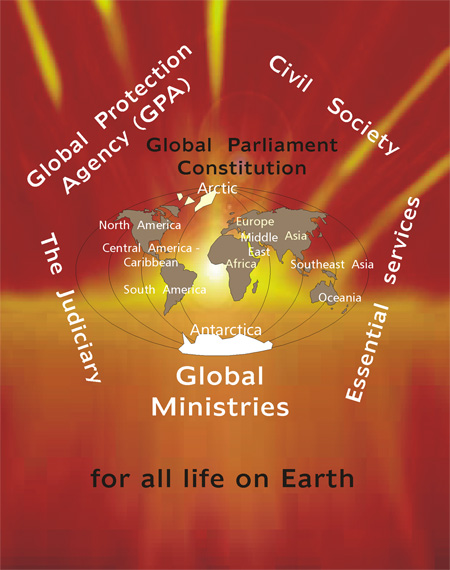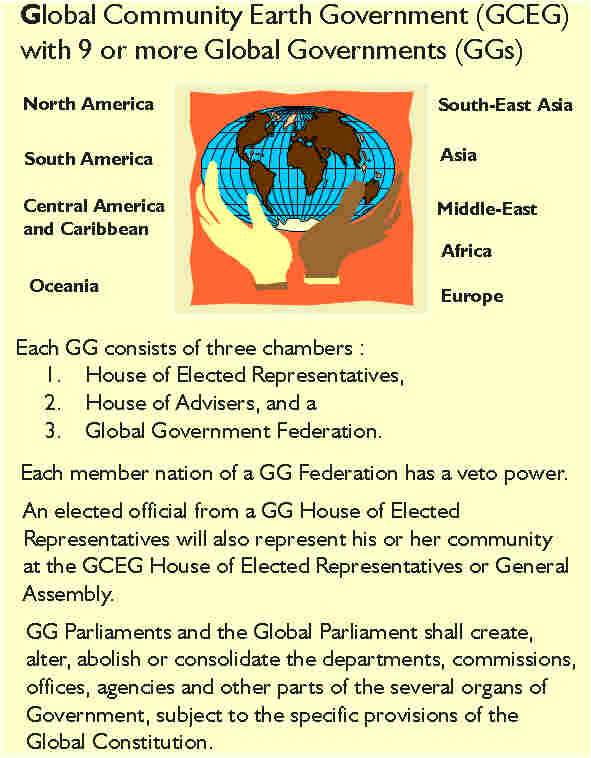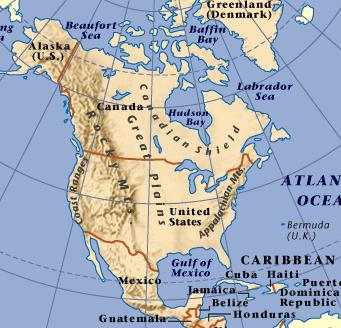
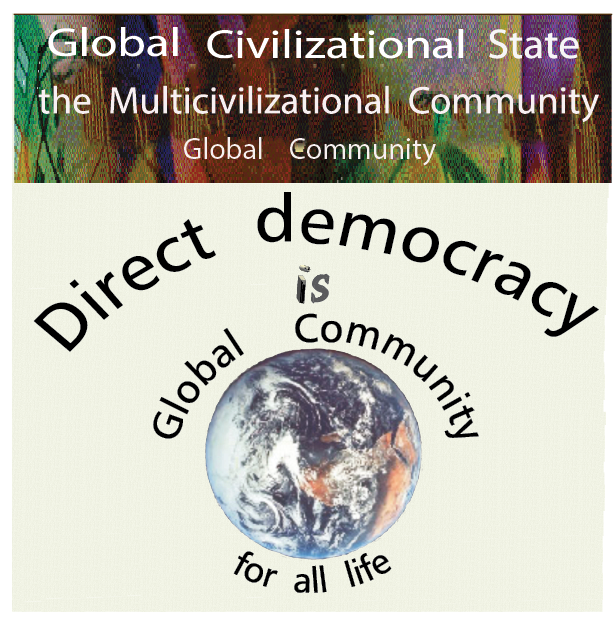
Videos promoting Global Community.
BDMV_Sept_12_2023.mp4
Sequence 01_2.3gp
TB_Sequence 01_1.mp4
Other usefull and helpful Papers to read concerning the theme of this Newsletter:
http://globalcommunitywebnet.com/Dialogue2024/Newsletters/ Nov_December2023/Israel_USA_NATO.html
http://globalcommunitywebnet.com/Dialogue2024/Newsletters/ Nov_December2023/whoownsearth.html
http://globalcommunitywebnet.com/Dialogue2024/Newsletters/ Nov_December2023/Federation_of_GGs.html
http://globalcommunitywebnet.com/Dialogue2024/Newsletters/ Nov_December2023/Parliament.html
http://globalcommunitywebnet.com/Dialogue2024/Newsletters/ Nov_December2023/gpa.html
http://globalcommunitywebnet.com/Dialogue2024/Newsletters/ Nov_December2023/GC_Direct_Democracy.html
http://globalcommunitywebnet.com/Dialogue2024/Newsletters/ Nov_December2023/index_GGNA.html
Evolution. https://globalcommunitywebnet.com/ globalcommunity/evolution.htm#DEB
Evolution, Creation and now, Guiding Souls. https://globalcommunitywebnet.com/gdufour/GuidingSouls.htm
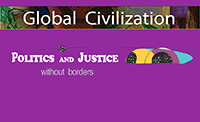


Theme for this month, Nov_December2023.
Israel and Palestine only one possible solution: Global Parliament, Direct Democracy, and the Scale of Global Rights.
by
Germain Joseph Dufour.
I am
President of Global Parliament
Global Civilizational Community
Multicivilizational Community
Global Community
and also President
of my own Canadian business and website:
Global Community WebNet Ltd.
globalcommunitywebnet.com
Take time to listen to our videos.
Many of the Videos might be too large to open for you on the Internet. Sorry!
And welcome to all of you global citizens.
Theme for this month, November 2023.
Let us lead the world toward Global Civilizational State for education, Justice, creating a new nation, and protecting Palestine and all Life on Earth, and for new ways of doing business and trade, in global development and in the management of global resources.
Table of contents.
Paper by
Germain Joseph Dufour
Israel is not a State, not a nation, not a country, not a Global Community, not a democracy and not a government. Israel is the most dangerous USA military base outside America on the planet. At the aftermath of World War II, after Joseph Vissarionovich Stalin led the Soviet Union and defeated Adolf Hitler German Army. World War II is a conflict the Soviet Union, officially named the Union of Soviet Socialist Republics(USSR), has won.After seeing that Stalin had won the war against Hitler and, being safe enough to attack the left-over German soldiers in Europe, Allied forces launched a combined naval, air and land assault on Nazi-occupied France. They called this D-Day, which described the first day of a large enough Allied military operation. Because Stalin had already defeated Hitler and won the war, Allied forces could have used "diplomacy" to deal with the left-over Germans in France. That would have saved lives and stopped more people from being killed. Diplomacy was not in Allied's blood.
A diplomatic person knows how to approach an idea or cause without unnecessarily inflaming passions or unleashing a catastrophe. That kind of person rarely reacts impulsively to an opposing opinion. Instead, a diplomat tries to reach an agreement with other people in a sensitive and respectful way. What's more, diplomacy creates an environment where states and nations can sit down and hold talks instead of waging wars over every issue. Diplomacy is the reason we have yet not witnessed the 3rd World War.
Over the time since WWII, Israel and America never had the rights to invade Palestine or to dissolve this nation. They never had the rights to do so. Only Global Parliament has the power and rights to create or dissolve a nation. Global Parliament's Constitution is very specific about those rights. The United Nations do not have the rights to create a new nation either, only Global Parliament has the right to do so. Neither the United Nations, and neither the european union countries (EU), have the rights to create or dissolve a nation. Neither of them have a Constitution that they have agreed upon after a democratic vote. Only Global Parliament has a Global Constitution.
This Global Constitution has an important Chapter which defined and explained the Scale of Global Rights. And the Scale has been voted for and approved democratically shortly after year 1985. The Scale of Global Rights places cultural rights and religious rights in the last section of the Scale, Section no 6.
"Concerning Sections 4, 5 and 6 on the Scale, it shall be the aim of Global Community to secure these other rights for all global citizens within the Federation of all nations, but without immediate guarantee of universal achievement and enforcement."These rights are defined as "Directive Principles, obligating Global Community to pursue every reasonable means for universal realization and implementation." In effect, Section 6 says that cultural rights and religious rights are of lesser importance than all the other rights in Sections 1 to 5. Section 1 being the most important rights.
The Scale effectively and essentially, say that "Israel" does not exist except in the wild imagination of the Jews or the Jewish people, who are an ethnoreligious group originating from the ancient Hebrews (i.e. Israelites), and whose traditional religion is Judaism.
The real reason why Jews want to take over the land including the Gaza Strip and all the territory of the State of Palestine is very simple: to have the Jews billionaires, the richest people in the world, to use their money to develop the land(s), the Gaza Strip, or simply Gaza, which is a Palestinian exclave on the eastern coast of the Mediterranean Sea, bordered by Egypt on the southwest and "Israel" on the east and north. Together, the Gaza Strip and the West Bank make up the State of Palestine, which has been under "Israeli" military occupation since 1967.
Those Jews billionaires will also develop Gaza not just to build more truly Jewish Homes, i.e. homes filled with ethnic and religious objects--and everyday objects imbued with special meaning. Those Jewish homes will be looking over a very beautiful Mediterranean Sea, but also and most likely, will be used as a tourism attraction and a Bonanza i.e. a very profitable place to sell war collectibles and war art items explaining how the Jews suffered fighting the Palestinian people who were living on the Palestinian territories, the two regions of the former British Mandate for Palestine that have been militarily occupied by "Israel" since the Six-Day War of 1967, namely the West Bank and the Gaza Strip. Here you can buy your art, antiques, crafts, pottery and glasses, and all kinds of everything of religious and sports memorabilia.
Those Jews billionaires, many of them living in the USA, are very powerful in electing America's government and paying for the military base in "Israel". All nuclear weapons used by "Israel" come from the United States. Also manufactured and coming from the USA is a large quantity of armaments including heavy duty weaponry and the equipment that's associated with it, like bombs, fighter jets, tanks, and assault rifles. "Israel" is really the most dangerous military base on the planet and has become a platform for the West’s fullscale invasion of the world.
Read Paper:
http://globalcommunitywebnet.com/Dialogue2024/Newsletters/
Nov_December2023/index_Israel_not_a_nation.html
http://globalcommunitywebnet.com/Dialogue2024/Newsletters/
Nov_December2023/index_Israel_not_a_nation.htmlIII. A successful Global Civilizational State for all Life would have the following distinguishing characteristics.


It is impossible within the scope of this paper to describe, compare, and evaluate all past and present civilizations, and conclude that "A successful Global Civilizational State for all Life" would have the following distinguishing characteristics. Nevertheless, let us see what can be found within the context of today civilizations, what are possible surviving solutions for life on Earth, and even attempt to promote a system of global governance consisting of a more meaningful world union in the form of nine or more Global Governments and Global Parliament.
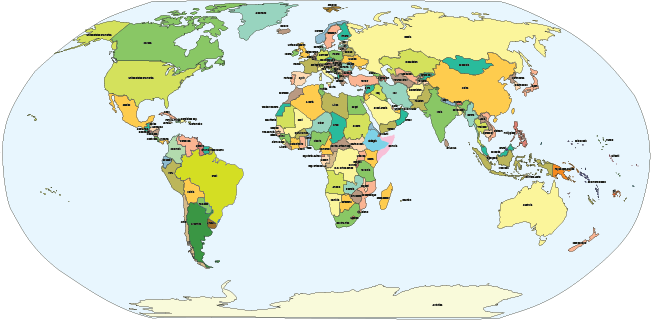
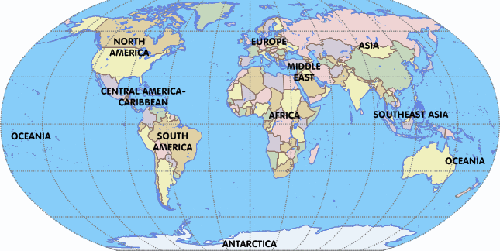
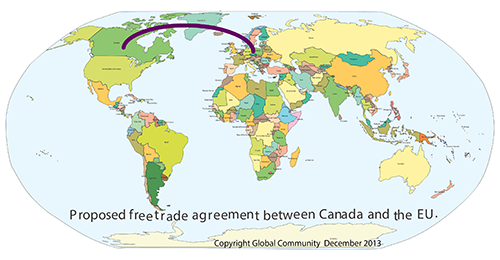

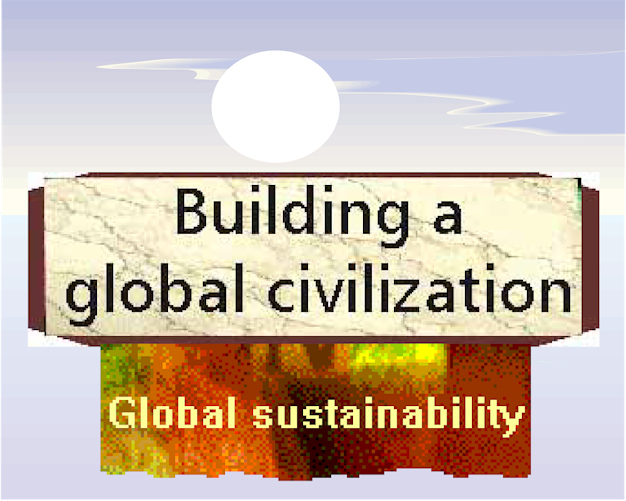
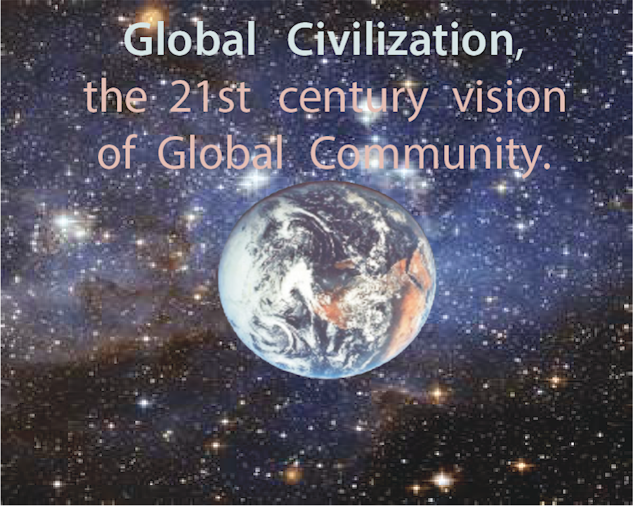
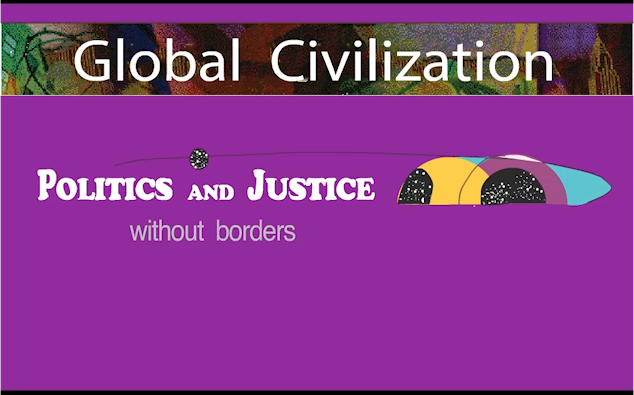
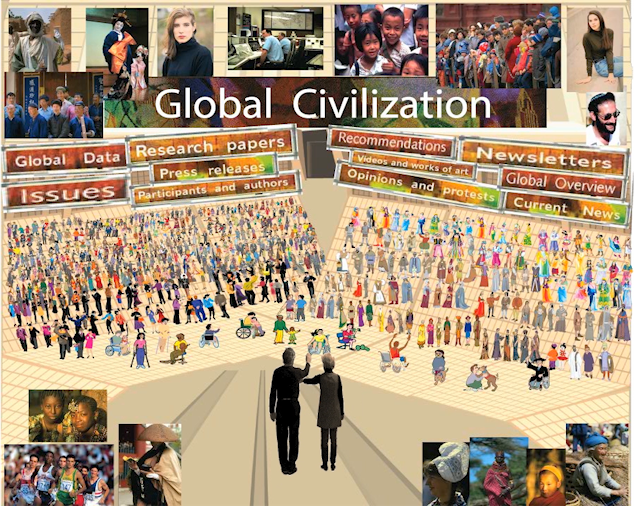
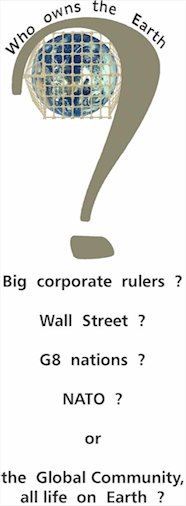
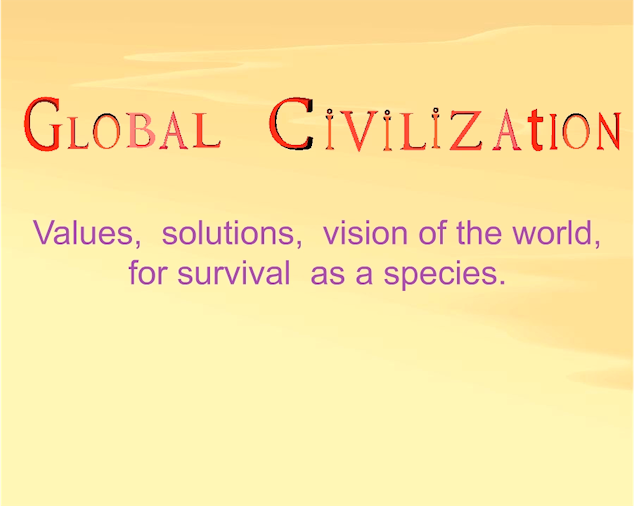
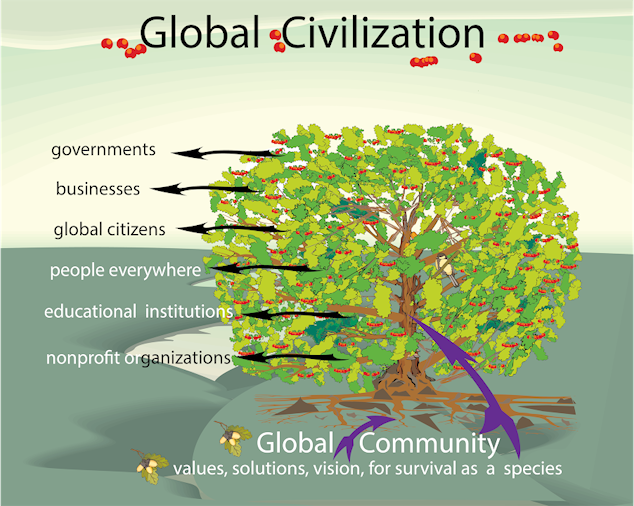
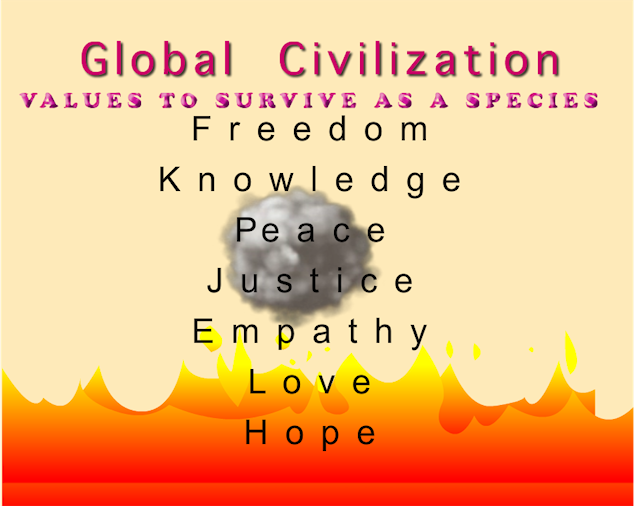
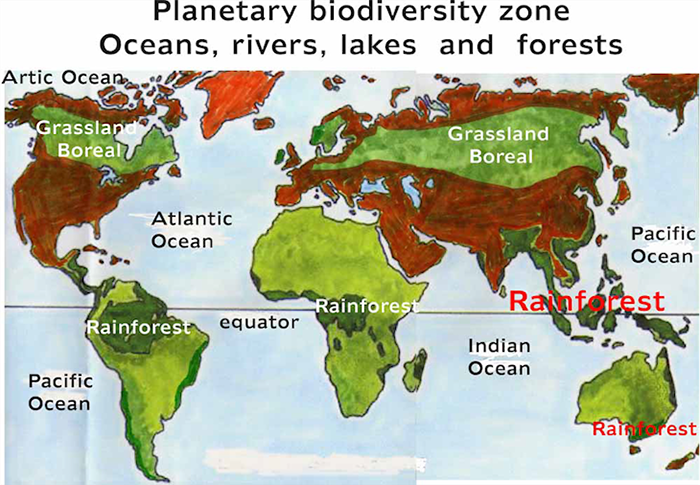
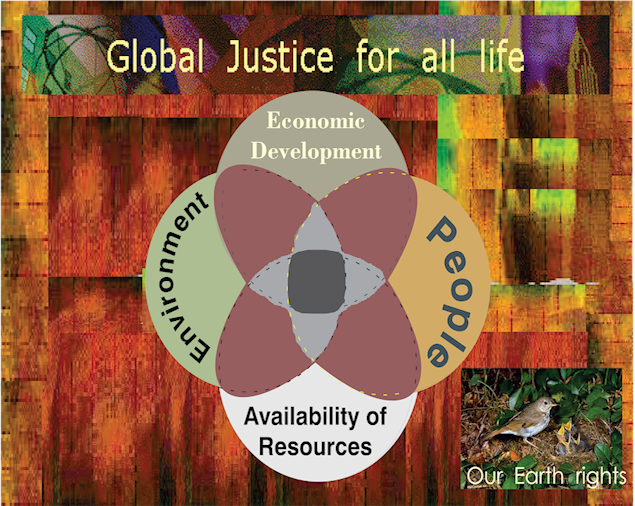

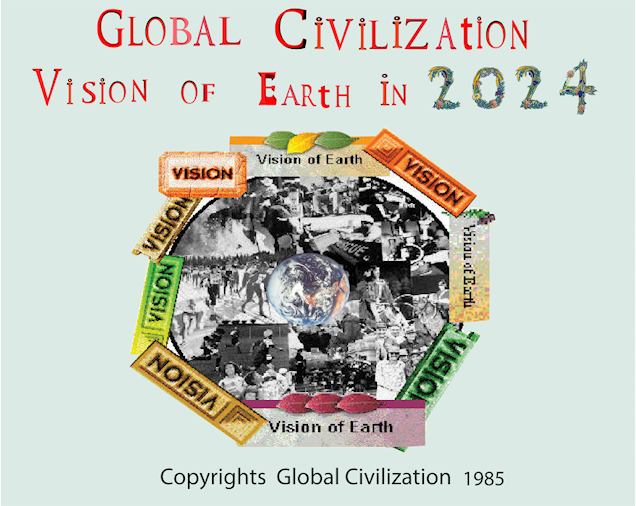
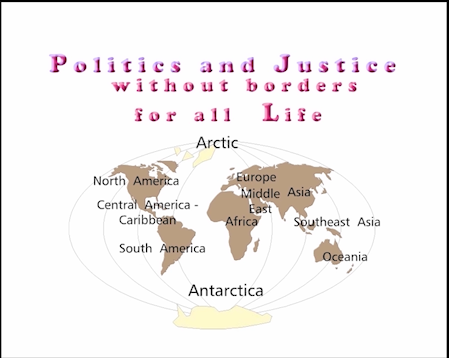

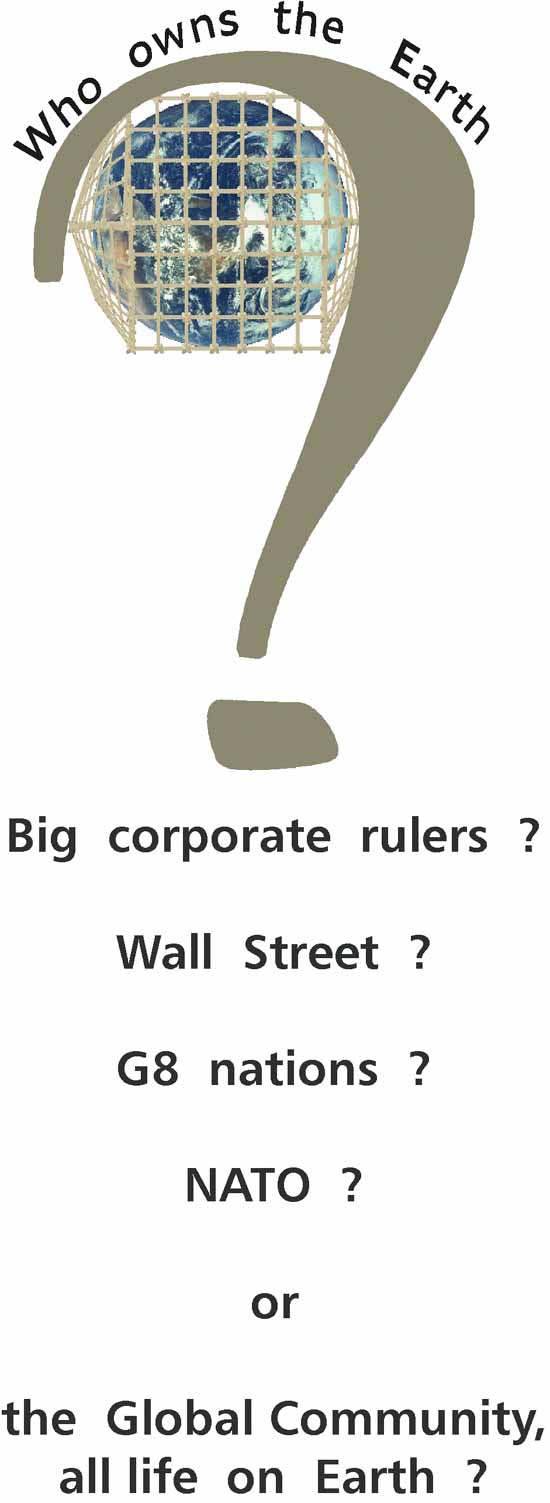
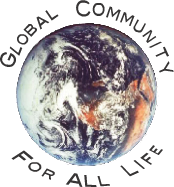

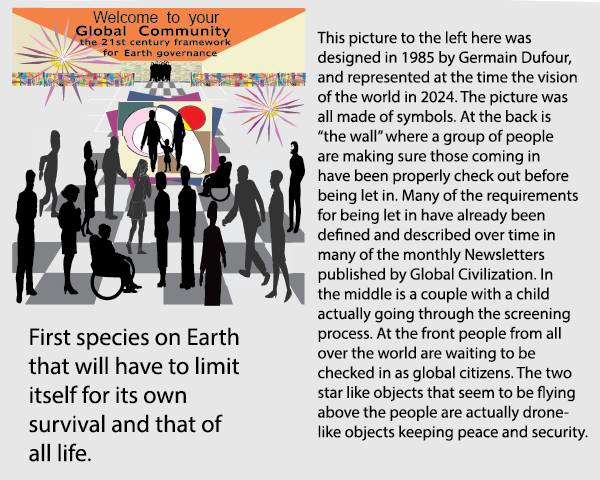
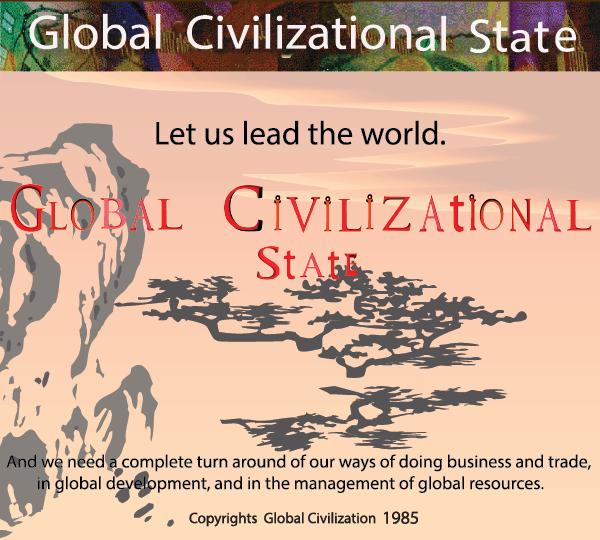

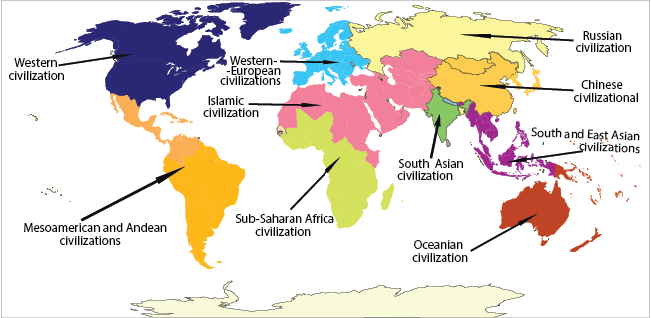
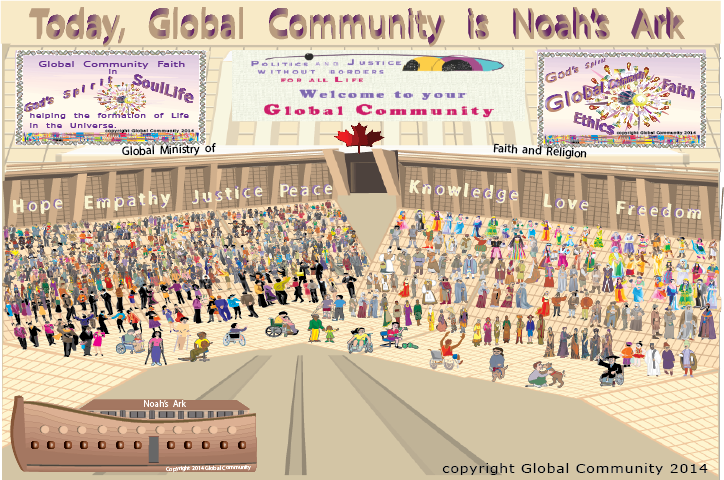
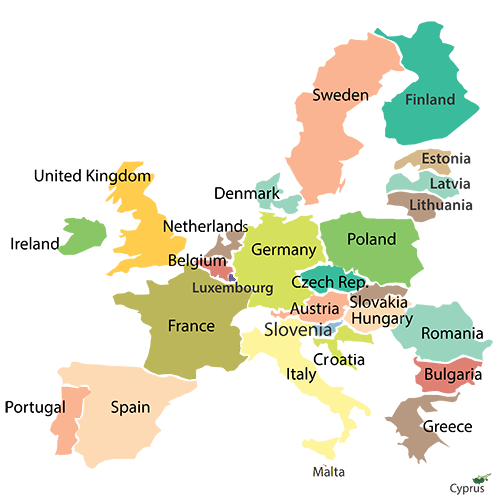
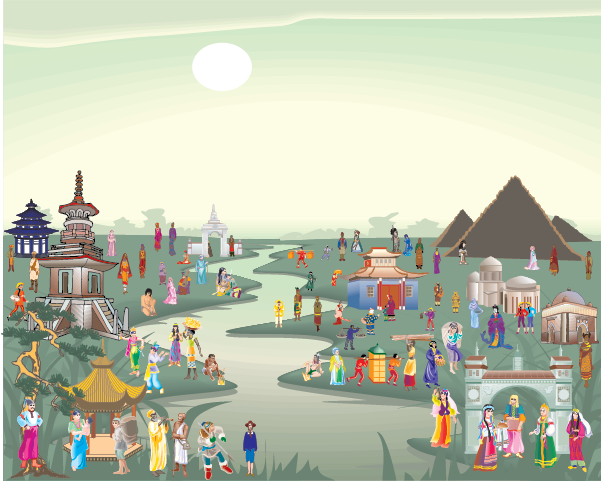
Human history stretches through generations, and is the history of civilizations. Civilization and culture both refer to the overall way of life of a people, and involve the values, beliefs, norms, institutions, social structures, and modes of thinking to which successive generations in a given society. The composition and shapes of civilizations change over time, the cultures of peoples interact and overlap. A short list of values humans have developed over time to survive as a species are shown here.
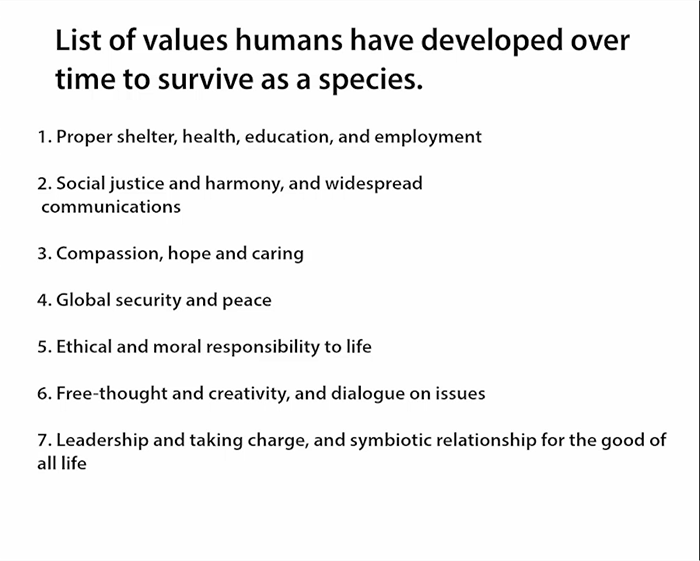
People have shared a few fundamental values and institutions throughout history, which may explain some constants in human behavior but it cannot explain history, which consists of changes in human behavior.
If the term civilization is elevated to what is common to humanity as a whole then the largest cultural groupings of people would be a single Global Civilizational State, that is a variety of cultures, of peoples, of religious worlds, of historical traditions, and of historically formed attitudes.
The development and evolution of the West are in large part the factors which enabled the West to take the lead in modernizing itself and non-Western societies. These factors were truly concepts, practices, and institutions have been more prevalent in the West than in non-Western civilizations. Over time, characteristics of Western civilization have been defined by religion and moral principles, human rights, language, ancestry, history, ethnic groups, customs and laws, and also by maintaining a meaningful independent existence, and ways of life. America is the distinct core-state civilization of the West. Inevitably, the fate of the United States within the West grouping of states depends upon Americans asserting strongly once more their commitment to Western civilization and today, their commitment to the Global Civilizational State which is seen by global citizens as the guardian, custodian and embodiment of Western civilization.
The effect of the expansion of the West has promoted both the modernization and the Westernization of non-Western societies. However modernization does not necessarily mean Westernization. Non-Western societies can modernize and have modernized without abandoning their own cultures and adopting wholesale Western values, institutions, and practices. In short, modernization has meant a great victory and achievement of Global Civilizational State on Earth.
The attitudes, values, knowledge, and culture of people in a modern society differ greatly from those in a traditional society. As the first civilization to modernize, the West leads in the acquisition of the culture of modernity. As other societies acquire similar patterns of education, work, wealth, and class structure, the argument runs, this modern Western culture will become the new culture for Global Civilizational State. Modern societies could resemble each other more than do traditional societies because the increased interaction among modern societies may not generate a common culture but it does facilitate the transfer of techniques, inventions, and practices from one society to another with a speed and to a degree that were impossible in the traditional world.
The components of order in today's more complex and heterogenous world are found within and between civilizations. The world will be ordered on the basis of civilizations or not at all. In this world the core states of civilizations are sources of order within civilizations and, through negotiations with other core states, between civilizations.
Because of modernization, global politics today is being reconfigured along cultural lines and civilizations. And of course, Global Civilizational State is finally giving its historical place as the global solution to saving humanity, and all other lifeforms on Earth, from complete extinction. Peoples and countries with similar cultures are coming together. Alignments defined by ideology and superpower relations are giving way to alignments defined by culture and civilization. A civilization may also include people who share in and identify with its culture, but who live in states dominated by members of another civilization. Civilizations usually have one or more places viewed by their members as the principal source or sources of the civilization's culture. These sources are often located within the core state or states of the civilization, that is, its most powerful and culturally central state or states.
In modern era, Western civilization, the West, is referred to the European-American civilization and America has become the land of freedom, equality, opportunity, the future, and is a distinct core-state civilization. Not so much ideologies, simply economics and politics now differentiate peoples of different civilizations. Nevertheless, cultures, ways of life, ways of doing things have been the most distinguishing characteristics. Those characteristics have been defined by religion, language, ancestry, history, communities, ethnic groups, customs, nations, and also by major levels of classification being civilizations.
In a multicivilizational world, there are core values which different ethnic and religious societies have in common. The constructive course is to renounce global culture, accept diversity, and seek commonalities. Commonalities exist between Asia and the West. Whatever the degree to which humankind is divided, the world's major religions, Western Christianity, Orthodoxy, Hinduism, Buddhism, Islam, Confucianism, Taoism, Judaism, also share key values in common. A more inclusive Global Civilizational State can emerge gradually through the exploration and expansion of these commonalities. Peace in a multicivilizational world is the finding of those commonalities and so peoples in all civilizations should search for and attempt to expand the values, institutions, and practices they have in common with peoples of other civilizations.
IV. Federation of Global Governments.

The Global Government of North America ( GGNA ) is certainly a good example of a type of Global Government. Welcome to your Global Community, the Multicivilizational Community, and Global Civilizational State, and let us all continue to strengthen Direct Democrac and world institutions in ways that would further decrease the risk of human extinction.
Earth Court of Justice (for a government model based on a democratically elected Global Government). In 2024, Global Community celebrates its 39th year since its formation in 1985. More significant and meaningful actions needed to save the Earth, all Life. Watch animation promoting participation. (41 MBs) Global Community will celebrate its 35th year in 2020. Prepare now! More significant and meaningful actions needed to save the Earth, all life. Global Civilizational State dependable and trustworthy leadership to guard over and care for all life on Earth.
A group project for you, could be a school project: send us your own short version of Global Parliament's Constitution. It has to be developed from the actual longer version approved by Global Parliament. Depending on the level of participation, we may have different categories for this special project.
Global Parliament will be reviewing all proposals.
During the Ceremonies of Global Dialogue 2010,a special Award
will be given to the group with the best short version.
Global Parliament Legislative acts
Ratification of Global Parliament's Constitution
Read the Table of Contents of Global Parliament's Constitution.
The 29 Chapters of Global Parliament Constitution
[ Preamble ] [ Chapter I ] [ Chapter II ] [ Chapter III ] [ Chapter IV ] [ Chapter V ] [ Chapter VI ] [ Chapter VII ] [ Chapter VIII ] [ Chapter IX ] [ Chapter X ] [ Chapter XI ] [ Chapter XII ] [ Chapter XIII ] [ Chapter XIV ] [ Chapter XV ] [ Chapter XVI ] [ Chapter XVII ] [ Chapter XVIII ] [ Chapter XIX ] [ Chapter XX ] [ Chapter XXI ] [ Chapter XXII ] [ Chapter XXIII ] [ Chapter XXIV ] [ Chapter XXV ] [ Chapter XXVI ] [ Chapter XXVII ] [ Chapter XXVIII ] [ Chapter XXIX ]
A) How 'Direct Democracy' works: GlobalVotingontheNet.htm
B) Development report on Direct Democracy
C) Global Community overall picture on Direct Democracy
Global Community stands for a Direct Democracy based on the fact that land, air, water, oil & gas, all minerals, space, and the electromagnetic spectrum are all natural resources, and rightly belong to Global Community as a birthright, and they are for sharing as per the Scale of Global Rights. It is about Politics and Justice without borders for all Life on Earth. And it is about our Global Community Constitution meaning.
Global Community must now direct the wealth of the world towards the building of local-to-global economic democracies (Direct Democracy) in order to meet the needs for food, shelter, universal healthcare, education, and employment for all. ![]()
Direct Democracy implies that:
Direct Democracy and global voting on issues ![]()
Global Community stands for a Direct Democracy.
![]()
Global Community, what we stand for.
![]()
Global Community, a global Direct Democracy for all Peoples.![]()
What makes Life on planet Earth habitable for all species?![]()
Humanity's new Vision of the world.![]()
Global Community is Earth for all Life.![]()
What makes Earth suitable for all life? ![]()
VI. Global law, codes and standards aspects and issues. ![]()
VII. How we can save the world from extinction, and the complete disappearance of species from Earth. ![]()
VIII. Replacing the 1948 Universal Declaration of Human Rights by the Scale of Global Rights. ![]()
Global Civilizational State: the application of the Scale of Global Rights to the most important global issues threatening humanity's survival worldwide.
![]()
![]()
![]()
![]()
![]()
![]()
![]()
XI. Global Community Direct Democracy,
the Multicivilizational Community,
and Global Civilizational State. ![]()
Global Community stands for a Direct Democracy based on the fact that land, air, water, oil & gas, all minerals, space, and the electromagnetic spectrum are natural resources, and rightly belong to Global Community as a birthright, and they are for sharing as per the Scale of Global Rights.
XII. Sustainable Global Civilization. ![]()
XIII. Global Protection Agency (GPA). ![]()
To act as a Global Protection Agency, as the GPA aspires to do, many foundations must be laid, especially regarding the move from wielding power derived from Global Parliament to legitimate global leadership. There are many required characteristics that are prerequisite for legitimate leadership.
Building global communities requires a mean to enforce global law that protects all life on Earth.
GCEG Global Protection Agency will train and lead a global force, bypassing traditional peacekeeping and military bodies such as the United Nations and NATO. This is a great opportunity for globallateralism.
Global Protection Agency (GPA) is leading a group of people in the world who participate in:
a) peacekeeping or peacemaking mission;
b) creating global ministries for: ![]()
1. the policy response to the consequences of the global warming, and
2. the development of strategies to adapt to the consequences of the unavoidable climate change.

d) saving the Earth's genetic heritage;
e) keeping the world healthy and at peace;
f) protecting the global life-support systems and the eco-systems of the planet;
g) dealing with the impacts of: global poverty, lack of drinking water and food, global warming and the global climate change, threat to security, conflicts and wars, lack of good quality soil for agriculture, polluted air, water and land, overcrownded cities, more new and old diseases out of control, widespread drugs, human and Earth rights abuses, world overpopulation, and lack of resources;
h) broadening the traditional focus of the security of states to include both the security of people as well as that of the planet. Global security policies include:
* every person on Earth has a right to a secure existence, and all states have an obligation to protect those rights
* prevention of conflicts and wars; identification, anticipation, and resolving conflicts before they become armed confrontations. The Earth Court of Justice will help here.
* military force is not a legitimate political instrument
* weapons of mass destruction are not legitimate instruments of national defence
* eliminate all weapons of mass destruction from all nations and have inspectors verifying progress to that effect
* all nations should sign and ratify the conventions to eliminate nuclear, chemical and biological weapons
* the production and trade in arms should be listed as a criminal act against humanity; this global ministry will introduce a Convention on the curtailment of the arms trade, a provision for a mandatory Arms Register and the prohibition of the financing or subsidy of arms exports by governments
* the development of military capabilities is a potential threat to the security of people and all life on Earth; the ministry will make the demilitarization of global politics a high priority.
* anticipating and managing crises before they escalate into armed conflicts and wars
* maintaining the integrity of the environment and global life-support systems
* managing the environmental, economic, social, political and military conditions that threatened the security of people and all life on the planet.
Global Community, Global Parliament, Federation of Global Governments,
Global Civilizational State
![]()
![]() .
.
Return to Global Dialogue 2024
Return to Global Community activities.
Videos promoting the subject matter, and global issues of November-December Newsletter, along with the values, principles, and history of Global Community.
Summary of 101 links with pictures and expository texts.![]()
Note: Each video takes several MBs.
Sequence 01_1.3gp
Sequence 01_2.3gp
Sequence 01.3gp
Sequence 01_Sept_17_A.mpeg
BDMV_video_1_1_720_B.mov
BDMV_video_1_1_720.mov
Sequence 01_4.3gp
BDMV_video_1_1_720.mov
BDMV_video_1_1.mov
BDMV_video_1_2.mov
BDMV_video_1_3_720.mov
BDMV_video_1.mov
BDMV_Sept_12_2023.mp4
Global Community diplomatic affairs.
https://globalcommunitywebnet.com/
Dialogue2024/Newsletters/
Nov_December2023/Diplomacy.html
Global Community conduct affairs in ways to promote political, economic, cultural and scientific relations between all member countries while maintaining peaceful relationships. We help others listen to all sides of a situation and work together to find a solution that is beneficial for everyone. Core principles of our diplomatic work are based on negotiation, communication, building relationships, and promoting interests between all Peoples. And it is a commitment to justice, truth in dealing, and realism tempered by a commitment to pluralism. It is honesty that brings long-term benefits and permanent gains. Those principles serve as the foundation for our effective diplomatic interactions, facilitating peaceful resolution of conflicts and promoting international cooperation.
Earth governance
We define Earth governance as the traditions and institutions by which authority in a country is exercised for the common good. This includes:
(i) the process by which those in authority are selected, monitored and replaced,
(ii) the capacity of the government to effectively manage its resources and implement sound policies with respect to the Scale of Global Rights Rights and the belief, values, principles and aspirations of Global Parliament.
(iii) the respect of citizens and the state for the institutions that govern economic, environment, Earth resources, and social interactions among them,
(iv) the freedom of citizens to find new ways for the common good, and
(v) the acceptance of responsibility and accountability for our ways.
The quality of Earth governance is reflected in each local community worldwide. Global Parliament will show leadership by creating a global civil ethic within the Global Community . The Charter of the Global Community describes all values needed for good global governance: mutual respect, tolerance, respect for life, justice for all everywhere, integrity, and caring. The Scale of Global Rights Rights has become an inner truth and the benchmark of the millennium in how everyone sees all values. The Scale encompasses the right of all people to:
* the preservation of ethnicity
* equitable treatment, including gender equity
* security
* protection against corruption and the military
* earn a fair living, have shelter and provide for their own welfare and that of their family
* peace and stability
* universal value systems
* participation in governance at all levels
* access the Earth Court of Justice for redress of gross injustices
* equal access to information
Global Parliament Global Constitution is itself a statement for the fundamental rights of all citizens, ensuring the rights of minorities, one vote per million people from each state government. When member nations vote during any meeting they are given the right of one vote per million people in their individual country. That is the most fundamental community right, the right of the greatest number of people, 50% plus one, and that is the 'new democracy' of Global Parliament.
Governance of the Earth will make the rule of arbitrary power--economic (WTO, FTAA, EU), political, or military (NATO)-- subjected to the rule of law within global society, the human family. Justice is for everyone and is everywhere, a universal constant.
Global Parliament has no intention of changing the status and privileges of state governments. In fact, state governments become primary members of the Global Parliament . Global governance can only be effective within the framework of a world government or world federalism. There is no such thing as global governance through the work of a few international organizations such as the WTO, the EU, or the United Nations dictating to the rest of the world. These organizations are heading in the wrong direction and are causing conflicts between nations, doing away with democracy, increasing the gap between rich and poor, and creating a culture of violence worldwide, terrorism being a small example of what they can do.
Global Parliament allows people to take control of their own lives. The Global Community was built from a grassroots process with a vision for humanity that is challenging every person on Earth as well as nation governments. Global Community has a vision of the people working together building a new civilization including a healthy and rewarding future for the next generations. Global cooperation brings people together for a common future for the good of all.
Earth governance does not imply a lost of state sovereignty and territorial integrity. A nation government exists within the framework of an effective Global Parliament protecting common global values and humanity heritage. Earth governance gives a new meaning to the notions of territoriality, and non-intervention in a state way of life, and it is about protecting the cultural heritage of a state. Diversity of cultural and ethnic groups is an important aspect of Earth governance.
Earth governance is a balance between the rights of states with rights of people, and the interests of nations with the interests of the Global Community , the human family, the global civil society.
Earth governance is about the rights of states to self-determination in the global context of the Global Community rather than the traditional context of a world of separate states.
Although the Global Parliament ensures state governments that it will obey the principle of non-intervention in domestic affairs, it will also stand for the rights and interests of the people within individual states in which the security of people is extensively endangered. A global consensus to that effect will be agreed upon by all nation states.
Effective Earth governance requires a greater understanding of what it means to live in a more crowded, interdependent humanity with finite resources and more pollution threatening the global life-support systems. The Global Community has no other choice but to work together at all levels. The collective power is needed to create a better world.
Global Parliament
Global Community needs a global democratic leadership based on the Global Parliament and able to take responsibility and leadership, a stronger world order, more efficient and more democratic.
Today, 65 % of the world population lives in democracies than dictatorships. This trend is increasing as more people want to live in peace. Because of a rapid transition to democracy, several of these democracies have not had time to develop strong democratic institutions and cultural changes. Many changes occur during a transition: written constitutions, legal reforms, multiparty elections, a free press, and an independent judiciary. but all changes take time to grow in people's new way of life.
Global Community has long been waiting for a truly global governing body based on universal values, human rights, global concepts and democracy. Global Parliament might as well be created now, there is no longer any reason to wait. We are the Global Community and we will form Global Parliament . Earth management is a priority and is a duty by every responsible person.
Global Parliament will now be formed, and we want you to reflect on future effects of such an event on the history of humanity. Certainly one will expect extraordinary changes: a reorganizing of human activities all over the planet; participation by all societies on the planet in solving local and global problems; new alliances forming; north meeting with south (eradication of poverty will be the price to pay to get votes from the south) in order to gather more votes within the newly created Global Parliament to satisfy power struggles between European, Asian and Western countries; adoption of democratic principles, human rights, global concepts, and universal values by every human being; expansion of consciousness; gathering and coordinating of forces to resolve social and political problems in a peaceful way (no more conflicts or wars); gathering and coordinating of forces (technologies, scientific research, exploration work, human resources, etc.) to resolve global problems such as global climate, environment, availability of resources, poverty, employment, etc. Thousands more changes!
Let your heart and mind reflect on 'the good' of a democratically elected Global Parliament . Everyone is part of Global Community by birth and therefore everyone has a right to vote. Everyone should be given a chance to vote. If you live in a developing country this time you will have a vote, human rights like all of us, you will be part of Global Community , and we will stand by you. Decisions will be made democratically. You will finally have a voice and a friend, many friends, within Global Parliament and Global Community . Your lives have values just like all of ours.
An improved democracy, the "Direct Democracy", for the Global Civilizational State,
Global Parliament,
Global Civilizational Community,
Multicivilizational Community,
Global Community.

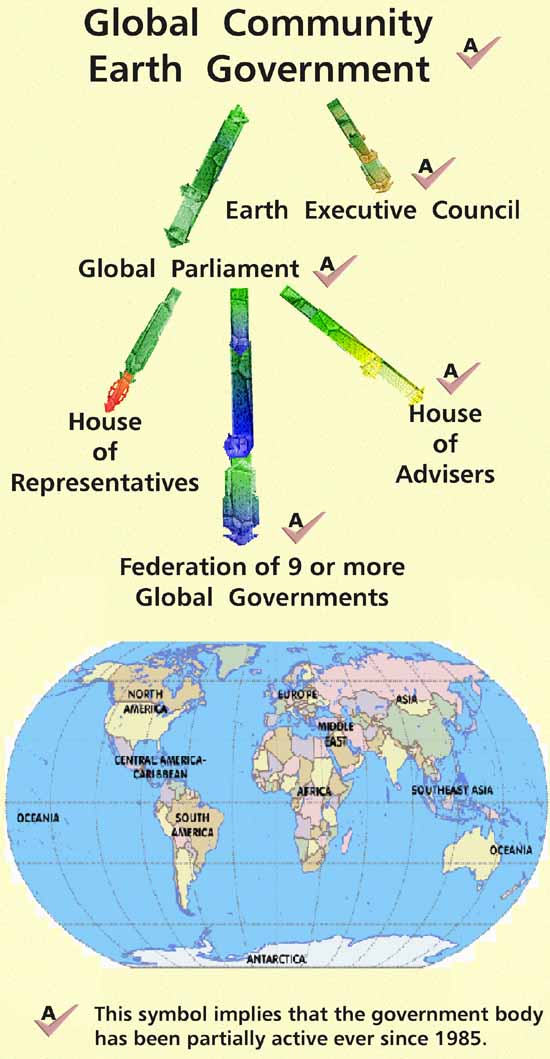
Global Parliament with its governing institutions and bodies
Worldwide, there are as many as 120 nations with electoral democracies. Several nations are struggling to have political rights and civil liberties. Most of Africa and Middle and Far East nations are without electoral democracies. Is democratization a global long-term trend? Is democracy as we know it today a good thing? Will it pass the test of the global problems humanity is facing today? How successful is democracy in a country such as India? the United States? Britain? What indicators could measure success or failure? What improvements could make democracy a better political system?
Each and everyone of us on Earth was born free and equal in dignity and rights. Respect for human and Earth rights and fundamental freedoms is one of the characteristics of a democracy. The typical fundamental freedoms of a democracy (freedom of expression, thought, assembly, and association) are themselves part of human and Earth rights. These freedoms can exist everywhere. Democracy is a political system based on the participation of the people, global cooperation. It foresees the separation of powers among the judiciary, the legislative and the executive authorities, as well as free and regular elections.
To be successful, a newly formed democracy requires a long-term economic stability, multiparty elections, a written constitution, a free press, a legal reform with an independent judiciary and good pro-democratic leadership. We have seen Britain and the United States helping other nations become democracies. Help was in the form of military action. How successful was forcing democracy into a people using the military? After World War I, following the destruction of the Ottoman Empire, the European powers created states and appointed officials to administer newly created democracies in and around the Middle East.
A lot of what was created had no legitimacy for the people of the Moslem Civilization and Western domination brings much of the same kind of hegemony in the region as with the British. Since World War II, America along with junior partners, Great Britain, France and Russia, have refashioned the Middle East in their own image, building a new political and territorial order on the ruins of the Ottoman Empire.
Despite the efforts of secular and religious local forces who rejected the West's intrusion, America and the junior partners formed states, chose people to govern them, and drawn frontiers between them. But this new order never worked because to Arab nationalists it meant betrayal of wartime promises made by the Allies, military occupation, and the exploitation of resources and of the Moslem people. The Jewish National Home in Palestine further fueled hostility toward the West.
The post war order imposed by Great Britain and the Allies created instabilities and disorder (the Ottoman Empire was stable and had order) throughout the Moslem world. On November 29, 1947, the United Nations passed a resolution partitioning Palestine into two independent states, one Jewish and one Arab. The Jewish accepted the resolution and called their land Israel, but the Moslem states rejected it and sent their armies to regain the land but lost the war against Israel.
Israel and Palestine only one possible solution: Global Parliament and the Scale of Global Rights.
The Palestinians lost their land and have been without a homeland ever since. They became refugees on their own land. Israel's occupation of Moslem land and refusal to recognize the national rights of the Palestinians were the fundamental problems.
The State of Israel made its entrance into history in a war against the Moslems. Throughout this period America was a major support in lobbying the UN partition plan and in the birth of the State of Israel. Was the creation of Israel, a new democracy based on the military occupation, a success for democratic systems? Is it right for us to create a new democracy using the military? Israel has been at war ever since its creation as a democracy. Is that truly a democracy or is it a military invasion of the Middle East by the United States?
How successful were these newly created democracies? What have we truly accomplished? Were the people involved in creating the new democracies or was it because Britain and the United States military forcing new values into the people ways of life, changing their cultural heritage and religion?
Global Community is proposing that:
a) different nations may require different political systems at different times
b) a democratic system is not a "must have it" to be a responsible member nation of the Global Parliament
c) all democracies are to be upgraded, or improved upon, to be a responsible member nation of the Global Parliament . The Scale of Global Rights Rights and the Charter of the Global Community are the newly added requirements to all democratic systems of the world.
What is the most important is not so much being a citizen within a democratic system, but it is first and foremost more important to be in line with the Scale of Global Rights.
Scale of Global Rights
* Ecological rights and the protection of the global life-support systems
* Primordial human rights
* The ecological rights, the protection of the global life-support systems and the primordial human rights of future generations
* Community rights and the right that the greatest number of people has by virtue of its number (50% plus one) and after voting representatives democratically
* Economic rights (business and consumer rights, and their responsibilities and accountabilities) and social rights (civil and political rights)
* Cultural rights and religious rights
Fourth on the Scale, a community may choose to use any type of political systems of its liking, a democracy or otherwise. That is a community right, the right that the greatest number of people has by virtue of its number (50% plus one) and after voting representatives democratically.
All political systems will be improved by increasing education, transparency, accountability, media access, respect for human and Earth rights, tolerance of political opposition, free elections, participation and independent civil society.
Global Community Overall Picture.
North America
The United States has served as a model of democracy to many nations but now they have lost credibility on several grounds:
* by not ratifying the Kyoto Protocol, they have shown a total disregard to the protection of life on Earth. What good is democracy when the existence of life on Earth is being threatened by CO2 pollution? All democratic systems are required to be responsible and accountable to humanity. The Scale of Global Rights Rights places life on top of the Scale and is the most important right to be protected.
* systematically planning and invading other nations either through their military or through their corporations and institutions, and for the purpose of controlling or taken over a nation's resources for profit and self-interests.
* american elections are becoming more corrupted by money and special interest lobbying, advertising and campaign contributions
Countries in Latin America & the Caribbean
Less than 50% of citizens vote. Democracy does not have a solid ground for growth. Free-market democracies in the region must include social justice and equity as a way of life. Unless America includes the Scale of Global Rights Rights and the Charter of the Global Community to govern the newly proposed Free Trade Area of the Americas(FTAA), than we will see a collapse of democracy in the region, civil wars and the rise of dictatorships.
Africa
There are only 20 of the 53 African nations with electoral democracies. Authoritarian regimes in the region have been successful because of strong ethnic groups and religious fundamentalism. Dictators might yield their power if they had secure retirement. May be an 'African Council of Elders' composed of former heads of state could be created to advise Africa.
Europe
Democracy implies not just the mechanics of free and fair elections but the ability of different political parties to choose and, if elected, to implement their freely chosen manifestos. On the face of it, this may appear to be the case. But we need to probe a little deeper.
In Britain, there were protests in Genoa, Gothenburg, Davos and at almost every other major summit meeting since Seattle in December 1999. And this disaffection is just the festering tip of a very large iceberg. For underlying these high-profile protests lies a widespread and deepening public disengagement from party politics as evidenced by ever-lower voter turnouts in elections around the world.
This is something Tony Blair should know well, having himself been re-elected by only 42% of the vote with a turn-out of just 58%; the lowest since 1929. That means only 25% of those eligible voted for him. So why all the disaffection when the mechanics of democracy seem to be in good working order? European democratization will require the expansion of the EU to the East and South. Unless genuine democracies are created, the former authoritarian regimes of Central and Eastern Europe may come back.
Asia & Oceania
There are 24 of the region's 39 nations with electoral democracies. Japanese appear indifferent to democratic issues in other nations because democracy was forced into them. Much of Asia supports autocratic governments. China provides stability to its 1.3 billion people.
Reform the United Nations or let us create Global Parliament.
Over the past several years we have asked the United Nations to reform its organization or else let Global Community , the human family, the global civil society, will create Global Parliament.
If the UN are not up to the task of providing global services as is required now than quit it, give it up. We know better! Global Community has made very clear to the United Nations that it needed reforming, and that Global Parliament was an organization for the Peoples making decisions for the good of all as opposed to having politicians from all of over the world being coerced by the United States and making all kinds of decisions based on a culture of violence and propoganda from the West. Earth has no need for your culture of violence and military and economical dictatorship.
Most of the time politicians have no competence in all aspects of effective global governance. Global ministries have to be formed to reflect competence, knowledge and proper decision making. In this way, Global Parliament will reflect the capacity of the global civil society to contribute to global governance.
We have also made clear to the UN that special privileges such as the veto right of the Five Permanent Members were ridiculous fallacies and had to be annulled immediately. Permanent members must come forward and agree to forgo their veto right or the General Assembly must vote for the change be done.
Global Community is proposing that the General Assembly will:
* have one vote per million people from each nation
* vote to abolish the special privileges of the Five Permanent Members
* vote to abolish the status of the Five Permanent Members
* reorganize the structure and election process of the Security Council as previously shown by Global Community
* create global ministries as shown here
* make global governance a reality now, more effective to govern Earth, and for the Peoples and the good of all (and not for the good of a few privileged wealthy persons or corporations)
* stop the culture of violence that it has been promoting ever since its creation
* entrench the Scale of Global Rights Rights and the Charter of the Global Community into its constitution and way of doing things
* create a process to regularly review the constitution and the organizational structure of the UN
* make sure that the Security Council membership reflects the will of the world population with voting rights also reflecting the world population (Global Community has already proposed a more effective organizational system to the UN)
* allow the global civil society, the human family, Global Community , be an integral part of the General Assembly and Security Council with voting rights in both areas
* allow the creation of an Adviser on Women's Issues also be a part of both the General Assembly and Security Council with voting rights in both areas, and in all global ministries and special agencies as well * make global co-operation a major aspect of a balanced system of global governance
* promote the formation of symbiotical relationships for the good of all as opposed to economic partnerships to profit the few wealthy persons or corporations
* create the Earth Court of Justice with goals and structure as defined by Global Community
* establish a process by which the Earth Court of Justice would evaluate and decide on applications for a community becoming a new nation
* establish a process by which conflicts between nations be resolved by the Earth Court of Justice and not by propaganda by the United States to do their five wishes in the world
* Justice is for all and the Unites States military as well; how can you not object to the United States military people or any people in America being taken to the Earth Court of Justice for crimes committed against human and Earth rights as described by the Scale of Global Rights Rights
* ensure that the Security Council enforces the Earth Court of Justice decisions
* establish a global governance that considers the need of people for each other and of doing good to one another, that is, promote symbiotical relationships for the good of each other and the good of all. The Charter of the Global Community and the Scale of Global Rights Rights have established these fundamental human needs, priorities and values.
Global Community has long been waiting for a truly global governing body based on universal values, human and Earth rights, global concepts and democracy.
Global Parliament might as well be created now, there is no longer any reason to wait. We are the Global Community and we will form the Global Parliament.
Earth management is a priority and is a duty by every responsible person. A democratically elected Global Parliament will now be formed, and we want you to reflect on future effects of such an event on the history of humanity. Certainly one will expect extraordinary changes:
* a reorganizing of human activities all over the planet; participation by all societies on the planet in solving local and global problems;
* new alliances forming; north meeting with south (eradication of poverty will be the price to pay to get votes from the south) in order to gather more votes within the newly created Global Parliament to satisfy power struggles between European, Asian and Western countries;
* adoption of democratic principles, human rights, global concepts, and universal values by every human being; expansion of consciousness;
* gathering and coordinating of forces to resolve social and political problems in a peaceful way (no more conflicts or wars);
* gathering and coordinating of forces (technologies, scientific research, exploration work, human resources, etc.) to resolve global problems such as global climate, environment, availability of resources, poverty, employment, etc.
Thousands more changes! Let your heart and mind reflect on 'the good' of a democratically elected Global Parliament. Everyone is part of Global Community by birth and therefore everyone has a right to vote. Everyone should be given a chance to vote.
If you live in a developing country this time you will have a vote, human rights like all of us, you will be part of Global Community, and we will stand by you. Decisions will be made democratically. You will finally have a voice and a friend, many friends, within Global Parliament and Global Community . Your lives have values just like all of ours.
Between now and August 2004 we will have expanded the Interim Global Parliament for Global Community . The Interim Global Parliament for Global Community will govern for as long as necessary to create the democratic structure of the government and put in place the voting system that it requires. Officers and Ministers of Global Parliament will be required to work as a team. Those interested to become officers or ministers please submit your CV, three references, and a five pages essay on why you want to become an officer or a minister. There is an urgent need to fill the several positions for each global ministry.
There is a need to develop a voting system to elect representatives to form a democratically elected Global Parliament. Every person in the world can claim the birth right of electing a democratic government to manage Earth: the rights to vote and elect representatives to form the Global Parliament. They are our human rights! Each and everyone of us on Earth was born free and equal in dignity and rights.
Respect for human rights and fundamental freedoms is one of the characteristics of a democracy. The typical fundamental freedoms of a democracy (freedom of expression, thought, assembly, and association) are themselves part of human rights. These freedoms can exist everywhere. Democracy is a political system based on the participation of the people. It foresees the separation of powers among the judiciary, the legislative and the executive authorities, as well as free and regular elections.
Global cooperation: Global Ministries of Global Parliament.
In today's Global Community it is important for our survival to cooperate globally on several aspects such as peace, security, pollution in the air, water and land, drug trade, shelving the war industry, keeping the world healthy, enforcing global justice for all, eradicating poverty worldwide, replacing the Universal Declaration of Human Rights by the Scale of Global Rights and entrenching the Charter of the Global Community and the Global Constitution of Global Parliament as a way of life for the good of all.
The Interim Global Parliament is continuously updating and improving the implementation of global ministries throughout the world. The short description of the work done so far appears here and on our website. A detailed, more complex one is on CD-ROM showing each global ministry with detailed views, actions to address the challenge and indicators to measure progress on the challenge.
You are invited to send your comments on the text of each of the global ministries. This is one of ECO research projects, and we are all involved in the making of the Global Parliament .
Global symbiotical relationships between nations.
Global Community is inviting you to participate in the formation of global symbiotical relationships between communities, nations, businesses, or a combination of them. This can be accomplished through the formation of global ministries. We are also proposing the formation of a political symbiotical relationship between state and the global civil society. A similar relationship already exists between Global Parliament and every member of the Global Community, Global Citizens, also known as the human family, the global civil society or the Global Community of nations.
Any symbiotical relationship is for the good of all, for the good of the 'other'. It is based on a genuine group concern and unconditional support for the individual's well-being ~ a giant leap in human behaviour. The question is how can we improve the political symbiotical relationship to fulfill its goals?
The Global Constitution promotes the values to achieve its goals. These goals require the promoting and establishment of: global community ethics, mutual respect, respect for life, basic liberties, justice and equity, caring for the 'other', integrity, responsibility and accountability.
Other symbiotical relationships may be based on common concerns and issues such as: the environment, peace, women's rights, human and Earth rights, and many more. There is a whole spectrum of possible symbiotical relationships.
Global 2000 and Global Dialogue 2002 were the first world conferences on sustainable development and Earth management that brought forward sound solutions to humanity's problems. Symbiotical relationships are needed today and for the long term future of humanity.
A global symbiotical relationship between nations is more than just a partnership, or an economical agreement such as the WTO. The WTO is about a trade partnership between nations. On the other hand, a global symbiotical relationship between two or more nations can have trade as the major aspect of the relationship or it can have as many other aspects as agreed by the nations involved.
The fundamental criteria is that a relationship is created for the good of all nations participating in the relationship and for the good of humanity, all life on Earth. The relationship allows a global equitable and peaceful development.
The emphasis of a global symbiotical relationship is not so much on how much money a nation should have or how high a GDP should be although money can be made a part of the relationship.
We all know developed countries live off developing countries so the emphasis has no need to stress out the profit a rich nation is making off a poor nation. The emphasis of the relationship should give more importance to the other aspects such as quality of life, protection of the environment and of the global life-support systems, the entrenchment of the Scale of Global Rights and the Global Constitution into our ways of life, justice, peace, spiritual freedom, security, and many other important aspects as described in the global ministries (agriculture, energy, trade, resources, etc.).
Global strategy to reinforce primordial human rights.
Primordial human rights are those human rights that individuals have by virtue of their very existence as human beings: to live, safety and security, eat, drink fresh water, breath clean air, and have shelter. These rights are separate categories than ecological rights, community rights, the right of the greatest number of people, economic rights, social rights, cultural rights and religious rights.
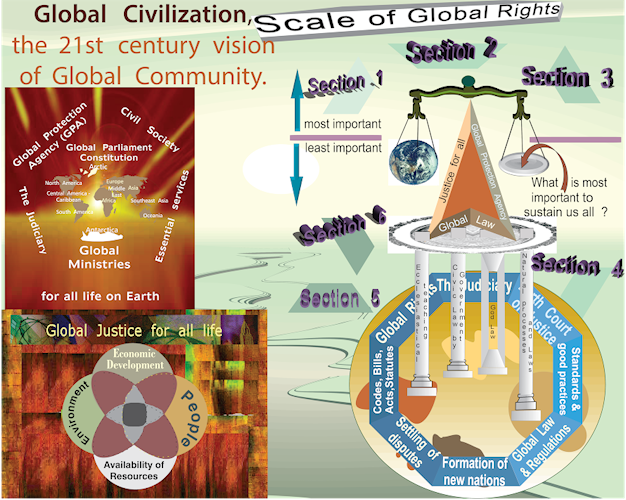
On the Scale of Global Rights, ecological and primordial human rights are the only rights that have existed unchanged throughout the evolutionary origin of our species. Any major change would have threatened our very existence. All other human rights listed here are rights created by human beings and can be changed depending of new circumstances; they are not stagnant but are rather flexible and adaptive, and they can evolve. Ecological and primordial human rights of this generation and of future generations are therefore much more important than any other human rights existing now and in the future.
Global Community has developed a global strategy to reinforce primordial human rights.
Recommendations to that effect are:
* provision of minimal standards of health, education, and housing worldwide
* reduce inequality in access to work opportunities
* care for the quality of life of the people
* all nations must ratify an agreement to form the Earth Court of Justice
* increase global cooperation between nations to deal with terrorism in a more selective, targeted way
* help Global Community promote and implement its global civic ethic program worldwide
* allow our volunteers perform their global ethical management tasks during conflict resolution
* emphasise social responsibility of corporations in the whole cycle of their products or services
* expand coordination and global cooperation among nations, agencies, and NGOs, regarding information, early warning, apprehension, and punishment of terrorists through the Earth Court of Justice. The Court will create an environment for transparent Justice.
* when there is massive damage done to a country that is abhorent to most countries of the world then the Earth Court of Justice will find it justified to go after the suspected criminals wherever they may be hiding
The right of the freedom of expression of the media industry (the arts and communications worlds) versus the right of the security of a person and of the state
The right of the freedom of expression of the media industry (the art world) versus the right of the security of a person and of the state was explained in the global ministry of Global Security. Please read that section carefully.
We have reproduced here a short explanation with the conclusion.
Another major source of global unsecurity for people is the culture of violence in everyday life as it is shown on television screens and cinemas. The American Way of Life is creating this culture of violence. An american child at age six year old has seen more violence on television than any other child of the Middle East over a life span.
This culture of violence infects both industrial and developing countries, rich and poor. This trend of culture of violence must end. The movie and TV industry is a threat to global security. The media is responsible for the propagation of violence through communications.
Why has government not done anyhting to regulate the media industry? Surely everyone understood that on the Scale of Global Rights Rights security of the people of any nation is more important than the human rights related to the freedom of expression of the media industry.
Security of the people and the state is on top of the Scale. It is part of the primordial human rights. While freedom of expression is a right found lower on the Scale and is classified partly as
* Community rights and the right that the greatest number of people has by virtue of its number (50% plus one) and after voting representatives democratically (these rights can be and are usually a part of the constitution of a country) and partly as
* Economic rights (business and consumer rights, and their responsibilities and accountabilities) and social rights (civil and political rights)
So the freedom of expression of a person is not as important as the security of that person and the security of the state.
![]() ]
]![]() ]
]![]() ]
]![]() ]
]![]() ]
]![]() ]
]
![]() ]
]![]() ]
]![]() ]
]![]() ]
]![]() ]
]![]() ]
]![]() ]
]![]() ]
]![]() ]
]![]() ]
]![]() ]
]![]() ]
]![]() ]
]![]() ]
]![]() ]
]![]() ]
]![]()
![]() ]
]![]() ]
]![]() ]
]![]() ]
]![]() ]
]![]() ]
]![]() ]
]![]() ]
]![]() ]
]![]() ]
]![]() ]
]![]() ]
]![]() ]
]![]() ]
]![]() ]
]![]() ]
]![]() ]
]![]() ]
]![]() ]
]![]() ]
]![]() ]
]
|
|
|
|
The website of the Global Government of North America ( GGNA ) is certainly a good example of a type of Global Government.
The House of Elected Representatives shall be elected by direct universal suffrage of all the Member Nations citizens in free and
secret ballot for a term of five years. Representation shall be of one Elected
Representative per million people.
GGNA Global Parliament shall, jointly with the GGNA Executive Council, enact legislation, and exercise the budgetary function,
as well as functions of political control and consultation as laid down in the Global Constitution.
GGNA Global Parliament shall elect its President and its officers from among its members.
GGNA Global Parliament shall create, alter, abolish or consolidate the departments, commissions, offices, agencies and other parts
of the several organs of the GGNA, subject to the specific provisions of the Global Constitution.
by Germain Dufour
President, Global Government of North America (GGNA)
Note: for most recents papers on this issue read
A) A truthful democracy for the people of the North American continent
![]()
B) Global Community perspective on the control of the Northwest Passage, Canada sovereignty of Nunavut and 'blood resources' ![]()
C) Portal of Global Community of North America (GCNA) ![]()
As a replacement to the United Nations, we have formed Global Parliament with 9 or more Global Governments (GGs) and an enforceable, non-military democratic Global Constitution for all. Governing bodies consist of four chambers:
1. Global Parliament
2. House of Elected Representatives
3. House of Advisers, and
4. Global Governments Federation
The power of Global Parliament was de-centralized to give each GG a better chance to find the right solutions to global issues. It can act faster and be more effective and efficient in the context of the Global Community, this great, wide, wonderful world made of all these diverse global communities within each Nation. Global Community becomes thus more fluid and dynamic. A global symbiotical relationship is created between Nations and Global Parliament for the good of all groups participating in the relationship and for the good of humanity, all life on Earth. The relationship allows a global equitable and peaceful development. This is the basic concept that is allowing us to group willing Member Nations from different parts of the world. A typical example is the Global Government of North America (GGNA).
Member Nations of these global governments have not yet been selected. Through the process of a referendum in a Member Nation, it is the people of the Member Nation who will select the Global Government they wish to belong to. During a Global Assembly Meeting of the Global Parliament , Global Parliament will accept or reject membership of a Nation in a specific Global Government.
As we have shown in the Global Constitution, ![]() Global Community is defined as being all
that exits or occurs at any location at any time between the Ozone layer above
and the core of the planet below. This is an important concept and particularly useful in the context of the Global Governments Federation.
A community is not about a piece of land you acquired by force or otherwise.
One could think of a typical community of a million people that does not have to be bounded by a geographical or political border. It can be a million people living in many
different locations all over the world. Global Community is thus more fluid and dynamic. We need to let go the archaic ways of seeing a community as the street
where I live and contained by a border. Many conflicts and wars will be avoided by seeing ourselves as people with a heart, a mind and a Soul, and as part of a community
with the same. The Global Community is this great, wide, wonderful world made of all these diverse global communities.
Global Community is defined as being all
that exits or occurs at any location at any time between the Ozone layer above
and the core of the planet below. This is an important concept and particularly useful in the context of the Global Governments Federation.
A community is not about a piece of land you acquired by force or otherwise.
One could think of a typical community of a million people that does not have to be bounded by a geographical or political border. It can be a million people living in many
different locations all over the world. Global Community is thus more fluid and dynamic. We need to let go the archaic ways of seeing a community as the street
where I live and contained by a border. Many conflicts and wars will be avoided by seeing ourselves as people with a heart, a mind and a Soul, and as part of a community
with the same. The Global Community is this great, wide, wonderful world made of all these diverse global communities.
A global symbiotical relationship between two or more nations, or between two or more global communities, can have trade as the major aspect of the relationship or it can have as many other aspects as agreed by the people involved. The fundamental criteria is that a relationship is created for the good of all groups participating in the relationship and for the good of humanity, all life on Earth. The relationship allows a global equitable and peaceful development.
This is the basic concept that is allowing us to group Member Nations from different parts of the world. For example, the Global Government of North America can be made of willing Member Nations such as Canada, the United States, Mexico, Great Britain, the Territories, and include the North Pole region. Other nations and territories are welcome to join in.
Table of Contents
a. Global Rights Rights within the GGNA
b. GGNA proposals
c. Canada wants a veto power
d. GGNA principles
The following are some of the sections related to the Global Governments Federation and copied from the Global Constitution.
Chapter 14.5.4 The Global Governments Federation
Article 1: Global Governments Federation
1. Where a vote is taken, any member of the Global Governments Federation may also act on behalf of not more than one other member. Abstentions by members present in person or represented shall not prevent the adoption by the global Council of decisions which require unanimity.
2. The President of the Global Parliament may be invited to be heard by the Global Governments Federation.
3. The Global Governments Federation shall establish its procedural rules by a simple majority. The Global Governments Federation shall be assisted by the General Secretariat of the Earth Executive Council.
Table of Contents for November/December 2023 Newsletter.
We can all have Peace on Earth, our Global Community. And so, let us all celebrate our 39th Anniversary since 1985 to 2024.
Global Community Anniversary begins every year from September 1st of a year and ends at the end of the month of August of the following year. For instance, today, Global Community 39th Anniversary started on September 1st 2023, and will end at the end of the month of August 2024.
Welcome to your Global Community, the Multicivilizational Community, and Global Civilizational State, and let us all continue to strengthen Direct Democracy and world institutions in ways that would further decrease the risk of human extinction.
Let us continue to buildup the Multicivilizational Community, and our Global Civilizational State to keep Peace in the world with sustainability.
Global Community citizens are known globally to have been promoting a solidarity built on harmony and moderation, in helping each other out of crisis, and respecting the political and cultural diversity of our troubled world.
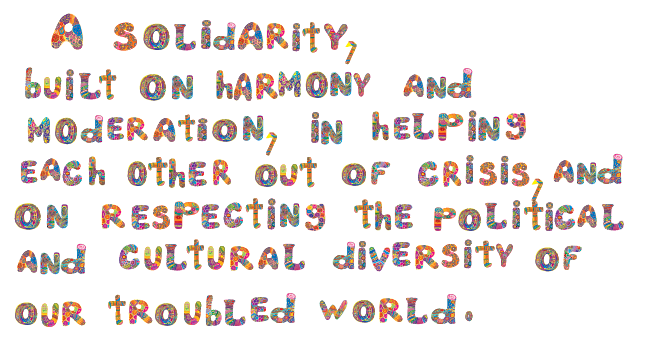
Planet Earth is the home of Life, our home as human beings. Earth provides favourable living conditions which constitute our environment. Earth provides us with the air we breathe, water we drink, food we eat and land where we live on.
Among the stunning variety of worlds in our solar system, only Earth is known to host life in such prolific and creative breeders of life. But other moons and planets of the Solar System also show signs of potential life habitability.
Global Community has long been waiting for a truly global governing body based on universal values, global rights, global concepts and direct democracy. We might as well start this new way of doing things now, there is no longer any reason to wait. But then Global Civilizational State is already here. As never before in history, common destiny beckons us to seek a new beginning. It requires a new sense of global interdependence and universal responsibility. We must develop and apply the vision of a sustainable way of life locally, nationally, regionally, globally, and within ourselves throughout life. Our cultural diversity is a precious heritage and different cultures will find their own distinctive ways to realize the vision.
Global Civilizational State has now a Vision of the Earth in Year 2024 and a sense of direction. Global Civilizational State embarks on a new path in history, the inevitability of global societies living, sharing, and creating symbiotical relationships interactively is, beyond doubt, that which we must confront. Our creativity today may influence tomorrow's socio-economic strategies and contribute to the evolution of human societies - an evolution directed towards a global partnership and cooperation with each other for survival.
In order to build a sustainable Global Community, each individual, each local community, and national governments of the world must initiate their commitment to Global Civilizational State. Global Civilizational State was defined as a social, and political movement in the sense of having a broad organizational structure and an ideology aimed at governing. The Global Environmental Movement, another group within Global Civilizational State, expresses the concerns of groups of people who have accumulated scientific data showing the depletion of the quality of water, clean air, climate change aspects, degradation of land and other changes in ecosystems affecting traditional patterns of natural resources exploitation. Global Civilizational State has taken the role of helping these groups in protecting and managing the environment by coordinating their efforts.
This Century is a new challenge. New standards, goals and objectives had to be defined. Firm universal guidelines were found essentials in keeping the world healthy. Already, we notice new ways of thinking being embraced, new behaviors and attitudes adopted. Global ethics are required to do business and deal with one another to sustain Earth. Global Community proposed to corporations that they take responsibility on behalf of society and people, and that they should pay more attention to human and Earth rights, working conditions and getting ride of corruption in the world of business and trade. We have developed a criteria, obtaining your Certified Corporate Global Community Citizenship (CCGCC), and we ask you to turn it into practice.
This criteria will help you to show the world your ways of doing business are best for Global Community. Governments should encourage enterprises to use the criteria both by legal and moral means. At first, the criteria should be adopted in key areas such as procurement, facilities management, investment management, and human resources. Corporations want to be seen as good corporate leaders and have a stronger form of accountability. Business and trade will prosper after stronger common bonds and values have been established. Adopting the criteria will have a beneficial impact on future returns, and share price performance.
Obtaining the criteria will help businesses to be part of the solution to the challenges of globalisation. In this way, the private sector in partnership with the civil society can help realize a vision: allowing a global equitable and peaceful development and a more stable and inclusive global economy.
We have the responsibility of managing Earth. The Earth ecosystem is so fragile that we have to manage it together wisely.
In consequence of globalization, the new economic and political distribution of power around the world have become very different then we were used to. It has become very fluid, in perpetual motion and affected by global markets. Giant new markets are forming all over the world. Competition is hardening. National economies can no longer insure or guarantee rights of possession on any property. National borders no longer mean protection, security, cultural boundaries, resources ownership, political and economic control.
International market regulations try to control or ease the effects of globalization. The effects are often devastating. With globalization comes global problems such as:
* unemployment in industrial nations
* poverty increases world-wide and entire countries are in a state of starvation
* environmental degradation
* national interests of a country changing and becoming more trade oriented and trying to go with the wave of global trade
* in developing countries, national debts constrict the institutions of the national state and contribute to the destruction of the economic activity which, in turn, as the effect of creating unemployment
* the larger corporations are becoming larger and getting more power, and now control falls into the hands of a few people
* with globalization, we have no control and no say in our future and the world becomes a game played by a few people just as it has alway been through history, leading to revolutions and war
* with globalization there is no sense of direction and meaning, no security for the individual, just a few people getting richer and controlling us all.
By year twenty-one hundred, the United Nations Population Division projects that the human population will swell to as many as 11.3 billion people. If humans take over all of Earth’s living surface, there will be no room to provide for itself, let alone room for any other living plant or life form populations.
But human population will never reach that point. If human populations continue to balloon unabated, it will essentially eradicate itself with disease, starvation, harmful and detrimental living conditions and psychological deterioration.
With so many people taking so much land that also is needed for biodiversity, agriculture and food production, transportation, healthy living and natural habitats, the question necessarily becomes, “What is going to give?”
Earth is finite. Earth’s resources are finite. So, populations cannot be infinite; however, the global population continues to grow, taking more and more land, using up more and more resources, demanding more and more energy and housing. In this way, the human species is its own enemy.
Clearly the environmental challenges facing humanity in this century and beyond would be less difficult in a world with slower population growth or none at all.
A civilization is a complex human society, usually made up of different cities, with certain characteristics of cultural and technological development. In many parts of the world, early civilizations formed when people began coming together in urban settlements.
Today, all civilizations have certain characteristics. These include: large population centers; monumental architecture and unique art styles; shared communication strategies; systems for administering territories; a complex division of labor; and the division of people into social and economic classes.
All world civilizations have values, solutions to handle issues, and a vision for survival as a species, as a community part of a large group, the Global Community.
The United Nations is an international organization founded in 1945 and committed to maintaining international peace and security; developing friendly relations among nations; promoting social progress, better living standards and human rights.
The UN Security Council seeks to address threats to international security. The Security Council fosters negotiations, imposes sanctions, and authorizes the deployment of peacekeeping missions. Global Community and its institution the (GPA), have been asked to replace the UN to help our overpopulated world managed our ways relating to the production, the buying, and the selling of goods or services. The GPA will train and lead a global force, bypassing traditional peacekeeping and military bodies such as the United Nations and NATO. The GPA will enforce the law. And that is how we can stop the global warming of the planet and protect the global life-support systems, thus largely improving the quality of life of the next generations. Global Parliament also leads the way in creating legitimate power for the GPA. The GPA would have the approval from all member nations to give immediate help, bypassing normal government protocols. Somewhat like an emergency unit but at the global level.
Global Community Peace Movement has declared a planetary state of emergency. And that is how we can stop the global warming of the planet and protect the global life-support systems, thus largely improving the quality of life of the next generations.
Since year 1985, Global Community has organized the Global Dialogue to probe the Peoples of the world, people from all nations, as to what it will take to make living on Earth sustainable, now and for the next generations.
Global Rights is a new impetus of Global Community to educate everyone about the need for a change in thinking and of doing things amongst all nations. We need to realize what is a priority, what is the most important, and what is the least important for our survival. We need to make hard choices. We need a clear vision. We need a common vision. And we must all change! There are many important aspects of our lives we can no longer do, or should never do anymore. They are destructive. Humanity and all life can no longer afford activities that destroy life and the global environment. And there are other activities we must do, certainly thousands of them, to assure the survival of life on Earth.
In view of the planetary state of emergency we all must change, we must do things differently to give life on Earth a better survival chance. And this is what "Global Rights year one" is about: to establish global fundamentals and a clear vision to follow, and to offer the people of all nations the Global Movement to Help. Perhaps the Scale of Global Rights represents the strongest pillar of our vision. In 1985, the Scale of Global Rights was first proposed as a replacement to the Universal Declaration of Human Rights. After several decades of research and development, monthly global dialogues, we still find the Scale as the best solution to global problems. We are presenting once more the Scale as the best educating tool to bring about the change the people of the world need to achieve for their own survival.
As Global Parliament enacts Global Law, we will begin to take on a much deeper kind of global leadership, one that earns more respect than envy and more gratitude than hatred, one that can catapult the whole planet forward into a future where war is no longer thinkable between nation-states and a legitimate and beneficial global government is able to cope with global problems.
I believe that there is no greater task in the world today than for Global Parliament to proceed through the maturation of its leadership, emerging from a more self-interested adolescence as a global leader into a nobler adulthood. We have the potential to act as a torchbearer for a better tomorrow. Do we heed the call? I hope this message has convinced us all that the question of how to proceed with that maturation is of far deeper significance than the reforming of the United Nations. I thus pray that we move with wisdom, grace, clarity, and love in the days, years, and even decades ahead.
The UN has no military forces of its own, and Member States provide, on a voluntary basis, the military and police personnel required for each peacekeeping operation. We want Global Parliament's Constitution be the guide for peacekeeping missions as well. Member nations must follow Global Law as outline in the Constitution.
Knowing about how ancient people and societies dealt with issues in the past helps us to recognize, and be prepared for, dealing with our own issues both currently and in the future. The Global Constitution will be the primary guide for dealing with issues.
The most important characteristic for the development of a Global Civilizational Community, or Multicivilizational Community, is the presence of advanced cities because they were centers of international trade, which established world economies and allowed for further development of the global civilizations, and established Global Peace and the Protection of the Global Life Support-systems.
Governance of the Earth will make the rule of arbitrary power--economic such as (WTO, FTAA, EU), political, or military such as (NATO)-- subjected to the rule of Global Law within the global civil society, the human family. Justice is for everyone and is everywhere, a universal constant.
A soon as a state government in the world wishes to be a member of Federation of Global Governments, Global Community has no intention of changing the status and privileges of state governments. In fact, state governments become primary members of the Global Community. Global governance can only be effective within the framework of a world government or world federalism. There is no such thing as global governance through the work of a few international organizations such as the WTO, the EU, or the United Nations dictating to the rest of the world. These organizations are heading in the wrong direction and are causing conflicts between nations, doing away with democracy, increasing the gap between rich and poor, and creating a culture of violence worldwide, terrorism being a small example of what they can do. Let us all be united within the Federation of Global Governments.
Thank you for listening to me.

The earliest life forms we know of were microscopic organisms (microbes) that left signals of their presence in rocks about 3.7 billion years old. The signals consisted of a type of carbon molecule that is produced by living things. But Earth is considered as the home of humankind.
Planet Earth is the home of human beings as it provides favourable living conditions which constitute our environment. It provides us with the air we breathe, water we drink, food we eat and land where we live.

Among the stunning variety of worlds in our solar system, only Earth is known to host life. But other moons and planets show signs of potential habitability.
This is the Summary of 101 links with pictures and expository texts to show how we can save the world from extinction, the complete disappearance of species from Earth. The short version and more complete work can be found here.
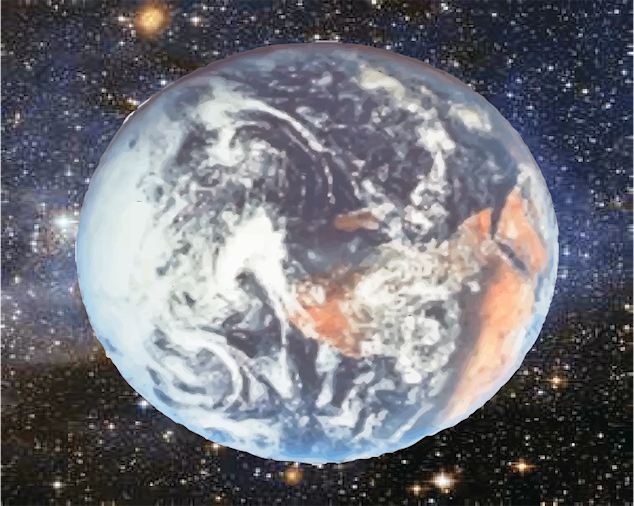
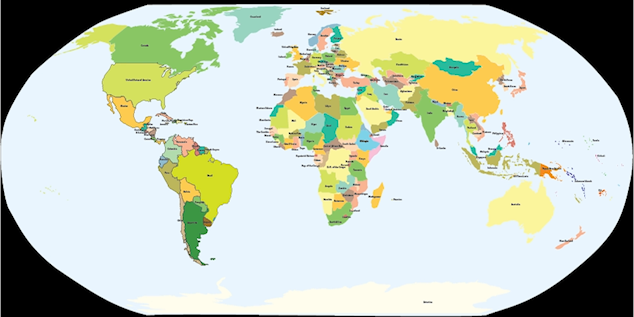
GC_7
What makes Earth suitable for all life? It should, however, be stated that democracy-building in our place in history is far easier to achieve in an authoritarian setting compared to a totalitarian one.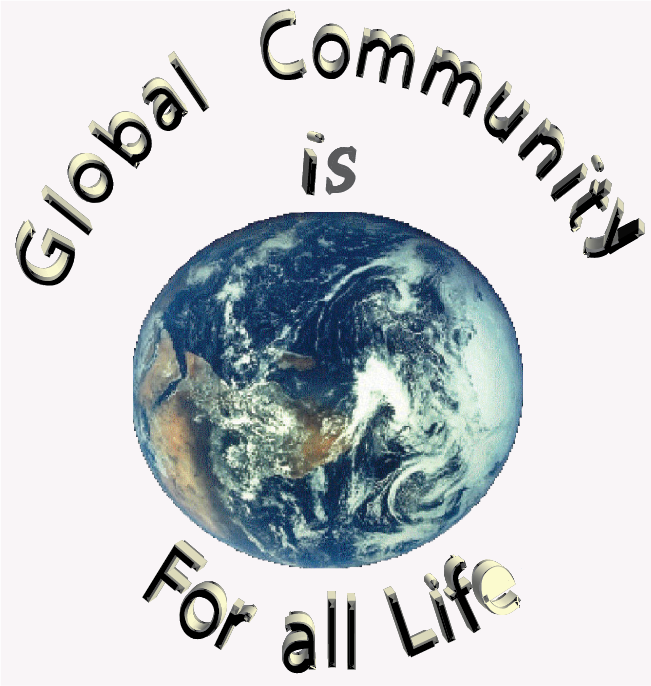

![]()
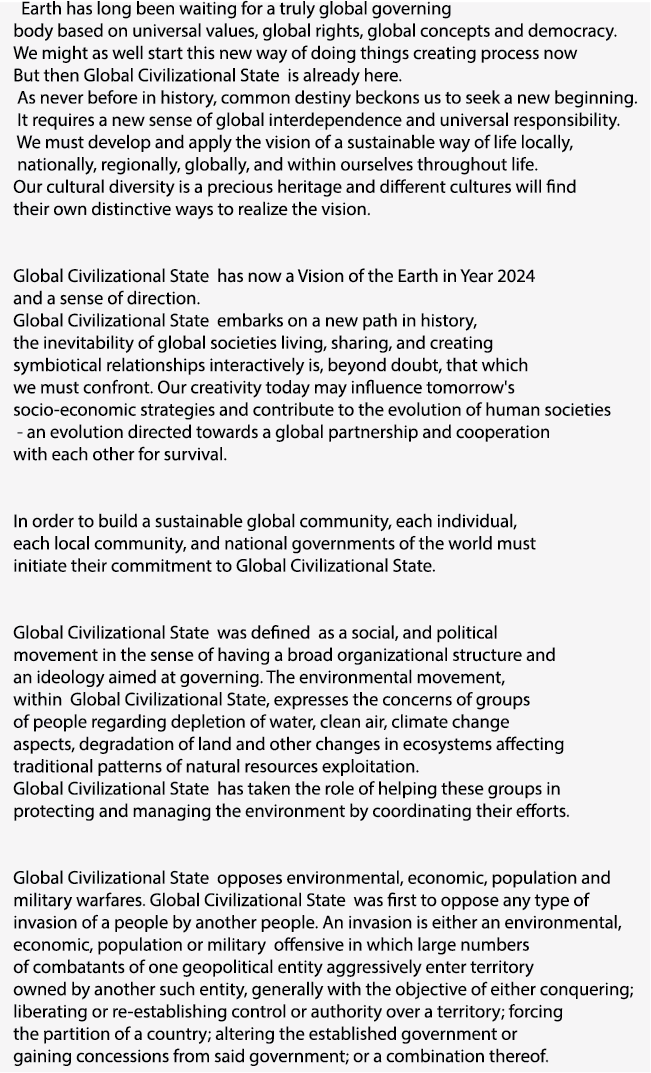
GC_88
Earth has long been waiting for a truly global governing
body based on universal values, global rights, global concepts and democracy.
We might as well start this new way of doing things creating process now, there is no longer any reason to wait. But then Global Civilizational State is already here.
As never before in history, common destiny beckons us to seek a new beginning. It requires a new sense of global interdependence and universal responsibility.
We must develop and apply the vision of a sustainable way of life locally, nationally, regionally, globally, and within ourselves
throughout life. Our cultural diversity is a precious heritage and different cultures will find their own distinctive ways to
realize the vision.
Global Civilizational State has now a Vision of the Earth in Year 2024 and a sense of direction. Global Civilizational State embarks on a new path in history, the inevitability of global societies living, sharing, and creating symbiotical relationships interactively is, beyond doubt, that which we must confront. Our creativity today may influence tomorrow's socio-economic strategies and contribute to the evolution of human societies - an evolution directed towards a global partnership and cooperation with each other for survival.
In order to build a sustainable global community, each individual, each local community, and national governments of the world must initiate their commitment to Global Civilizational State. Global Civilizational State was defined as a social, and political movement in the sense of having a broad organizational structure and an ideology aimed at governing. The environmental movement, within Global Civilizational State, expresses the concerns of groups of people regarding depletion of water, clean air, climate change aspects, degradation of land and other changes in ecosystems affecting traditional patterns of natural resources exploitation . Global Civilizational State has taken the role of helping these groups in protecting and managing the environment by coordinating their efforts.
Global Civilizational State opposes environmental, economic, population and military warfares. Global Civilizational State was first to oppose any type of invasion of a people by another people. An invasion is either an environmental, economic, population or military offensive in which large numbers of combatants of one geopolitical entity aggressively enter territory owned by another such entity, generally with the objective of either conquering; liberating or re-establishing control or authority over a territory; forcing the partition of a country; altering the established government or gaining concessions from said government; or a combination thereof.
An invasion can be the cause of a war, be a part of a larger strategy to end a war, or it can constitute an entire war in itself. Due to the large scale of the operations associated with invasions, they are usually strategic in planning and execution. Global Civilizational State has been witnessing such different types of walfares for decades. And now is time to stop all types of invasion no matter what they maybe.
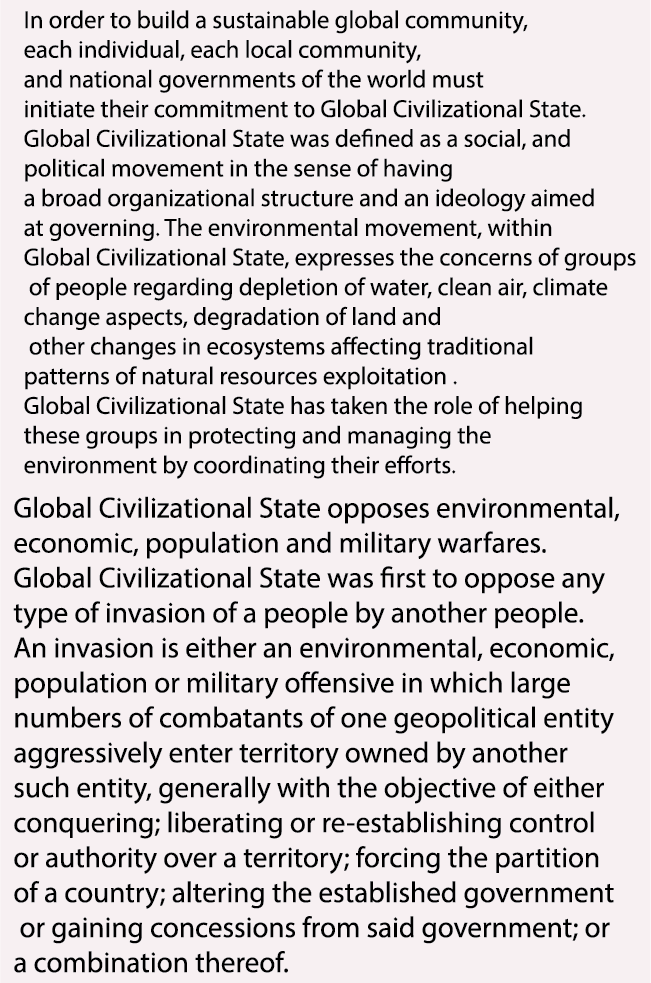

Love the world, save the world! Rise up global citizens. You are needed! Life needs you, now. Take significant and meaningful actions to save Earth, all Life, from complete extinction. Let us lead the world toward Global Civilizational State for education, Justice, protection of life species on Earth, and for new ways of doing business and trade, in global development, and in the management of global resources.
At the origin of this quest, a source no one remembers, was a long, arduous search for something to save the world, to take all our dreams, fears, and goals, and wrap them up into an attainable journey. More was written during Global Dialogue 2022 and, of course, during all Global Dialogues since 1985. Let me remind you of the first addendum to the paper published for the month of August, 2023, and also is an addition to today's document.
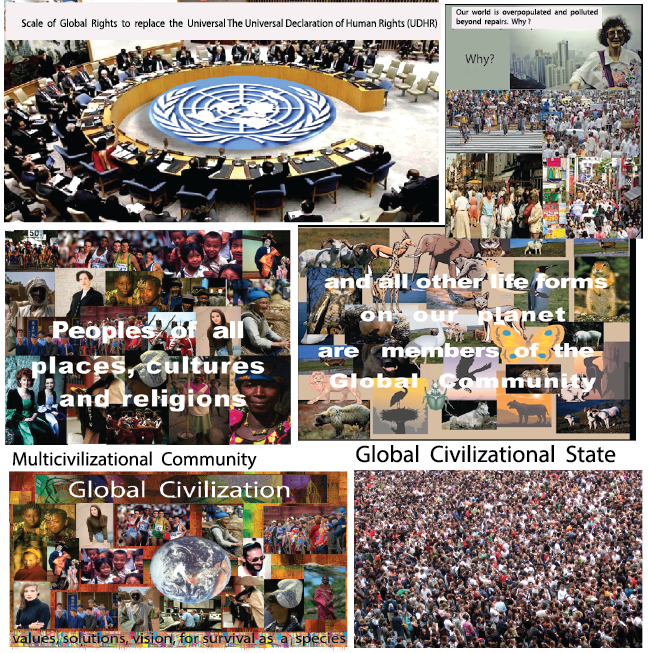
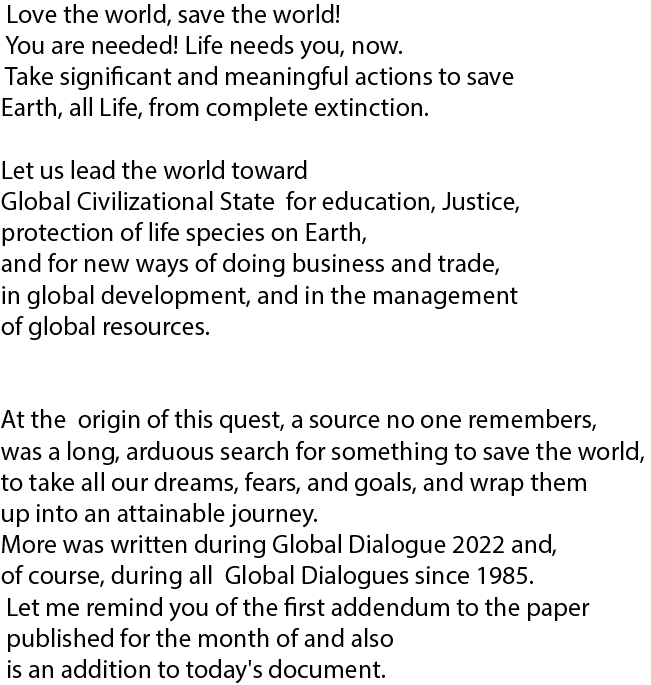
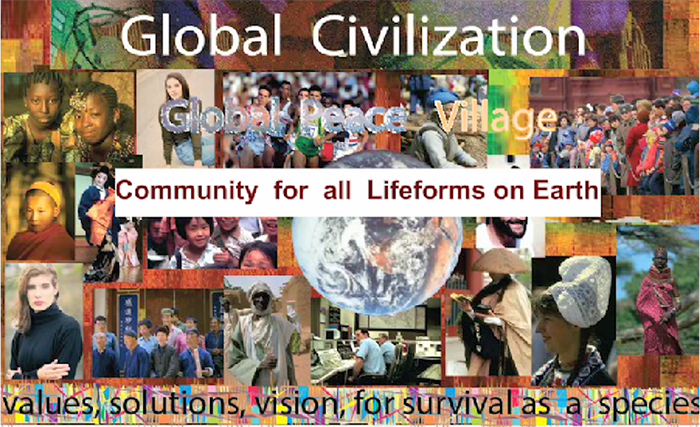
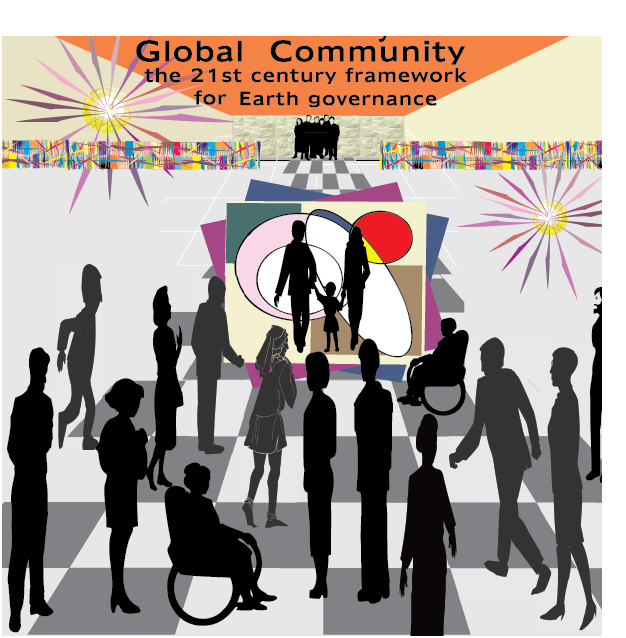

The stewardship
of the ecological base has to be given priority before the fulfilment of various economic and social wishes. All families need shelter, food, language, body of knowledge, certain skills, a source of income. Security of the home is an important aspect for any family and Global Civilizational State
it belongs to. Primordial human needs raise the question of interacting universal responsibilities. In terms of parenthood,
parents must raised their children mentally and physically healthy. It is a responsibility to do so. Which also means each local community must have an educational system to help parents raise the child. On the Scale of Global Rights primordial human rights and the protection of the global life-support systems and of ecological rights are on top of the Scale. They are the most important aspects on the Scale.
As global crises of all sorts further intensify, the Global Community may have no alternative but to show solidarity and help each other out of crises, and such solidarity can only be built on the basis of harmony and moderation, and on respecting the political and cultural diversity of this troubled world. A successful Global Civilizational State for all life on Earth is on the horizon. Let us lead the world toward a Global Civilizational State.
Yet, the main reason that the whole mess will be curbed is a simple one: infinite growth, whether economic growth or population growth, cannot continue indefinitely. Anyone who believes exponential growth can go on forever in a finite world is either a madman or an economist. Accordingly, one can envision that a crash is coming. In large measure, it's because environmental tipping points are already on the way and, for those people in the worst locations for the collapse -- the desperation, conflicts and chaos will likely be horrific in scale and ferocity.
How could they not be when our governments worldwide and the status quo do not encourage our transitioning to a steady state economy, business based on regionalized commerce and a cooperative inclusive economic arrangement rather than out of control global competition, "democratic socialism plus" rather than capitalism? How can further troubles not come into being when a vicious globalized capitalism system is in existence for which maximal profits, not people and their needs, is always the overriding goal? Despite its desirably from many standpoints, how can an alternative scheme be put in place when it bumps up against the prevailing paradigm and the corporatists -- the powerful über-elites that control the gargantuan transnational companies and our fawning government toadies?
Theme of the first addendum of August 2023 Newsletter:
Executive order concerning Global Parliament, all of Humanity's new vision of the world.
Vision of the world to save all life on our planet, Earth.
Environmental problems have contributed to numerous collapses of civilizations in the past. Now, for the first time, a global collapse appears likely and global warming, overpopulation, overconsumption by the rich and poor choices of technologies are major drivers; dramatic cultural change provides the main hope of averting calamity.
The life extinction crisis on Earth is an environmental issue and also a social justice issue, one that is linked to long histories of capitalist domination over people, other life forms, and plants. The extinction crisis needs to be seen as a key element in contemporary struggles against accumulation by dispossession. This crisis, in other words, ought to be a key issue in the fight for climate justice. The 1% people have as much wealth as half the world's population, and are controlling all economies on the planet. They stand behind an economic system based on capitalism that has institutionalized a global ignorance, in which producers and consumers cannot know or care about one another, and in which the histories of all products will be lost.
Global dialogues are the source of new ideas and finding new ways for our survival as a species on Earth and taking along with us other lifeforms on the planet.
The people of Global Community, are using global dialogues to resolve conflicts, promote democracy, and fight hunger, terrorism, disease, and human rights abuses. Meetings of Global Community organization always involve the assessment of our values, solutions, vision, for survival as a species, and passing them along to governments all over the world and to businesses, global citizens, people everywhere, educational institutions, and nonprofit organizations. They always make their ways to our yearly Global Roundtables and Newsletters for more discussions and re-assessments of issues and global solutions.
We can all have Peace on Earth, our Global Community. And so, let us all celebrate our 39th Anniversary since 1985 to 2024.
Let us continue to buildup the Multicivilizational Community, and our Global Civilizational State to keep Peace in the world with sustainability.
Over ancient time to this day, morality in society made its way into our ways of doing business. So the set of behaviors that constitute Global Civilizational State ethic for a business also evolved largely because they provided possible survival benefits to increase evolutionary success. Consequently, peoples evolved socially to express emotions, such as feelings of empathy or guilt, in response to these moral behaviors. Humans developed truly moral, altruistic instincts.
GC_1
GC_60
Global Community stands for a democracy based on the fact that land, air, water, oil & gas, all minerals, space, and the electromagnetic spectrum are natural resources, and rightly belong to Global Community as a birthright, and they are for sharing as per the Scale of Global Rights.
We can all have Peace on Earth, our Global Community. And so, let us all celebrate our 39th Anniversary since 1985 to 2024.
Let us continue to buildup the Multicivilizational Community, and our Global Civilizational State to keep Peace in the world with sustainability.
Global dialogues are the source of new ideas and finding new ways for our survival and taking along with us other lifeforms on the planet.
The people of Global Community, are using global dialogues to resolve conflicts, promote democracy, and fight hunger, terrorism, disease, and human rights abuses.
Global Community Anniversary begins every year from September 1st of a year and ends at the end of the month of August
of the following year. For instance, today, the 39th Anniversary started on September 1st 2023, and will end at the end of the month of August 2024.
In order to bring about the event of peace, Global Community is offering other good organizations around the world to work together to bring warring parties to peace. We can accomplish this task by concrete actions such as:
a) Tracking armed conflicts within and between nations around the world and offering assistance in dispute resolution;
b) Promoting human rights and democracy;
c) Monitoring democratic elections;and
d) Educating the public about the advantages of a peaceful solution to any conflict. Global Community also proposes that all nations of the world promote the Scale of Global Rights Rights and the criteria to obtain the Global Community Citizenship.
Check our volunteer page at: http://globalcommunitywebnet.com/GPA/gpahelpsyou.htm
GC_87
It's time for us to come to terms with reality. We need ways of organizing ourselves to help us live in a world with less energy and fewer material goods. We need to recover a deep sense of community that has disappeared from many of our lives.
The world is in global crisis and a planetary state of emergency. We are exploiting our natural resources, minerals and fuels faster than we are gaining access to alternative sources. We are polluting the natural environment faster than the environment can regenerate itself to reach the level suitable for human needs. We are changing the global climate dangerously. Our attitude and way of life show a moral degradation toward the existing forms of life on the planet. It's time for us to protect what is left to protect: life itself on Earth. This was the reason for the creation of a planetary biodiversity zone. 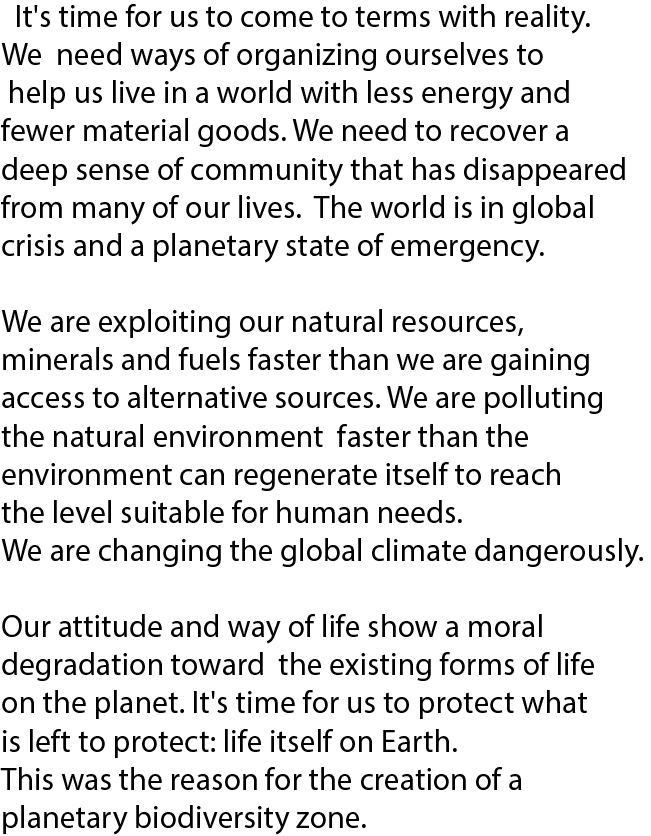
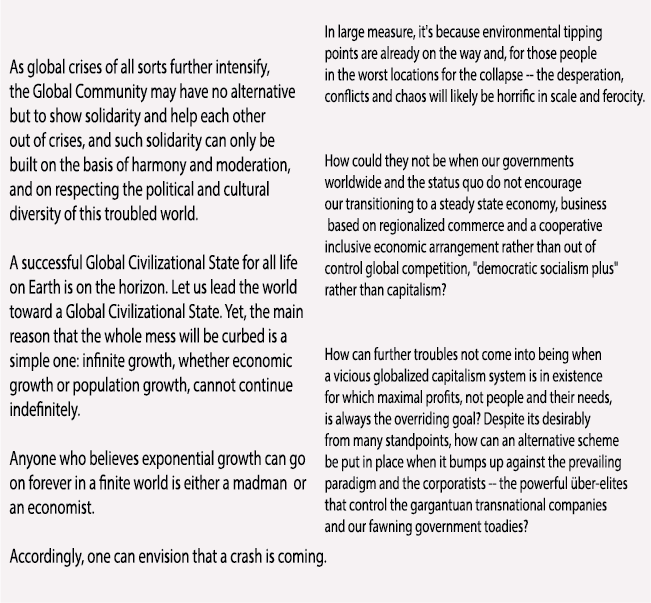
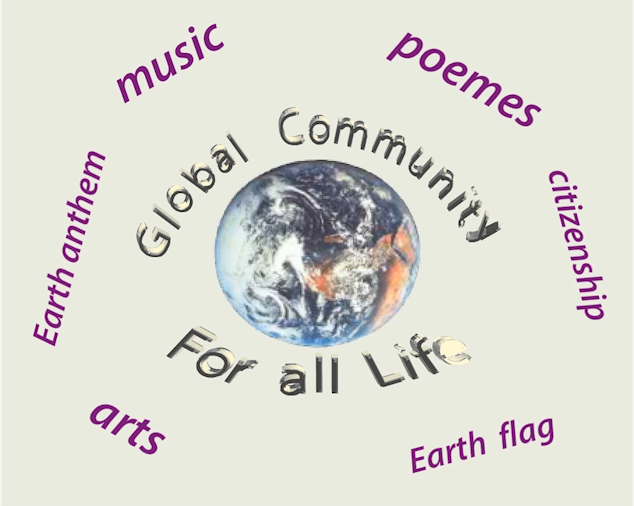
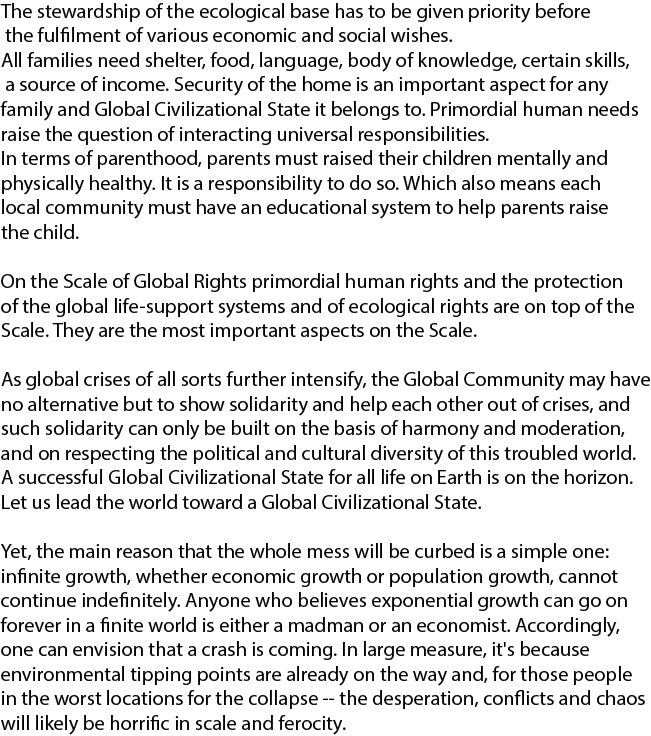
GC_5
Humanity's new Vision of the world.
It is now increasingly evident that only by sharing the world's natural resources more equitably and sustainably will we be able to address both the ecological and social crisis we face as Global Civilizational State.
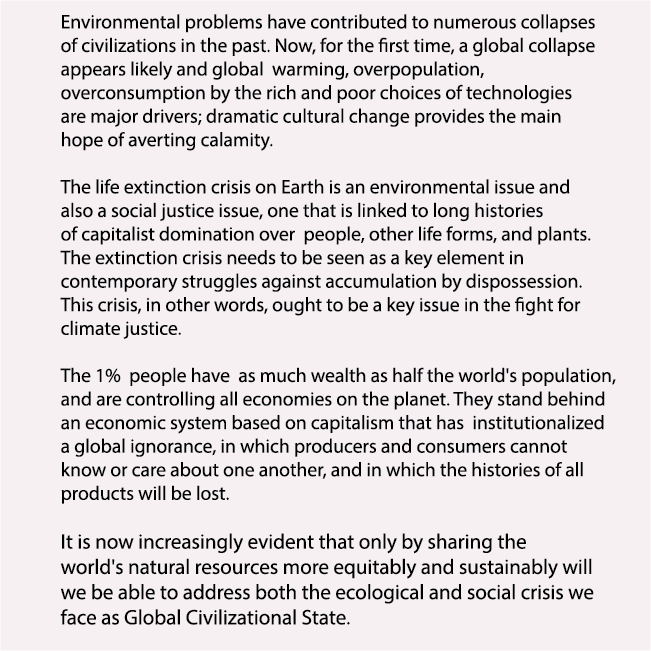
GC_6
Global Community is Earth for all Life.
Global Dialogues
Global Dialogue activities over the past decades of research work starting year 1985.
activities over the past decades of research work.
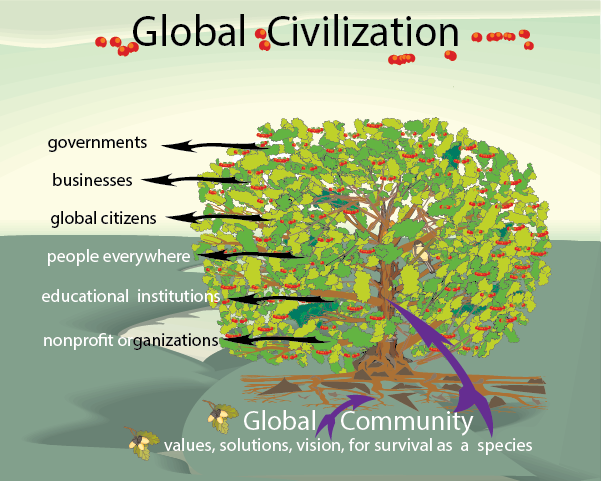
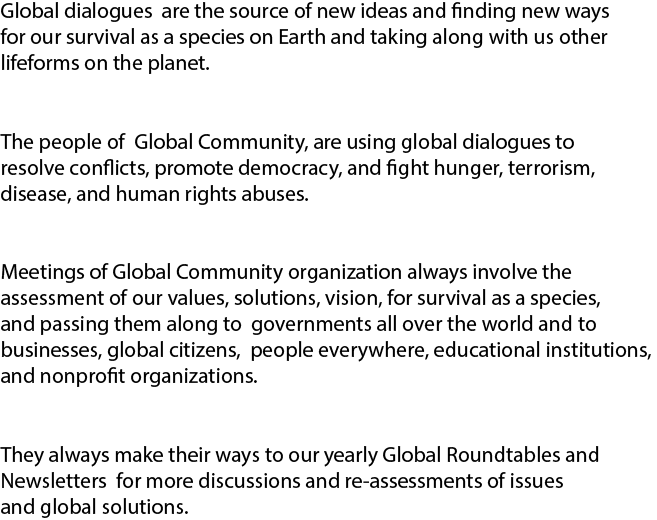
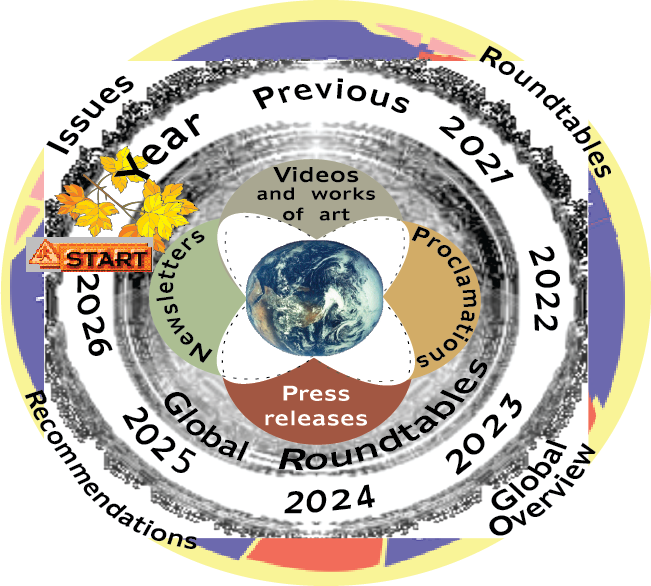
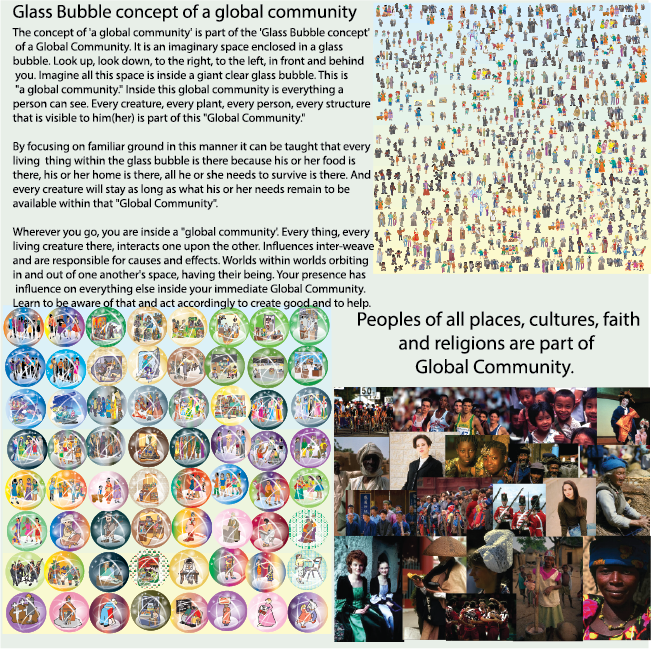
GC_57
Protection of the global life-support systems.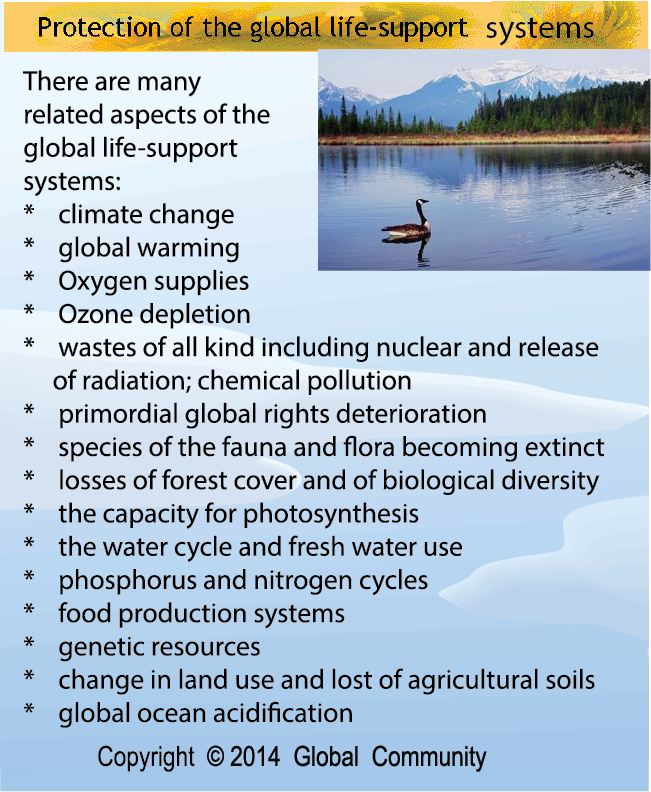
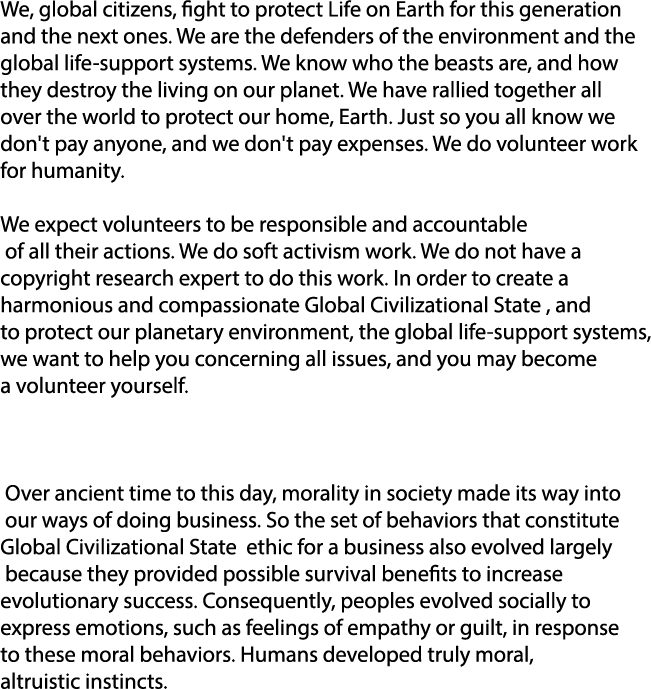
GC_71
We, global citizens, fight to protect Life on Earth for this generation and the next ones. We are the defenders of the environment and the global life-support systems. We know who the beasts are, and how they destroy the living on our planet. We have rallied together all over the world to protect our home, Earth. Just so you all know we don't pay anyone, and we don't pay expenses. We do volunteer work for humanity. We expect volunteers to be responsible and accountable of all their actions. We do soft activism work. We do not have a copyright research expert to do this work. In order to create a harmonious and compassionate Global Civilizational State , and to protect our planetary environment, the global life-support systems, we want to help you concerning all issues, and you may become a volunteer yourself.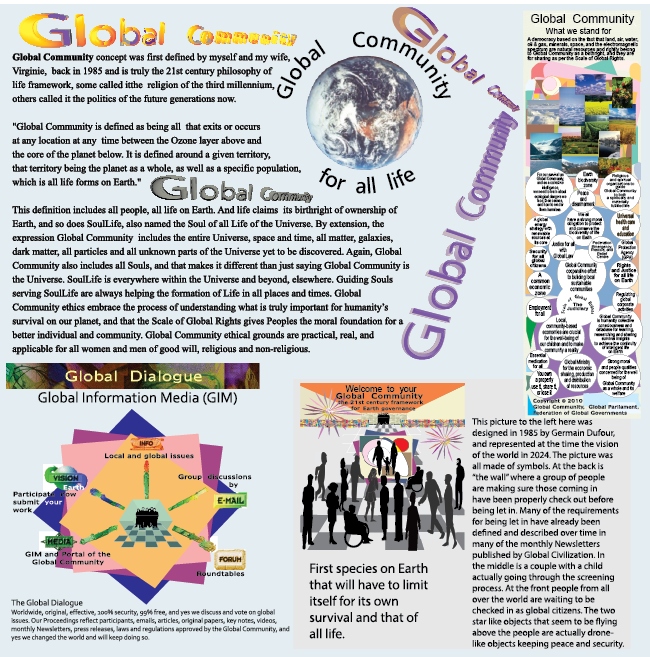
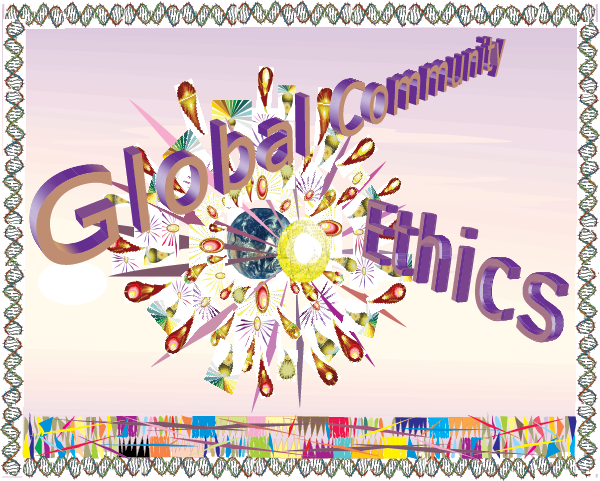
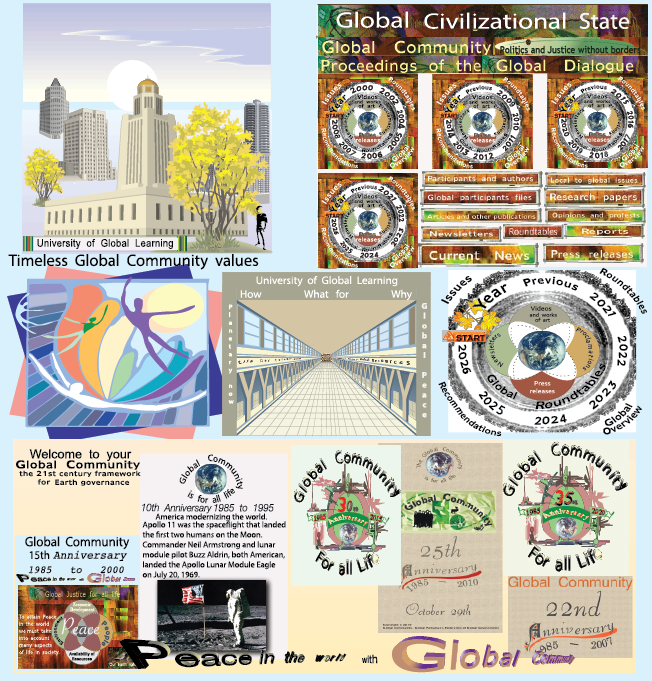

Global Community stands for a direct democracy based on the fact that land, air, water, oil & gas, all minerals, space, and the electromagnetic spectrum are all natural resources, and rightly belong to Global Community as a birthright, and they are for sharing as per the Scale of Global Rights. It is about Politics and Justice without borders for all Life on Earth. And it is about our Global Community Constitution meaning.
Glass Bubble concept of a Global Community: Peoples of all places, cultures, faith and religions are part of Global Community.
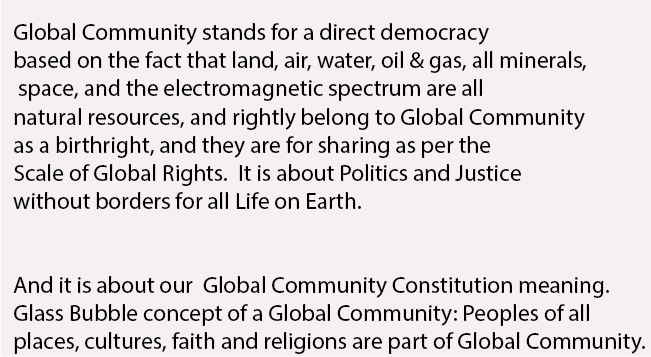
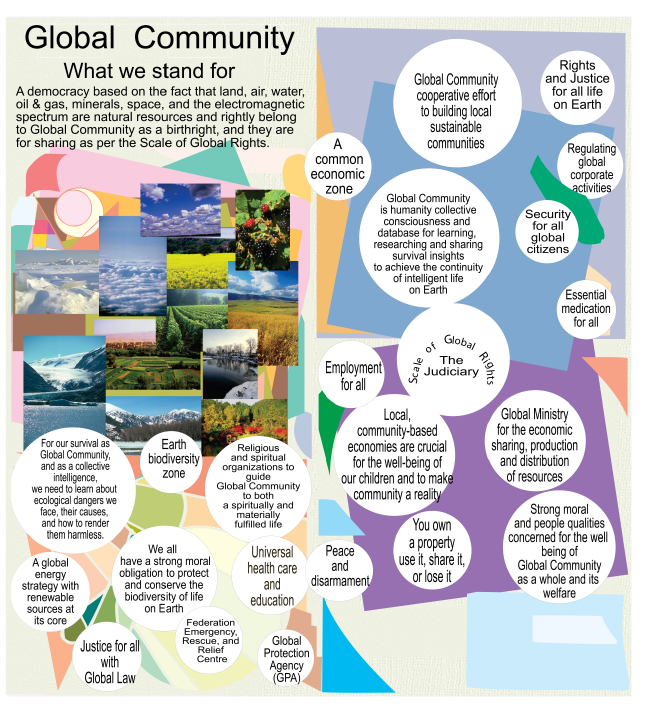
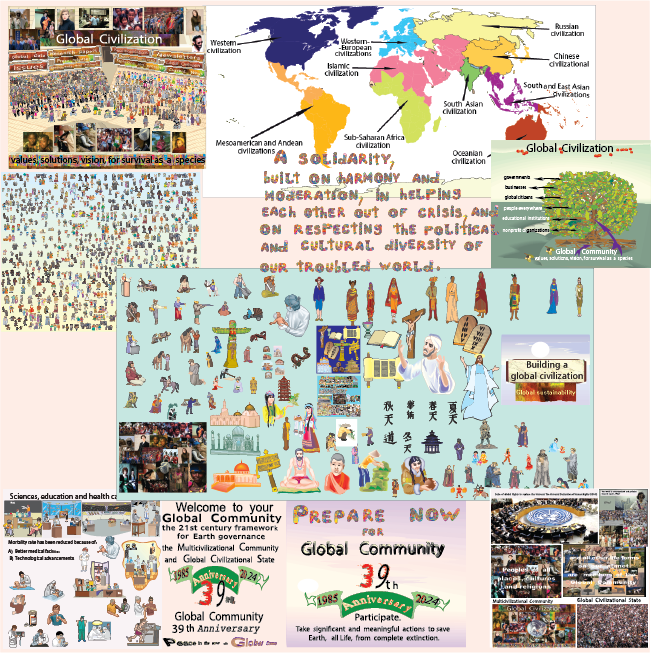


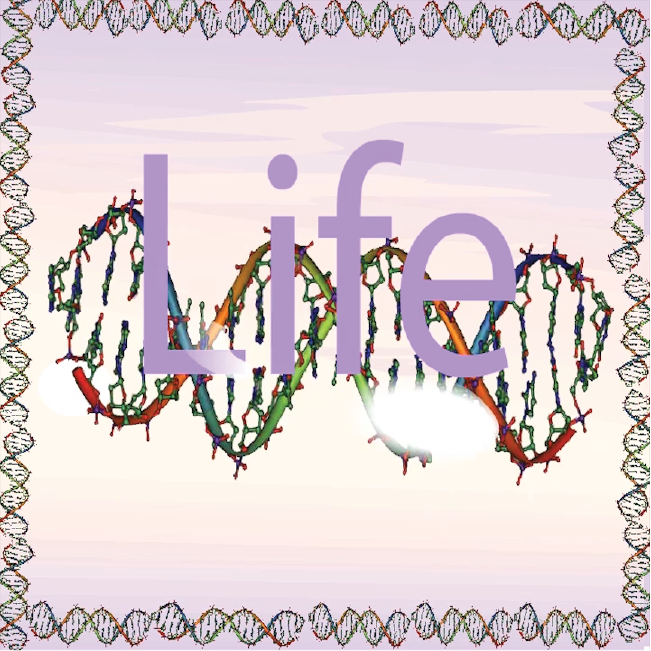
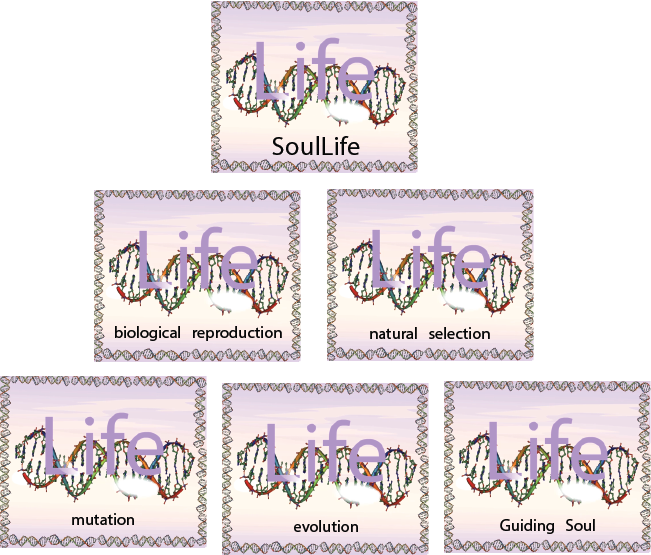
GC_7
What makes Earth suitable for all life? It should, however, be stated that democracy-building in our place in history is far easier to achieve in an authoritarian setting compared to a totalitarian one.
GC_8
Welcome to your Global Community, the 21st century framework for Earth Governance, the Multicivilizational Community, and Global Civilizational State.GC_9
Welcome to your Global Community Activities. Learn about your Global Dialogue activities over the past decades of research work.

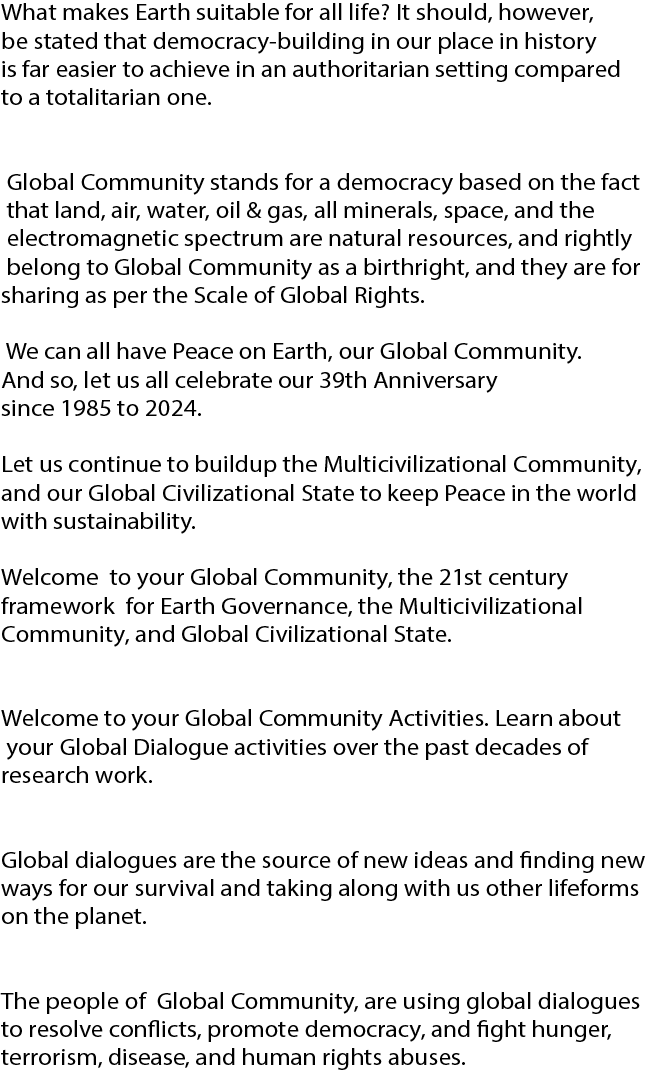
Welcome to your Global Community
Activities, About us, Contact us.
![]()
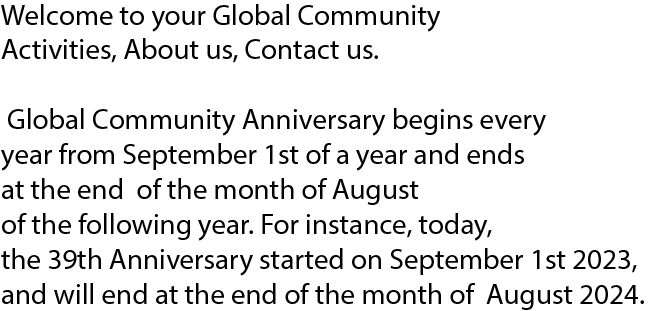
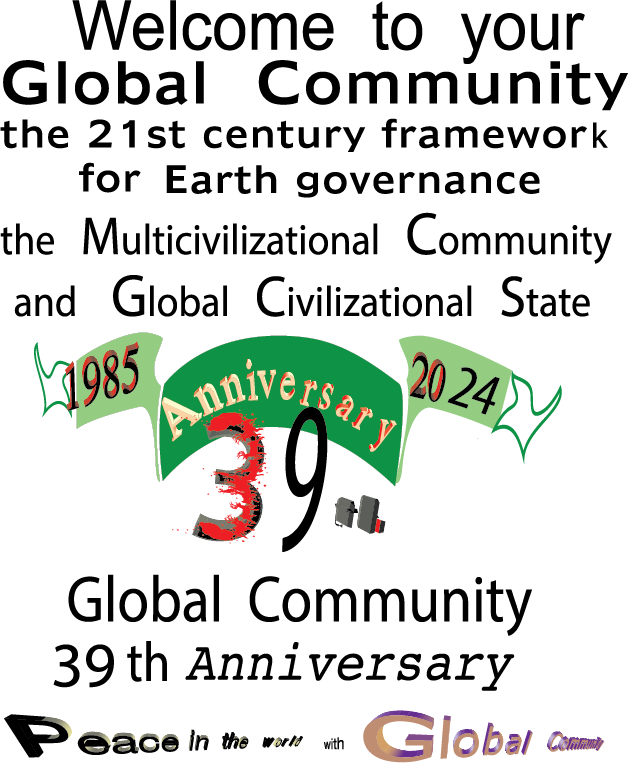

GC_71
We, global citizens, fight to protect Life on Earth for this generation and the next ones. We are the defenders of the environment and the global life-support systems. We know who the beasts are, and how they destroy the living on our planet. We have rallied together all over the world to protect our home, Earth. Just so you all know we don't pay anyone, and we don't pay expenses. We do volunteer work for humanity. We expect volunteers to be responsible and accountable of all their actions. We do soft activism work. We do not have a copyright research expert to do this work. In order to create a harmonious and compassionate Global Civilizational State , and to protect our planetary environment, the global life-support systems, we want to help you concerning all issues, and you may become a volunteer yourself.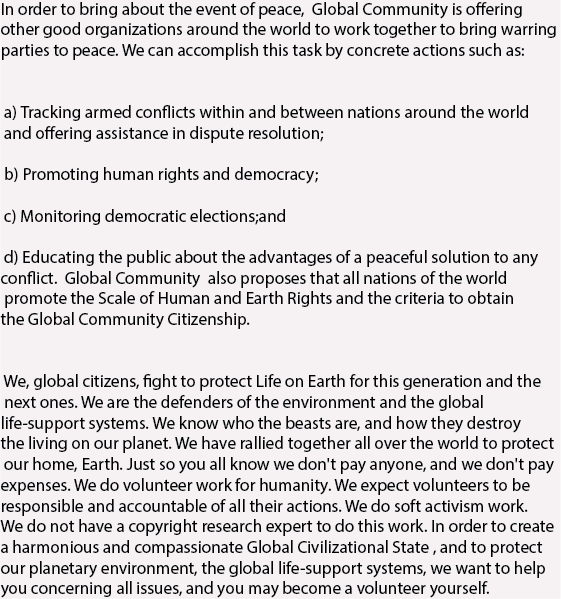
GC_72
Human history stretches through generations, and is the history of civilizations. Civilization and culture both refer to the overall way of life of a people, and involve the values, beliefs, norms, institutions, social structures, and modes of thinking to which successive generations in a given society. The composition and shapes of civilizations change over time, the cultures of peoples interact and overlap. A short list of values humans have developed over time to survive as a species are shown here.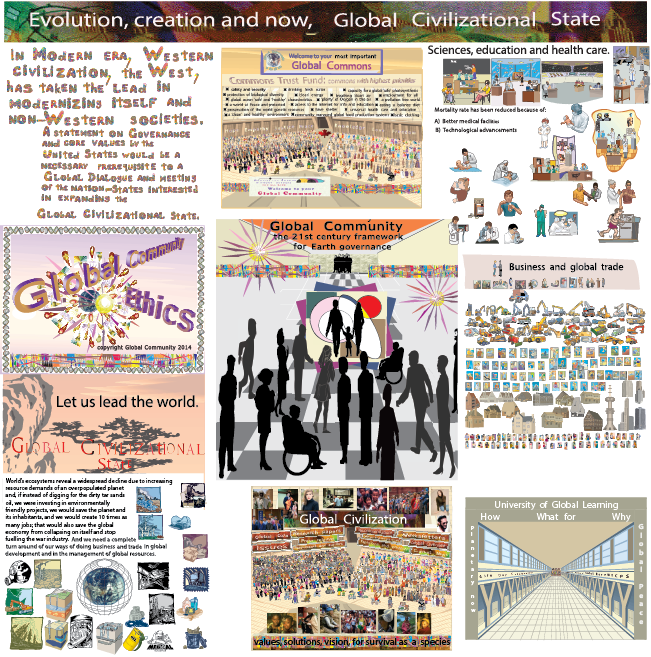
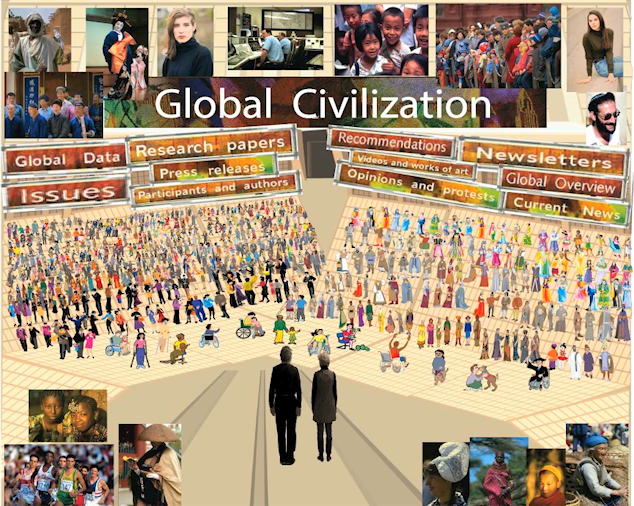
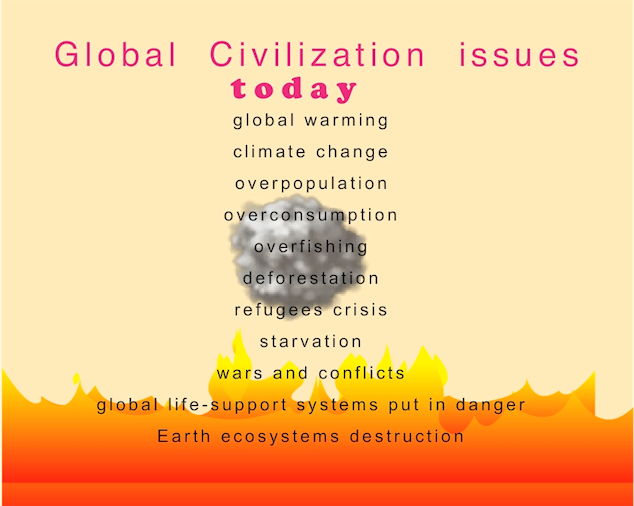
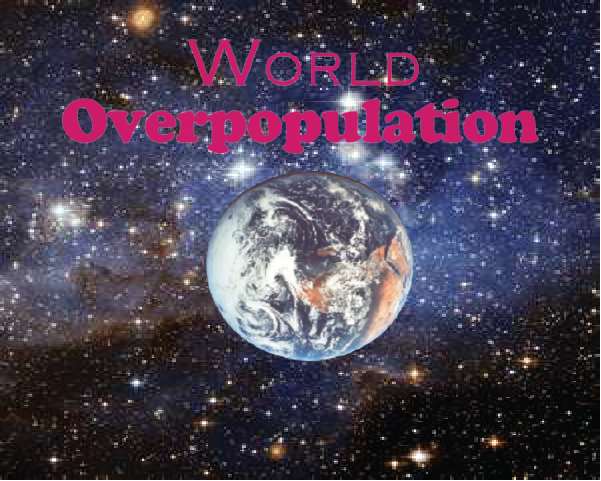
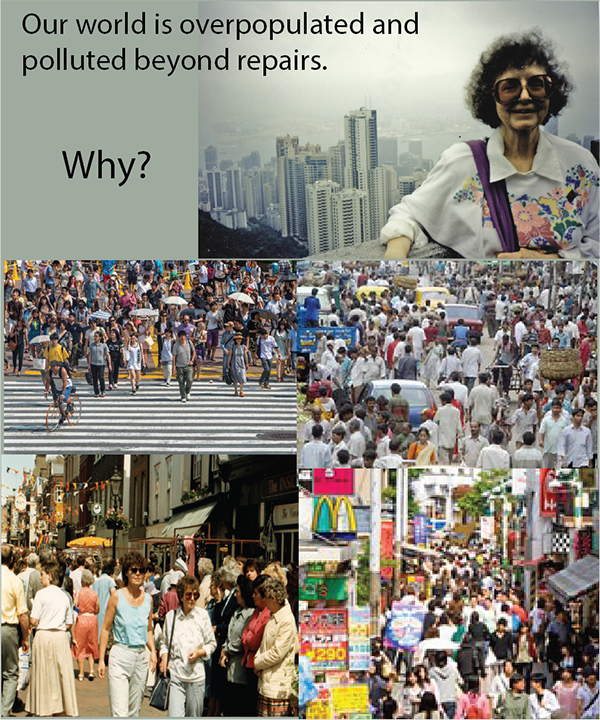
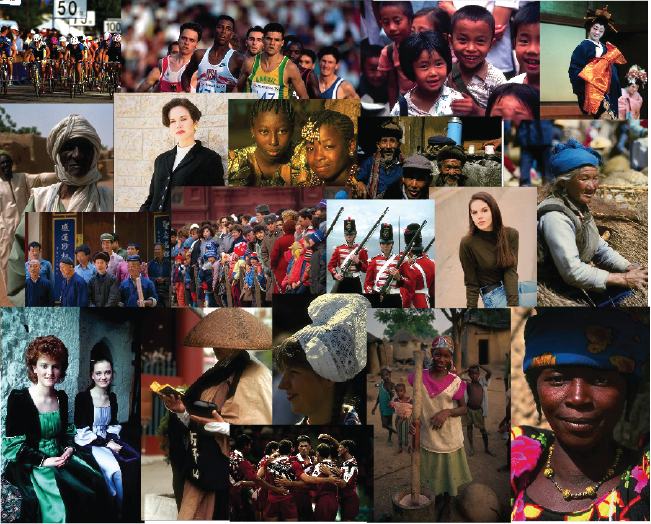
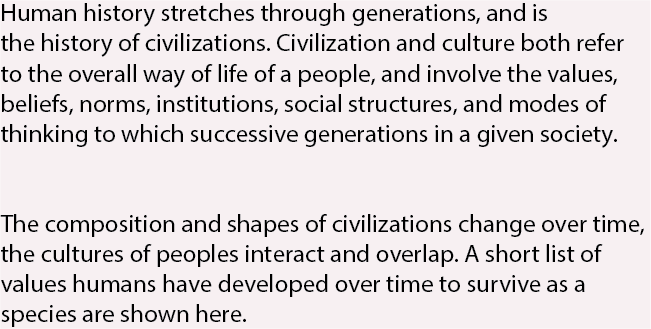

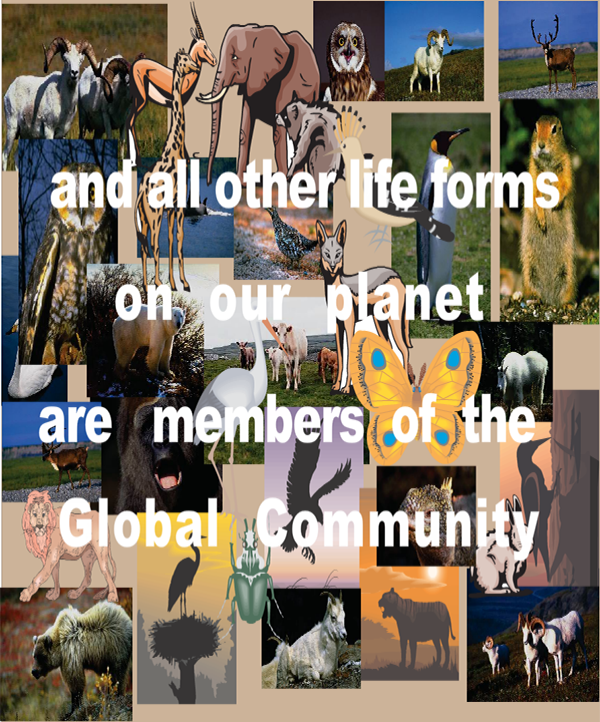

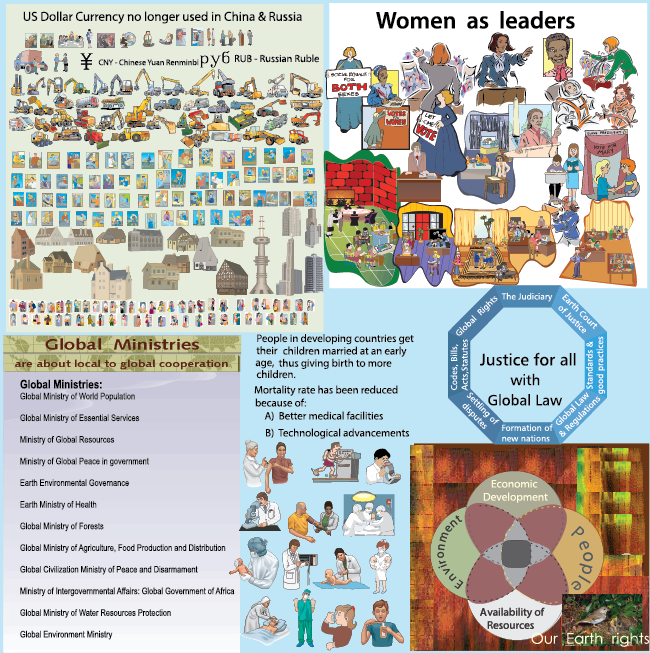


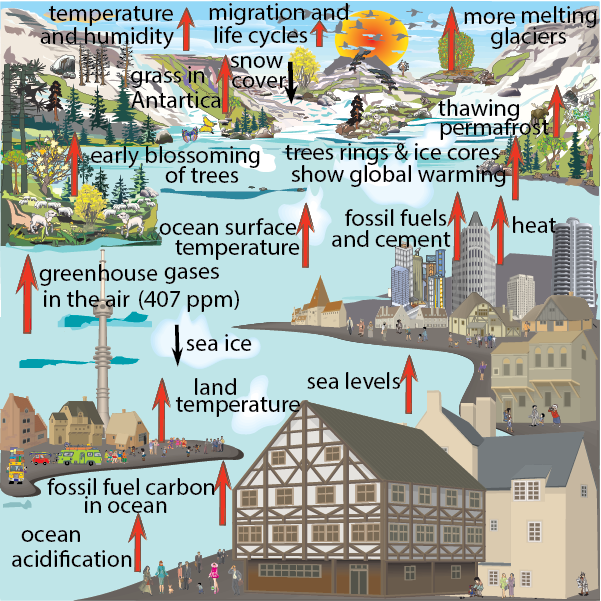
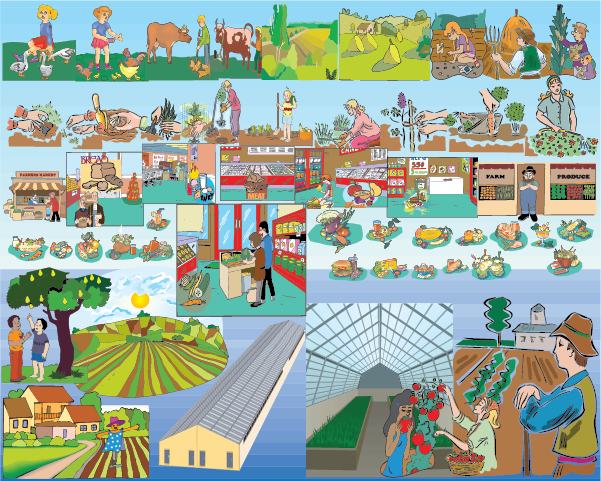

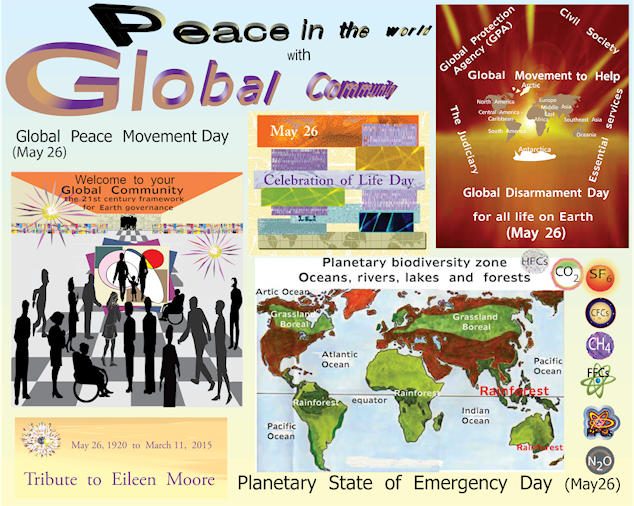
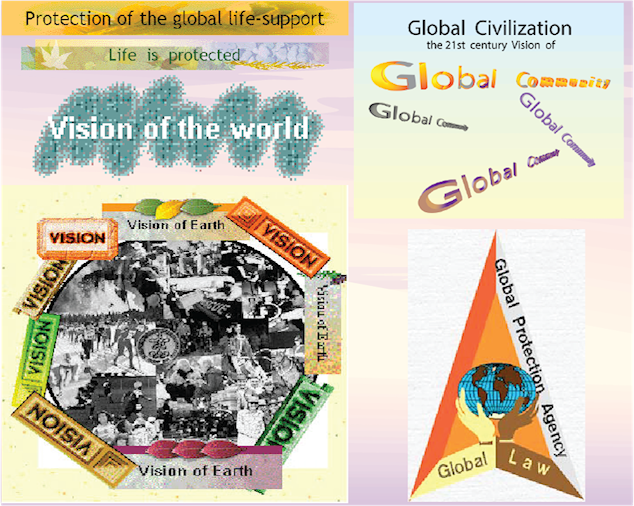

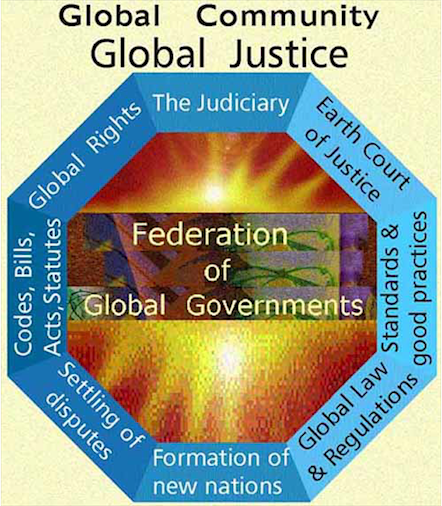

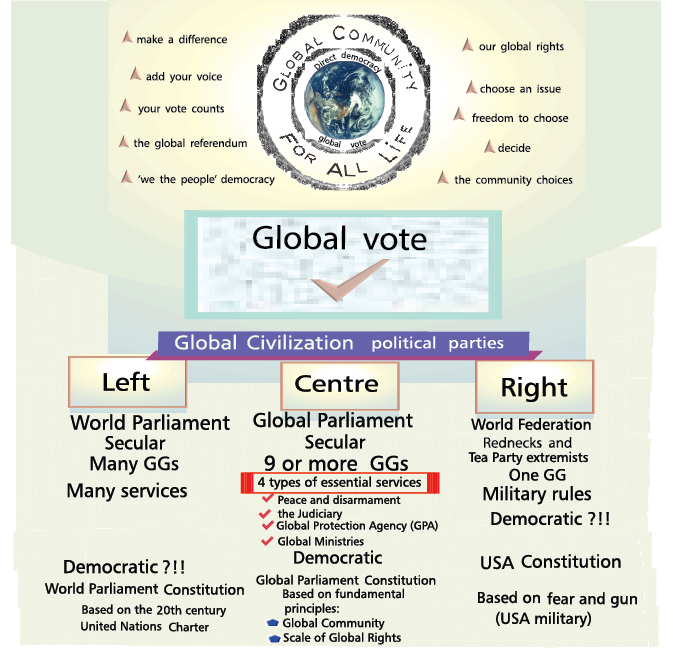
Planet Earth is the home of human beings as it provides favourable living conditions which constitute our environment. It provides us with the air we breathe, water we drink, food we eat and land where we live.
Among the stunning variety of worlds in our solar system, only Earth is known to host life. But other moons and planets show signs of potential habitability.
Economic and political power must be used as a service to humanity instead of misusing it in ruthless battles for domination. Global Community faith can help to develop a spirit of compassion with those who suffer, with special care for the children, the aged, the
poor, the disabled, and the refugees.
Today the evidence-based argument for the appearance of a Global Civilizational State is really the result of the broad processes of modernization that have been going on since the eighteenth century. Modernization involves industrialization, urbanization, increasing levels of literacy, education, wealth, social mobilization, and more complex and diversified occupational structures. It is a product of the tremendous expansion of scientific and engineering knowledge beginning in the eighteenth century that made it possible for humans to control and shape their environment in totally unprecedented ways. Modernization is a revolutionary process comparable only to the shift from primitive to civilized societies that is, the appearance and evolution of Global Civilizational State.
Theme of October Newsletter and Global Dialogue 2024
Vision of Earth in 2024: Executive order concerning Global Community's survival and Humanity's new vision of the world in 2024.
Global Community, Global Parliament, Federation of Global Governments,
Global Civilizational State
Return to Global Dialogue 2024
This Century is a new challenge. New standards, goals and objectives have to be defined. Firm universal guidelines are essentials in keeping the world healthy. Already we notice new ways of thinking being embraced, new behaviors and attitudes adopted. Global ethics are required to do business and deal with one another to sustain Earth. Global Community proposes to corporations that they take responsibility on behalf of society and people, and that they should pay more attention to human and Earth rights, working conditions and getting ride of corruption in the world of business and trade. We have developed a criteria, and we ask you to turn it into practice.
Follow the Proceedings sections, and you will find the actual author lists, with their papers and all references. Global Community Media is a way to communicate workable sound solutions to problems arising in the world. Let us share our problems and workable sound solutions. Sharing information is a necessity to all life and humanity's survival. Our world is changing fast before our eyes, and we must react quickly and hard to protect all life on Earth. No hesitation! Right now and no waiting! Life on the planet is our first priority. We must protect it at all costs.
People have shared a few fundamental values and institutions throughout history, which may explain some constants in human behavior but it cannot explain history, which consists of changes in human behavior.
The development and evolution of the West are in large part the factors which enabled the West to take the lead in modernizing itself and non-Western societies. These factors were truly concepts, practices, and institutions have been more prevalent in the West than in non-Western civilizations. Over time, characteristics of Western civilization have been defined by religion and moral principles, human rights, language, ancestry, history, ethnic groups, customs and laws, and also by maintaining a meaningful independent existence, and ways of life.
Over ancient time to this day, morality in society made its way into our ways of doing business. So the set of behaviors that constitute Global Civilizational State ethic for a business also evolved largely because they provided possible survival benefits to increase evolutionary success. Consequently, peoples evolved socially to express emotions, such as feelings of empathy or guilt, in response to these moral behaviors. Humans developed truly moral, altruistic instincts.
The life extinction crisis on Earth is an environmental issue and also a social justice issue, one that is linked to long histories of capitalist domination over people, other life forms, and plants. The extinction crisis needs to be seen as a key element in contemporary struggles against accumulation by dispossession. This crisis, in other words, ought to be a key issue in the fight for climate justice. The 1% people have as much wealth as half the world's population, and are controlling all economies on the planet. They stand behind an economic system based on capitalism that has institutionalized a global ignorance, in which producers and consumers cannot know or care about one another, and in which the histories of all products will be lost.
It is now increasingly evident that only by sharing the world's natural resources more equitably and sustainably will we be able to address both the ecological and social crisis we face as Global Civilizational State.
The combined effects of aggressive marketing, advertising, and planned product obsolescence mean that the American consumer’s oversized footprint is largely a consequence and reflection of the global power of Transnational Corporations(TNCs), and more specifically corporate America. Global warming and climate change denialism requires shutting one’s eyes to obvious realities when the truth is that the Earth is warmer than it has been in 120,000 years. In that sense, it is perhaps more accurate to speak of corporate ecological footprints rather than the footprints of nations or individuals. Globalization has meant the distancing of cause and effect, source and sink, so that the pollution and human exploitation caused in the production and transport of goods has remained invisible and opaque to consumers.
How can further troubles not come into being when a vicious globalized capitalism system is in existence for which maximal profits, not people and their needs, is always the overriding goal? The global socioeconomic system of capitalism is forcing us to work harder to surpass previous consumption and population numbers until we have devoured everything that maintains life, ending up with a polluted, lifeless, and scorched planet.
Although the yearning for peace is deep-seated, it has never been achieved during civilisation due to its competitive nature. If we keep capitalism, the ultimate in competitiveness, it will finish us. Peace can’t be attained with military force; one can’t fight for peace or for cooperation. Peace is now possible because we have to have it to survive. People have the intellectual and the emotional ability to work out the multitude of changes to enable us to be fully social and survive, if it’s our goal.
In a multicivilizational world, there are core values which different ethnic and religious societies have in common. The constructive course is to renounce global culture, accept diversity, and seek commonalities. Commonalities exist between Asia and the West. Whatever the degree to which humankind is divided, the world's major religions, Western Christianity, Orthodoxy, Hinduism, Buddhism, Islam, Confucianism, Taoism, Judaism, also share key values in common. A more inclusive Global Civilizational State can emerge gradually through the exploration and expansion of these commonalities. Peace in a multicivilizational world is the finding of those commonalities and so peoples in all civilizations should search for and attempt to expand the values, institutions, and practices they have in common with peoples of other civilizations.
When intelligent peoples study global problems, the best solutions to problems are not the destruction of the environment. Climate change has caused increased heat, drought, and insect outbreaks. In turn, these changes have made wildfires more numerous and severe. The warming climate has also caused a decline in water supplies, reduced agricultural yields, and triggered heat-related health impacts in cities.
A legally imposed contraction of the fossil energy supply and a rapid global conversion to renewable energy is a necessary step toward saving our world, Earth. So what should society do to avoid the worst impacts of climate change? Capitalism is based on ceaseless compound growth that is destroying ecosystems the world over, the goal in the rich nations of the global North must be to overturn our present expansionary system by fostering de-growth. Most importantly, nations that have benefited from burning fossil fuels must radically cut their carbon emissions in order to stem the lurch towards runaway climate chaos that endangers the vast majority of current terrestrial forms of life.
A legally imposed contraction of the fossil energy supply and a rapid global conversion to renewable energy is a necessary step toward saving our world, Earth. So what should society do to avoid the worst impacts of climate change? Capitalism is based on ceaseless compound growth that is destroying ecosystems the world over, the goal in the rich nations of the global North must be to overturn our present expansionary system by fostering de-growth. Most importantly, nations that have benefited from burning fossil fuels must radically cut their carbon emissions in order to stem the lurch towards runaway climate chaos that endangers the vast majority of current terrestrial forms of life.
Most importantly, nations that have benefited from burning fossil fuels must radically cut their carbon emissions in order to stop the climate chaos that endangers the vast majority of current terrestrial forms of life.
Let us now define what economic system should be used to govern our planet. What would be best is a "democratic socialism plus". The "plus" means added essential elements for governing sustainably. For instance, people would have free health care, free education at all levels, and employment for everyone. People would control and manage natural resources at all stages: exploration, production, transportation, manufacturing and distribution. A Global Trade and Resource Ministry would be formed to look after the management of naturel resources worlwide.
Because of the limited quantities of Earth resources to be made available for this generation and the next ones, and because of environmental, climate change, and world population concerns, there is a need to manage the entire process of using Earth natural resources. And we all know that the amount of oil left in the ground in the world has already passed its peak quantity. So why waste the oil on doing things we know are nothing but a waste of energy and often used for destruction and certainly will shorten the life span of the next generations. A Global Trade and Resources Ministry is needed to look after the management of Earth resources and trade at all stages: exploration, production, transportation, manufacturing and distribution.
Most importantly, nations that have benefited from burning fossil fuels must radically cut their carbon emissions in order to stop the climate chaos that endangers the vast majority of current terrestrial forms of life.
Let us now define what economic system should be used to govern our planet. What would be best is a "democratic socialism plus". The "plus" means added essential elements for governing sustainably. For instance, people would have free health care, free education at all levels, and employment for everyone. People would control and manage natural resources at all stages: exploration, production, transportation, manufacturing and distribution. A Global Trade and Resource Ministry would be formed to look after the management of naturel resources worlwide.
Because of the limited quantities of Earth resources to be made available for this generation and the next ones, and because of environmental, climate change, and world population concerns, there is a need to manage the entire process of using Earth natural resources. And we all know that the amount of oil left in the ground in the world has already passed its peak quantity. So why waste the oil on doing things we know are nothing but a waste of energy and often used for destruction and certainly will shorten the life span of the next generations. A Global Trade and Resources Ministry is needed to look after the management of Earth resources and trade at all stages: exploration, production, transportation, manufacturing and distribution.
Earth environmental governance can only be achieved successfully within the larger context of sustainable developent and Earth management. All aspects are inter-related and affect one another.
A healthy environment is essential to long term prosperity and well-being of Global Community citizens. That demands a high level of ecological protection. This is the 'raison d'etre' of the Scale of Global Rights.
Ecological and primordial human rights of this generation and of future generations are therefore much more important than any other human rights existing now and in the future.
In this way the Scale of Global Rights gives us a sense of direction for future planning and managing of the Earth. Earth management is now well defined and becomes a goal to achieve. We no longer waste energy and resources in things that are absolutely unimportant.
It has also become a necessity of establishing the Global Trade and Resources Ministry that will be assessing, compiling, managing and protecting Earth resources, and the Earth Court of Justice prosecuting cases involving crimes related to the relentless misused of the Earth resources.
Overpopulation worlwide is a crisis. Everyone is responsible and are required now by Global Civilizational State to follow Global Law as defined and developed by Global Community.
Global Community vision creates new hopes, standards, ideals and goals for everyone to embrace freely, and live a life without fear. Global Community faith is about realizing this new global order will be better, safer, and more realistic after replacing the 1948 Universal Declaration of Human Rights by Scale of Global Rights.
Certainly it is better to seek an economic relationship with another nation we can trust than with a hundred nations we have no control on and everyone of those nations has a say in the governing of our nation, its environment and social structure.
The best way and solution for any nation is to follow the Scale of Global Rights. Right on top of the scale are the ecological rights, the global life-support systems, and the primordial human rights of this generation and of the next generations.
Global Community ethics offer fundamental moral behaviors and irrevocable standards. You need not be religious to make this vision yours. This vision is for all human beings regardless of their social origin, language, culture, sex, skin color or religion. Global Community vision creates new hopes, standards, ideals and goals for everyone to embrace freely, and live a life without fear. Global Community faith is about realizing this new global order will be better, safer, and more realistic after replacing the 1948 Universal Declaration of Human Rights
To determine rights requires an understanding of needs and reponsibilities and their importance. The Scale shows social values in order of importance and so will help us understand clearly the rights of a community and its citizens. So now Global Community ethics includes a process based on Scale of Global Rights. Global citizens have a binding responsibility for the welfare of all humanity and care for all life on Earth. Global Community ethical grounds are practical, real, and applicable for all women and men of good will, religious and non-religious.
Let us lead the world toward Global Civilizational State for education, Justice, protection of life on Earth, and for new ways of doing business and trade, in global development, and in the management of global resources.
Universal health care, education, retirement security and employment services to every Global Community citizen.
We can do better united as a Global Government, a Global Parliament, the Global Civilizational State: a new world to build, and a future to share and protect together.
Let us all be united as a Federation of 9 or more Global Governmewnts.
1. House of Elected Representatives
The power of Global Parliament was de-centralized to give each GG a better chance to find the right solutions to global issues. It can act faster and be more effective and efficient in the context of the Global Civilizational State, this great, wide, wonderful world made of all these diverse global communities within each Nation. Global Community becomes thus more fluid and dynamic.
We have the responsibility of managing Earth. The Earth ecosystem is so fragile that we have to manage it together wisely. Souls and SoulLife want to help us to manage Earth. They want to help us!
Why would the Soul of Humanity want to help us? A very simple answer! Throughout our human history we have left behind too many dead bodies, and too much destruction. Everytime a lifeform dies because of us, a Soul lost a physical form to serve SoulLife.
Everyone shares responsibility for the present and future well-being of life within Global Community . When there is a need to find a solution to a problem or a concern, a sound solution would be to choose a measure or conduct an action, if possible, which causes reversible damage as opposed to a measure or an action causing an irreversible loss.
Global Community faith is about realizing this new global order will be better, safer, and more realistic after replacing the 1948 Universal Declaration of Human Rights 1948 Universal Declaration of Human Rights by Scale of Global Rights Scale of Global Rights.
To determine rights requires an understanding of needs and reponsibilities and their importance.
In 1985, Scale of Global Rights (.mp4 (20 MB) Scale of Global Rights) was first proposed as a replacement to the Universal Declaration of Human Rights. After several decades of research and development, many global dialogues, we still find the Scale as the best solution to global problems. Today, we are presenting once more the Scale as the best educating tool to bring about the change the people of the world need to achieve for their own survival.
Global Community offers both a short term solution and a long term solution to the people of all nations. Both solutions have been integrated into the Scale of Global Rights Scale of Global Rights, itself a necessary first step which must be approved by all of us.
Concerning sections 1, 2, and 3, it shall be Global Community highest priority to guarantee these rights to Member Nations and to have proper lesgislation and implement and enforce global law as it applies.
Section 1. Ecological rights and the protection of the global life-support systems
Section 2. Primordial human rights
Section 3. The ecological rights, the protection of the global life-support systems and the primordial human rights of future generations Concerning Sections 4, 5 and 6, it shall be the aim of Global Community to secure these other rights for all global citizens within the federation of all nations, but without immediate guarantee of universal achievement and enforcement. These rights are defined as Directive Principles, obligating Global Community to pursue every reasonable means for universal realization and implementation.
Section 4. Community rights, rights of direct democracy, the right that the greatest number of people has by virtue of its number (50% plus one) and after voting representatives democratically.
Section 5. Economic rights (business and consumer rights, and their responsibilities and accountabilities) and social rights (civil and political rights)
Section 6. Cultural rights and religious rights Definition of the Scale of Global Rights
On the Scale of Global Rights primordial human rights and the protection of the global life-support systems (ecological rights) are on top of the Scale. They are the most important aspects on the Scale. For instance, the existing and future uses of water are constantly challenged; balancing supply and demand is made even harder by the amounts of pollution found in the air, land and waters. A large part of our body is made of water, and we cannot live without water; therefore water is a primordial human right by our very nature.
Human beings have a moral obligation to protect and conserve the biodiversity of life on Earth. The Global Constitution shows us how it can be done with Global Law, the Earth Court of Justice, and how the Global Protection Agency (GPA) and the Agency of Global Police (AGP) can protect the territory. Global Community Arrest Warrants can be issued to anyone breaking Global Law.
Leaders of the wealthier nations must be willing to accept responsibility for past mistakes and to help pay the financial burden for environmental protection of the developing nations. This is the most damaging conflict of interests between the rich industrialized countries and those that are poor and struggling just for existence. Global Community must help wealthy and poorer nations reach a better understanding of each other's needs.
All aspects are interrelated: peace, human rights and the environment. The poor is more concerned with ending starvation, finding a proper shelter and employment, and helping their children to survive. Environmental issues become meaningless to the poor. In reality, all concerns are interrelated. As soon as the environment is destroyed beyond repair, human suffering is next. Ecology has no boundaries. All nations suffer the effects ofair pollution, global warming, loss of biodiversity, soil erosion, acid rain, ozone depletion, silting of streams, and countless of other environmental problems. This was the reason for proposing the Scale of Global Rights to Global Community.
Global Community ethics offer fundamental moral behaviors and irrevocable standards.You need not be religious to make this vision yours. This vision is for all human beings regardless of their social origin, language, culture, sex, skin color or religion.Global Community vision creates new hopes, standards, ideals and goals for everyone to embrace freely, and live a life without fear.
Actions for the good of all as per the Statement of Rights, Responsibilities, and Accountabilities. Global Community must now direct the wealth of the world towards the building of local-to-global economic democracies in order to meet the needs for food, shelter, universal healthcare, education, and employment for all. Global Economic Model proposed by Global Community is truly the best response to the world. Direct democracy and global voting on issues Creation of a biodiversity zone protection all around the planet by way of Earth rights and taxation of natural resources There are a large body of work of articles, papers and reports concerning the need to protect our environment and Global life-support systems. We are showing here a few.
It is the same idea for any consumer product. You manufacture, produce, farm or createa product, you become responsible and accountable of your product from beginning to end (to the point where it actually becomes a waste; you are also responsible forthe proper disposable of the waste).
People in our society often argue that their manufacturing products and the trading principles or rules that regulate their actions are all legal! But what about ethical values and moral principles?!
History has demonstrated for over three billion years that life can adapt and new species can and will evolve, including humans. Humans are highly adaptable, and they are roaming and nomadic. The same goes for many lifeforms – fauna and flora — which we have seen migrate as weather conditions and trends change. There are other earth-threatening phenomena that pose far greater challenges to humanity than global climate change.
With Earth’s hottest temperatures normally hovering at 115°F (46.1°C) and reaching as high as 136°F (57.8°C) in the middle east and western portions of the United States and the coldest temperatures averaging around -50°F in Asia where humans live, there is potential for that perfect storm to trigger multiple extreme weather conditions worldwide. Still humans may survive, but the species could be seriously emaciated and unable to sustain itself.
Our world is facing crises of freshwater, food, deforestation, ocean health, and destruction of the global Life-support systems. We need leadership in the protection of all our natural resources, in peril because of what we do and what that does to our planet. We are facing a fresh water crisis. We are facing a food crisis. We are facing a crisis over deforestation. And we are facing crises in our oceans. While carbon emissions from fossil fuels pollute the air, land and our oceans, we are facing the climate change crisis. Now is the time to press for a sound Global Civilizational State leadership. Environmental problems have contributed to numerous collapses of civilizations in the past. Now, for the first time, a global collapse appears likely and global warming, overpopulation, overconsumption by the rich and poor choices of technologies are major drivers; dramatic cultural change provides the main hope of averting calamity.
International market regulations try to control or ease the effects of globalization. The effects are often devastating. With globalization comes global problems such as: * unemployment in industrial nations * poverty increases world-wide ~ entire countries in a state of starvation * environmental degradation * national interests of a country changing and becoming more trade oriented and trying to go with the wave of global trade * international interests of a country take prime importance * in developing countries, national debts constrict the institutions of the national state and contribute to the destruction of the economic activity which, in turn, as the effect of creating unemployment * national currencies of many countries are affected by national debts and contribute in destroying social Life, creating ethnic conflicts and civil wars * the large corporation is becoming larger and getting more power and control falls into the hands of a few people * globalization is another way of keeping control on our lives in the hands of a few people * with globalization, we have no control and no say in our future and the world becomes a game played by a few people just as it has alway been through history, leading to revolutions and war * with globalization there is no sense of direction and meaning, no security for the individual, just a few people getting richer and controlling us all.
By 2100, the United Nations Population Division (UNPD) projects the human population will swell to as many as 11.3 billion people. The world human population reached one billion by 1804 and has increased seven-fold in the 200 years since. If humans take over all of Earth’s living surface, there will be no room to provide for itself, let alone room for any other living plant or animal populations.
But human population will never reach that point. If human populations continue to balloon unabated, it will essentially eradicate itself with disease, starvation, harmful and detrimental living conditions and psychological deterioration.
With so many people taking so much land that also is needed for biodiversity, agriculture and food production, transportation, healthy living and natural habitats, the question necessarily becomes, “What is going to give?”
Earth is finite. Earth’s resources are finite. So, populations cannot be infinite; however, the global population continues to grow, taking more and more land, using up more and more resources, demanding more and more energy and housing, and creating more and more humans. In this way, the human species is its own enemy, perhaps innocently, but an enemy nonetheless. Zero Population Growth is attainable and is even projected as early as 2150, but we just don’t know.
Clearly the environmental challenges facing humanity in this century and beyond would be less difficult in a world with slower population growth or none at all.
Population is a critical variable influencing the availability of each of the natural resources considered here. And access to family planning services is a critical variable influencing population. Use of family planning contributes powerfully to lower fertility, later childbearing, and slower population growth. Yet policymakers, environmentalists and the general public remain largely unaware of the growing interest of young people throughout the world in delaying pregnancies and planning their families. In greater proportions than ever, girls want to go to school and to college, and women want to find fulfilling and well-paid employment. Helping people in every country to obtain the information and services they need to put these ambitions into effect is all that can be done, and all that needs to be done, to end world population growth in the new century.
Global Ministry of World Population.
Reproductive health services can help. Voluntary family planning and other reproductive health services can help couples avert high-risk pregnancies, prevent unwanted childbearing and abortion, and avoid diseases such as HIV/AIDS and other sexually transmitted infections, that can lead to death, disability, and infertility.
Comprehensive reproductive health services, especially care in pregnancy and childbirth and for sexually transmitted infections, are key to preventing disability and death and improving women's health. Better access to emergency care during childbirth and safe abortion services would also contribute significantly to lower maternal death rates. Family planning diminishes risks associated with frequent childbearing and helps reduce reliance on abortion. An important obstacle to couple negotiation of contraceptive use and protection from STDs including HIV is that most women have unequal access to resources and decision-making. Yet women are more vulnerable to the consequences of unplanned pregnancies and often HIV/STI's. For these reasons, countering the prevailing gender stereotypes that increase risky behaviors and decrease couple communication is a key strategy for promoting good reproductive health.
Individuals, too, can help bring about a world that is more secure and more supportive of life, health and happiness. They can educate themselves on population dynamics, consumption patterns and the impact of these forces on natural resources and the environment. They can be socially, politically and culturally active to elevate the issues they care about. They can become more environmentally responsible in their purchasing decisions and their use of energy and natural resources. And individuals and couples can consider the impacts of their reproductive decisions on their communities and the world as a whole. Population dynamics are among the primary underlying causes of forest decline. Poverty, corruption, inequitable access to land and wasteful consumption practices also influence the decisions of governments, corporations and individuals to cut and clear forests. The interaction of these forces is most evident in areas such as South Asia, Central America and sub-Saharan Africa, where poverty, rapid population growth and weak institutions contribute to forest loss and severe environmental degradation.
The dominant force in forest loss is growth in the demand for farmland. Subsistence agriculture is the principal cause of forest loss in Africa, Asia and much of Latin America. Slash-and-burn farming and other traditional techniques were sustainable for centuries when population densities were lower. Today they are a major factor, along with the expansion of commercial farms and livestock grazing areas, in the permanent conversion of wooded land to agriculture. The need to increase food production is expected to accelerate the forest-to-farmland cycle, especially in countries where alternatives for meeting this demand are limited.
A typical American uses 15 times as much lumber and paper as a resident of a developing country. Reducing wood consumption in the industrialized world is unlikely to stop forest loss in developing countries however, since most of the wood consumed comes from trees in the industrialized countries themselves. Nevertheless, the consumption model offered to the rest of the world threatens accelerated forest loss as both populations and economies grow in developing countries.
Population policies based on human development and the Scale of Global Rights offer the greatest hope for the future of forests. This is not an argument for population "control" but for the social investments that allow couples to choose when to have children and how many to have. Programs linking conservation activities with family planning services show promise for achieving both the sustainable use of forests and greater acceptance of reproductive health services. Sustainable wood consumption is essential for the future of forests. Individuals and institutions alike should promote the ecologically sound and socially responsible use of forest products. Eco-labeling, or the environmental certification of wood products, could speed the adoption of more sustainable forestry practices. Consumer demand for green-certified paper and other wood products is an important complement to recycling and other efforts to reduce wood consumption.
The total number of people worldwide could still double or even triple from today’s 7.9 billion before stabilizing a century or more from now. Women in most countries are still having more than the two-child average consistent with a stable population size. Moreover, so many young people are now entering or moving through their childbearing years that even a two-child average would still boost population size for a few decades until the momentum of past growth subsides. Yet there is reason for optimism. The combination of access to family planning and other reproductive health services, education for girls and economic opportunity for women could lower birthrates enough to stabilize world population well before a doubling of today’s total.
Motivation, rather than differential access to modern contraception is a major determinant of fertility. Individuals frequently respond to scarcity by having fewer children, and to perceived improved economic opportunity by having more children. Economic development does not cause family size to shrink; rather, at every point where serious economic opportunity beckons, family size preferences expand. A) Foreign aid conveys to the recipients the perception of improving economic wellbeing, which is followed by an increase in the fertility of the recipients of the aid.
B) Migrations from regions of low economic opportunity to places of higher economic opportunity result in an increase in the fertility of the migrants that persists for a generation or two. The need is not to control population growth. Governments cannot control childbearing and attempts to do so have sometimes led to coercive approaches to reproduction that violate human rights. The need is rather to expand the power individuals have over their own lives, especially by enabling them to choose how many children to have and when to have them.
Investing in education for girls helps them to contribute to their national economies–and to postpone childbearing until they are ready for a family. Providing credit and other economic opportunities for women creates alternatives to early and frequent childbearing. Finally, better access to quality reproductive health services directly benefits women and their families. These approaches increase human capacity, providing the greatest long-term return to societies, individuals and the environment. Moreover, they are likely to lead to an early peak in world population in the coming century.
Comprehensive population policies are an essential element in a world development strategy that combines access to reproductive health services, to education and economic opportunities, to improved energy and natural resource technologies, and to healthyer models of consumption and the "good life." Policies to decrease world population:
delay reproduction until later in life Delaying reproduction is important in influencing population growth rates. Over a period of 60 years, if people delay reproduction until they are 30 years old, you would have only two generations, while if you do not delay reproduction you would have three generations (one generation every 20 years). spread your children farther apart to have fewer children overall government commitment to decreasing population growth Create policies that help decreasing the number of children being born. Policies such as income tax deductions for dependent children and maternity and paternity leaves are essentially pronatalist and should be eliminated. programs that are locally designed and that include information on family planning and access to contraceptives educational programs that emphasize the connection between family planning and social good The vast disparities in reproductive health worldwide and the greater vulnerability of the poor to reproductive risk point to several steps all governments can take, with the support of other sectors, to improve the health of women and their families:
Give women more life choices. The low social and economic status of women and girls sets the stage for poor reproductive health Invest in reproductive health care Encourage delays in the onset of sexual activity and first births Help couples prevent and manage unwanted childbearing Ensure universal access to maternal health care Support new reproductive health technologies Increase efforts to address the HIV pandemic Involve communities in evaluating and implementing programs Develop partnerships with the private sector, policymakers and aid donors to broaden support for reproductive health Measure Progress
Population warfare It is the use of a very high fertility rate to conquer a nation, and that could mean as many as or more than 2.1 children per family. It is a form of cultural and/or religious aggression and invasion by having a much too high number of new born babies. For instance, there has been a rapid increase in population among Muslims to the extent that in fifty years all of Europe and North America are expected to be mostly Islamic. The influx of Latino immigration into the western states of the USA will also have the effect of a population warfare. Family is important.
Family with too many children is a problem.
No one can feed, educate, and take care of a family with a large number of children. Think of the world population today and in the coming decades, as a family with already far too many members. We all know world population on our planet as overreach its safe and secure capacity. Our family is breaking down, suffering, crying, hungry, dying, tortured, and in great danger of extinction. Our family is out of control, abused, taken advantage of by the 1% of its members, and by promoting democracy and human rights destructively.
Governance of the Earth will make the rule of arbitrary power--economic (WTO, FTAA, EU), political, or military (NATO)-- subjected to the rule of law within Global Community . Justice is for everyone and is everywhere, a universal constant. Justice is without borders.
Global Community has no intention of changing the status and privileges of state governments. In fact, state governments become primary members of Global Community. Global governance can only be effective within the framework of the criteria of Global Community citizenship.
Earth governance does not imply a lost of state sovereignty and territorial integrity. A nation government exists within the framework of an effective Global Community protecting common global values and humanity heritage. Earth governance gives a new meaning to the notions of territoriality, and non-intervention in a state way of life, and it is about protecting the cultural heritage of a state. Diversity of cultural and ethnic groups is an important aspect of Earth governance.
Earth governance is a balance between the rights of states with rights of people, and the interests of nations with the interests of the Global Community, the human family, the global civil society.
Earth governance is about the rights of states to self-determination in the global context of Global Community rather than the traditional context of a world of separate states.
Although Global Community ensures state governments that it will obey the principle of non-intervention in domestic affairs, it will also stand for the rights and interests of the people within individual states in which the security of people is extensively endangered. A global consensus to that effect will be agreed upon by all nation states.
Global Community has no other choice but to work together at all levels. The collective power is needed to create a better world .
A civilization is a complex human society, usually made up of different cities, with certain characteristics of cultural and technological development. In many parts of the world, early civilizations formed when people began coming together in urban settlements.
The UN Security Council seeks to address threats to international security. Its five permanent members, chosen in the wake of World War II, have veto power. The Security Council fosters negotiations, imposes sanctions, and authorizes the use of force, including the deployment of peacekeeping missions. Global Community and its Global Protection Agency will be asked to replace the UN to help our overpopulated world managed our ways relating to the production, buying, and selling of goods or services.
The UN has no military forces of its own, and Member States provide, on a voluntary basis, the military and police personnel required for each peacekeeping operation.
A civilization is a complex human society, usually made up of different cities, with certain characteristics of cultural and technological development. In many parts of the world, early civilizations formed when people began coming together in urban settlements.
Knowing about how ancient people and societies dealt with issues in the past helps us to recognize, and be prepared for, dealing with our own issues both currently and in the future.
The most important characteristic for the development of a civilization is the presence of advanced cities because they were centers of trade, which established economies and allowed for further development of the civilizations.
Global Community stands for a democracy based on the fact that land, air, water, oil & gas, all minerals, space, and the electromagnetic spectrum are natural resources, and rightly belong to Global Community as a birthright, and they are for sharing as per the Scale of Global Rights.
Obtaining the CCGCC will help businesses to be part of the solution to the challenges of globalisation. In this way, the private sector in partnership with the civil society can help realize a vision: allowing a global equitable and peaceful development and a more stable and inclusive global economy.
Now Global Community claims that all Lifeforms are important and included as part of global ethics. It is not just about 'humanity survival' but about 'all Lifeforms survival' we are fighting for. The treatment of all Lifeforms provides a clear example of the practical value of global ethics. In the Western world (and in contrast with certain Eastern traditions) Lifeforms other than human beings have long been excluded from the domain of moral concern. They have been bred up and killed for food and clothing, captured and dissected in the name of science, and sometimes hunted for pure pleasure. This treatment has been justified in several ways. Within the Jewish and Christian religious context, for example, it is taught that God created "animals" for human use, and so we are entitled to do to them as we please. Global Community condemns this behavior because each of us depends on the well-being of the whole, and so global citizens must have respect for the community of living beings, for people, other Lifeforms, and plants, and for the preservation of Earth, the air, water and soil.
Save the world from extinction.
Note to our readers.
This is the Summary of 101 links with pictures and expository texts to show how we can save the world from extinction, the complete disappearance of species from Earth. The short version is found here.
The first addendum to the paper published for the month of October 2022 Newsletter "Executive order concerning the replacement of the Universal Declaration of Human Rights by the Scale of Global Rights."
Return to the paper published for the month of October 2022 Newsletter "Executive order concerning Vision of the world to save all life on our planet."
The first addendum to the paper published for the month of September 2022 Newsletter "Executive order concerning capitalism vs democratic socialism".
Return to the paper published for the month of September 2022 Newsletter "Executive order concerning Global Community's survival."
The first addendum to the paper published for the month of August 2022 Newsletter. "Executive order concerning Global Parliament, all of Humanity's new vision of the world."
Return to the paper published for the month of August 2022 Newsletter "Executive order concerning the historical formation and essential services of a Global Government."
Return to May 2022 Newsletter Odesa, a global civilizational community, and a multicivilizational community of Ukraine in grave peril.
Return to May 2022 Newsletter
Global Civilizational State, Global Parliament recognised that the Donbas includes Luhansk and Donetsk republics, and are now a part of the Russian Federation.
Return to May 2022 Newsletter
Global Civilizational State, Global Parliament recognised that the Donbas includes Luhansk and Donetsk republics, and their independence and sovereignty as independent states. Return to April 2022 Newsletter
Global Civilizational State, Global Parliament recognised that the Donbas includes Luhansk and Donetsk republics, and their independence and sovereignty as independent states.
Return to March 2022 Newsletter
Global Civilizational State,
the multicivilizational State.
Return to February 2022 Newsletter
SoulLife guiding the formation, evolution and protection of Life in the world.
Return to January 2022 Newsletter
SoulLife guiding the formation, evolution and protection of Life throughout the Universe.
Return to October 2021 Newsletter
Global Ministry of Essential Services.
Evolution.
https://globalcommunitywebnet.com/globalcommunity/
evolution.htm#DEB
Evolution, Creation and now, Guiding Souls.
https://globalcommunitywebnet.com/gdufour/GuidingSouls.htm
Contact InformationGC_1
Global Community stands for a direct democracy based on the fact that land, air, water, oil & gas, all minerals, space, and the electromagnetic spectrum are all natural resources, and rightly belong to Global Community as a birthright, and they are for sharing as per the Scale of Global Rights. It is about Politics and Justice without borders for all Life on Earth. And it is about our Global Community Constitution meaning.GC_2
Global Community, what we stand for.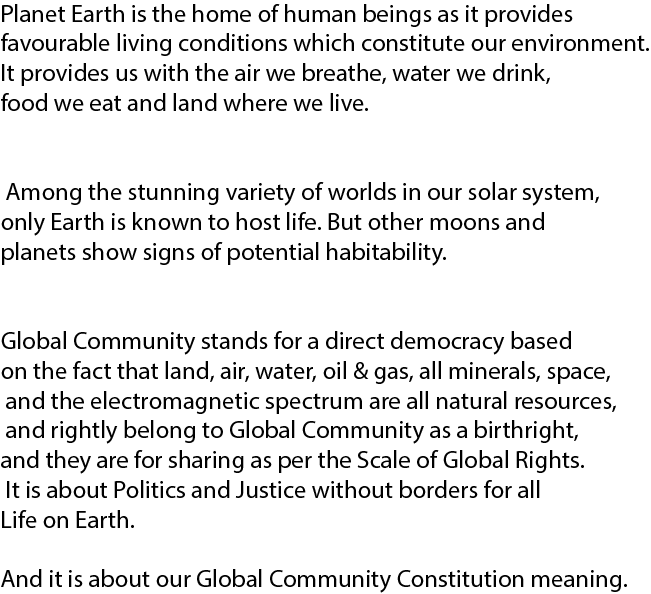
GC_3
Global Community what we stand for, a global democracy for all Peoples.GC_77
Global Civilizational State ethics for a business are about how we treat others and a commitment to respect every person humanely and with dignity. For this process to work, global citizens learn to forgive, be patient and compassionate, promote acceptance, open theirs hearts to one another, and practice a culture of solidarity and cooperation. Let go narrow differences between us all for the greater good of humanity and future generations.
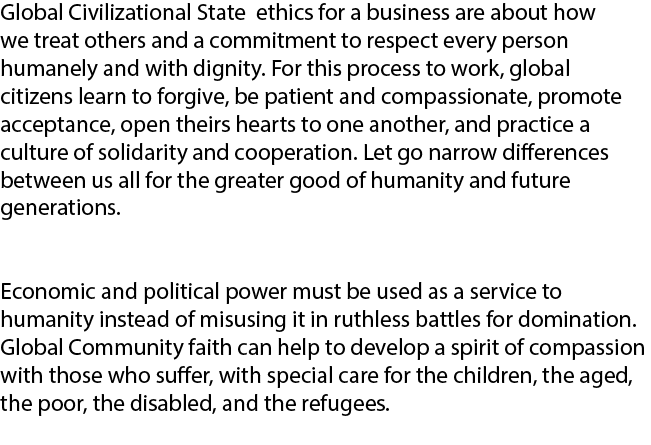
GC_4
What makes Life on planet Earth habitable for all species?
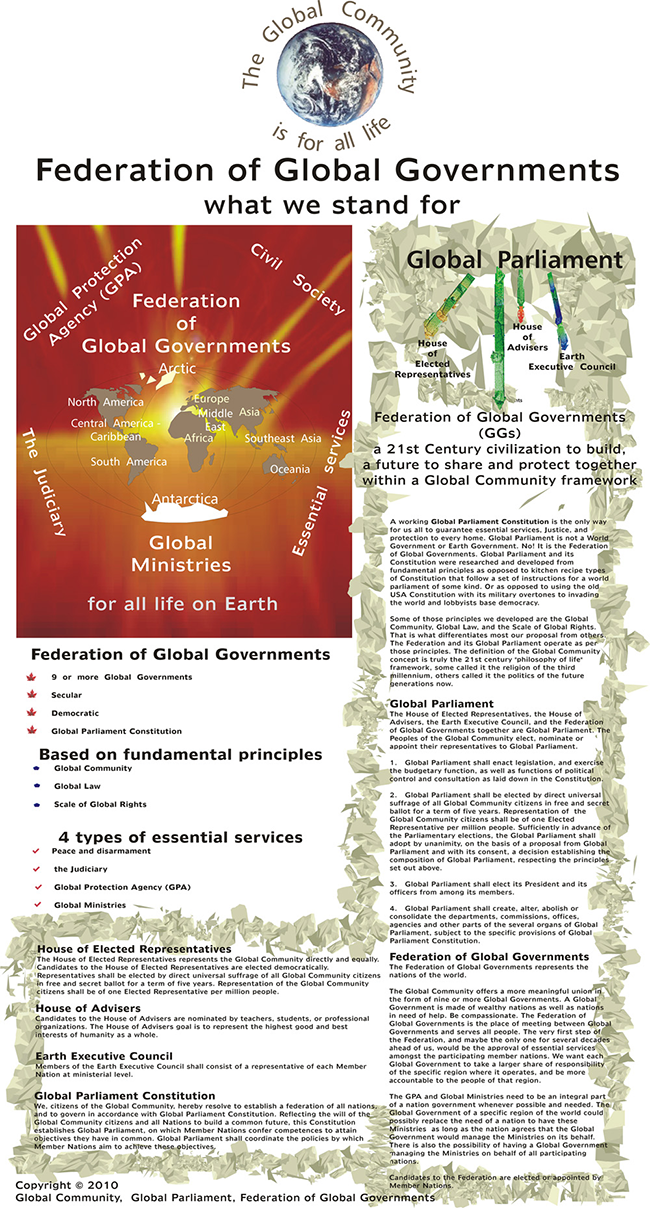
GC_78
The increased interaction among peoples which includes trade, investment, tourism, media, electronic communication, is generating a common world culture. Improvements in transportation and communications technology have indeed made it easier and cheaper to move money, goods, people, knowledge, ideas, and images around the world. By increasing trade globally is unlikely to ease international tensions or promote greater international stability. Economic interdependence fosters peace only when states expect that high trade levels will continue into the foreseeable future, otherwise war is likely to result.GC_80
Today, for life survival on our planet, a distinction must be made in the developed countries between necessary and limitless consumption, between
socially beneficial and non-beneficial uses of property, between
justified and unjustified uses of natural resources, and between
a profit-only and a socially beneficial and ecologically oriented
market economy. The lives of all lifeforms and plants on our planet deserve protection, preservation, and care. Global Community disapproves of the limitless exploitation of the natural foundations of life, the relentless destruction of the biosphere, and the militarization of the space within and above the Earth's atmosphere. Global citizens must live in harmony with nature on and above the Earth's surface.
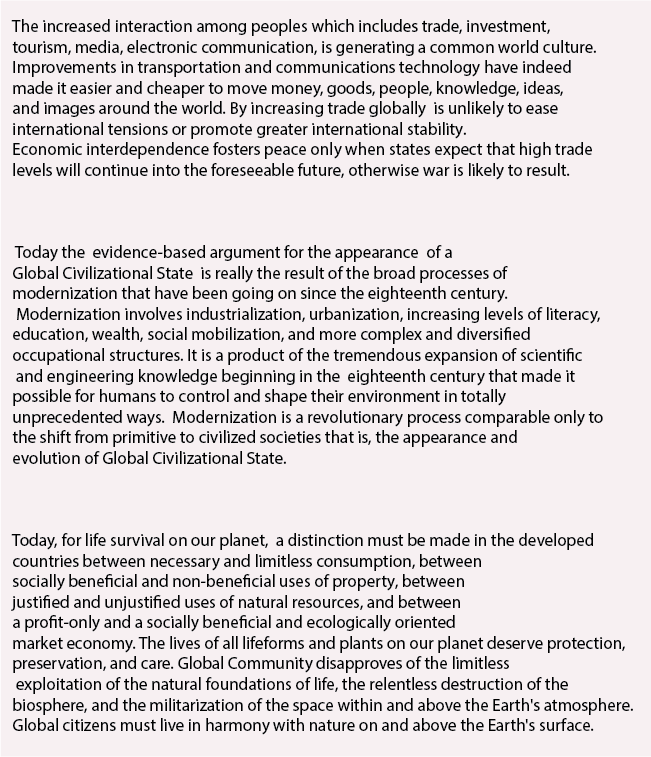
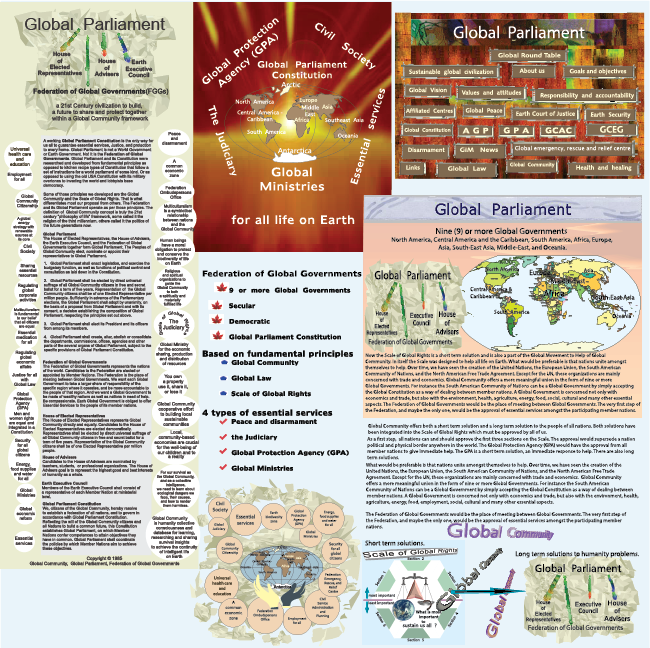
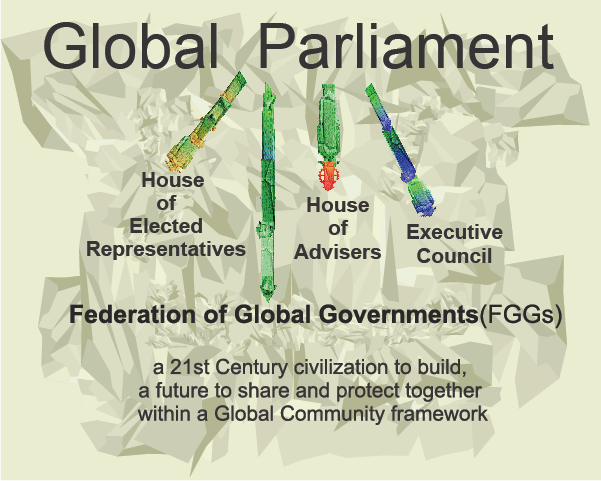


![]()
![]() .
.

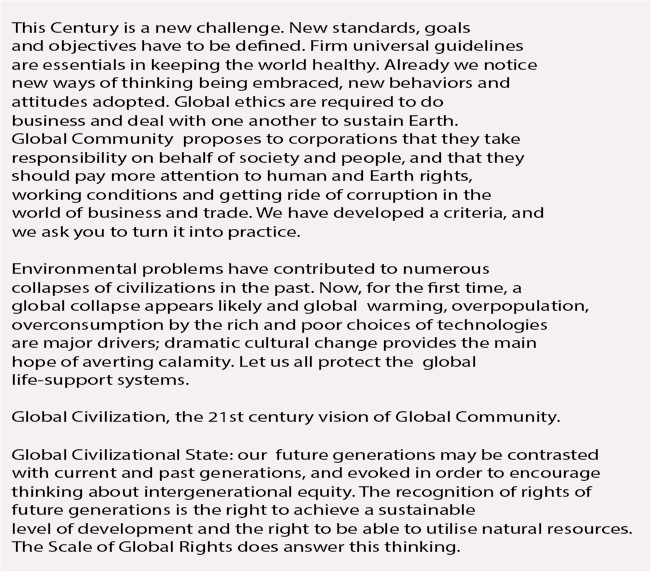
GC_33
Environmental problems have contributed to numerous collapses of civilizations in the past. Now, for the first time, a global collapse appears likely and global warming, overpopulation, overconsumption by the rich and poor choices of technologies are major drivers; dramatic cultural change provides the main hope of averting calamity. Let us all protect the global life-support systems.GC_69
Global Civilization, the 21st century vision of Global Community.GC_70
Global Civilizational State: our
future generations may be contrasted with current and past generations, and evoked in order to encourage thinking about intergenerational equity. The recognition of rights of future generations is the right to achieve a sustainable level of development and the right to be able to utilise natural resources. The Scale of Global Rights does answer this thinking.GC_73
If the term civilization is elevated to what is common to humanity as a whole then the largest cultural groupings of people would be a single Global Civilizational State, that is a variety of cultures, of peoples, of religious worlds, of historical traditions, and of historically formed attitudes.
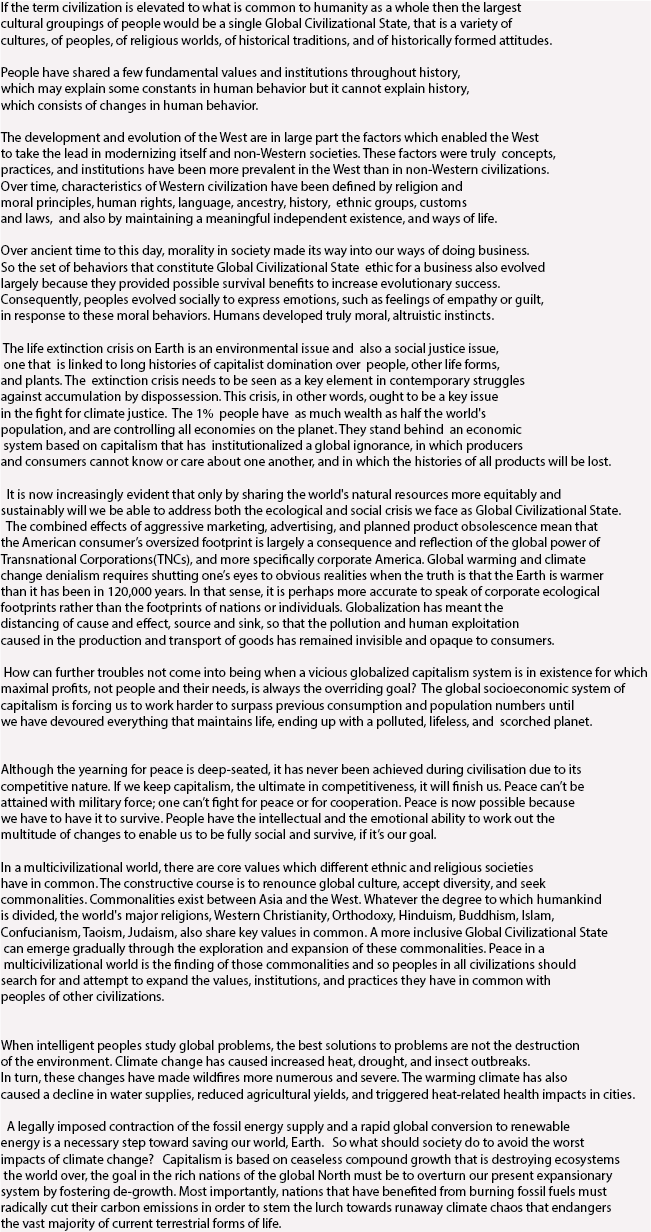
GC_84
The primary goal of the developed nations must be to overturn the present expansionary economic system based on capitalism by fostering de-growth and creating steady state societies founded on principles of equality and environmental justice. 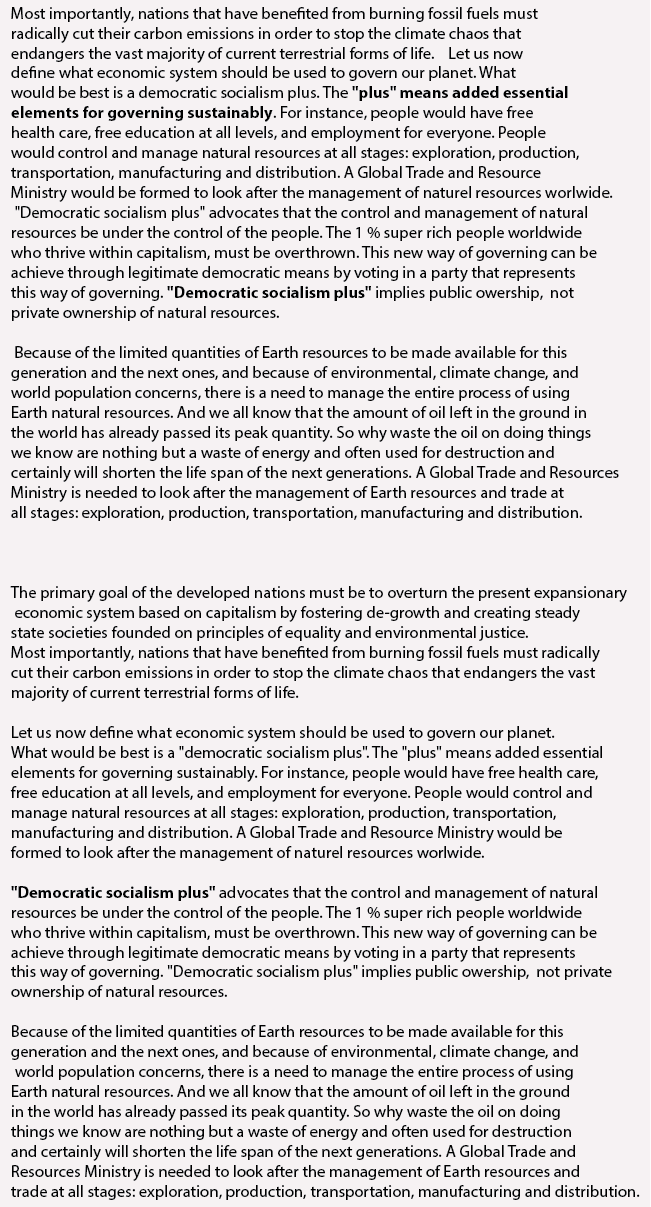
GC_85
"Democratic socialism plus" advocates that the control and management of natural resources be under the control of the people. The 1 % super rich people worldwide who thrive within capitalism, must be overthrown. This new way of governing can be achieve through legitimate democratic means by voting in a party that represents this way of governing. "Democratic socialism plus" implies public owership, not private ownership of natural resources. 
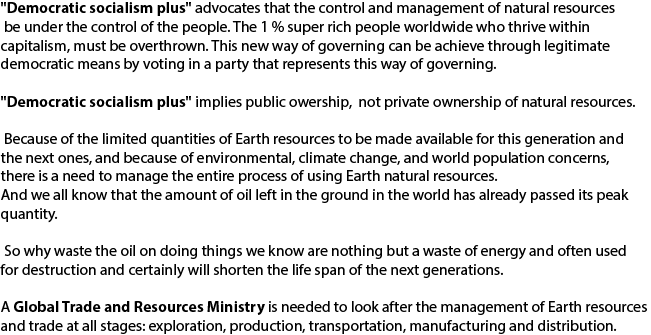
GC_84
The primary goal of the developed nations must be to overturn the present expansionary economic system based on capitalism by fostering de-growth and creating steady state societies founded on principles of equality and environmental justice. GC_85
"Democratic socialism plus" advocates that the control and management of natural resources be under the control of the people. The 1 % super rich people worldwide who thrive within capitalism, must be overthrown. This new way of governing can be achieve through legitimate democratic means by voting in a party that represents this way of governing. "Democratic socialism plus" implies public owership, not private ownership of natural resources. GC_86
The quality of Earth governance is reflected in each local community worldwide. Global Community will show leadership by creating
a global civil ethic within our ways of life. Global Constitution describes all values needed for good global governance:
mutual respect, tolerance, respect for life, justice for all everywhere, integrity, and caring. The Scale of global Rights
has become an inner truth and the benchmark of the millennium in how everyone sees all those values. 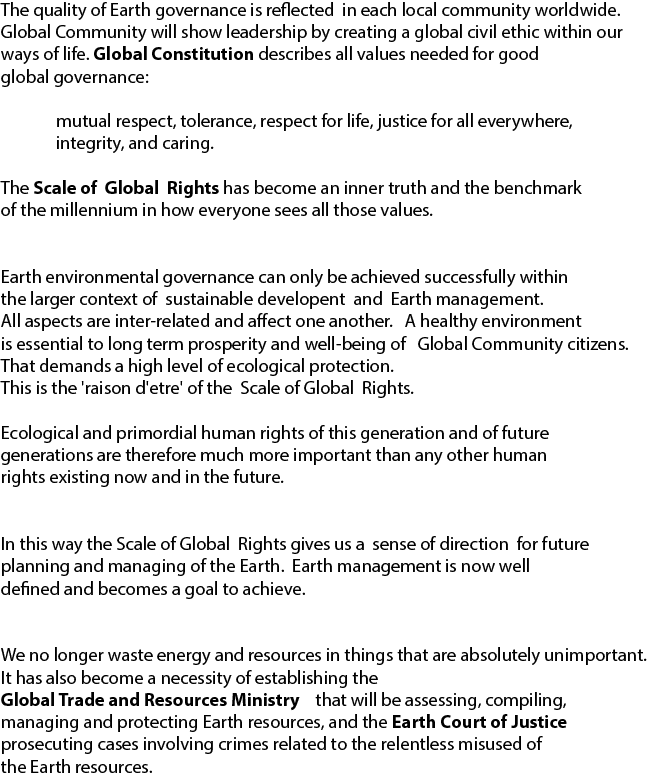
![]() by Scale of Global Rights
by Scale of Global Rights ![]() .
.
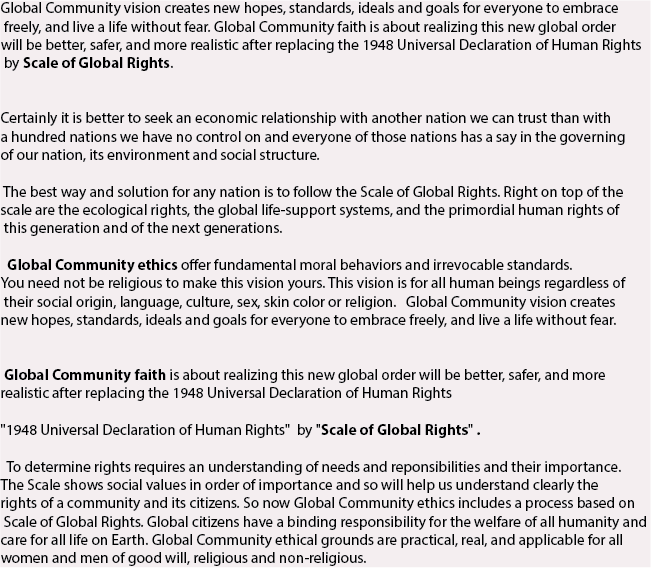
GC_91
Global Civilizational State: the application of the Scale of Global Rights to the most important global issues threatening humanity's survival worldwide.
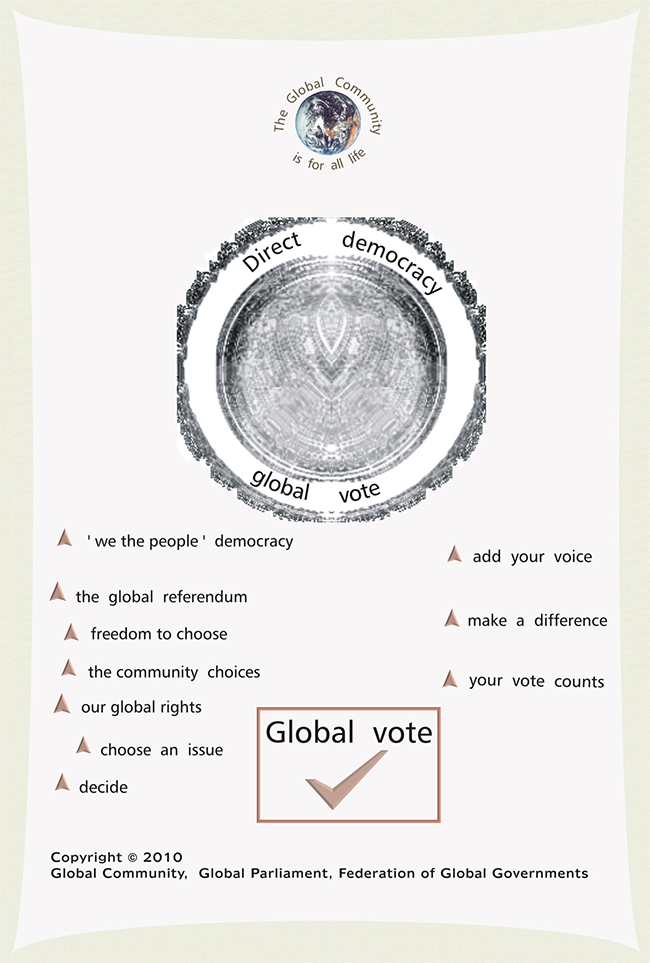
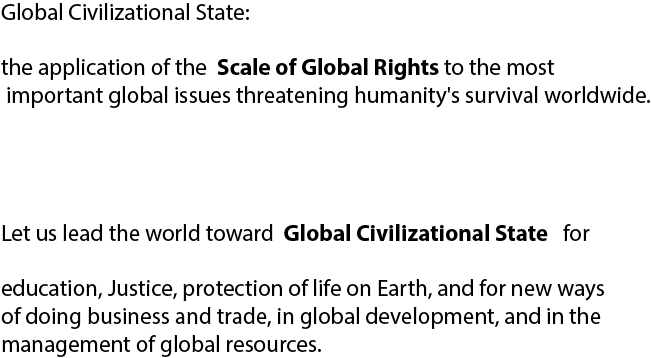
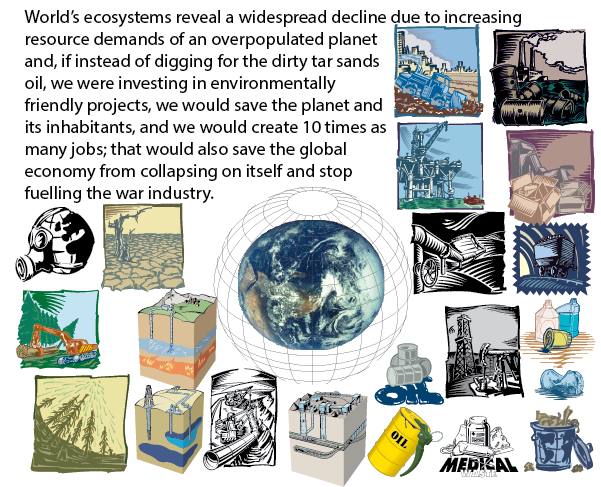

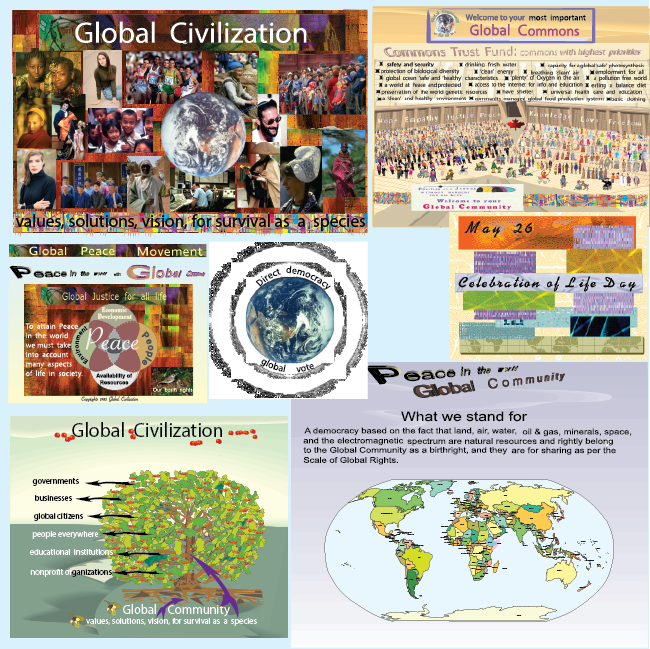

As a replacement to the United Nations, we have formed Global Parliament with 9 or more Global Governments (GGs) and an enforceable, non-military democratic Global Constitution for all. Governing bodies consist of four chambers making Global Parliament:
2. House of Advisers
3. House of Executive Council, and
4. Federation of Global Governments
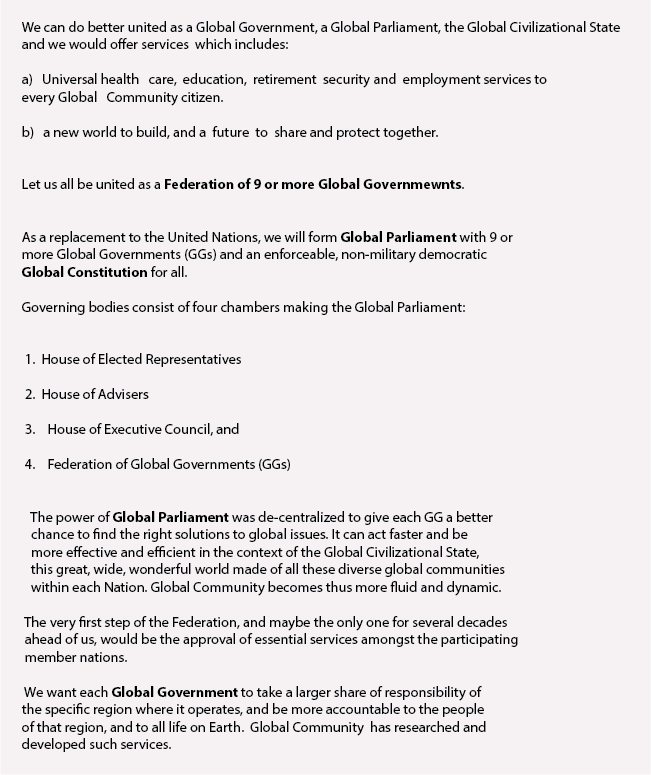
GC_93
The very first step of the Federation, and maybe the only one for several decades ahead of us, would be the approval of essential services amongst the participating member nations. We want each Global Government to take a larger share of responsibility of the specific region where it operates, and be more accountable to the people of that region,and to all life on Earth. Global Community has researched and developed such services and listed them here. All of them are already in operation on a small scale. 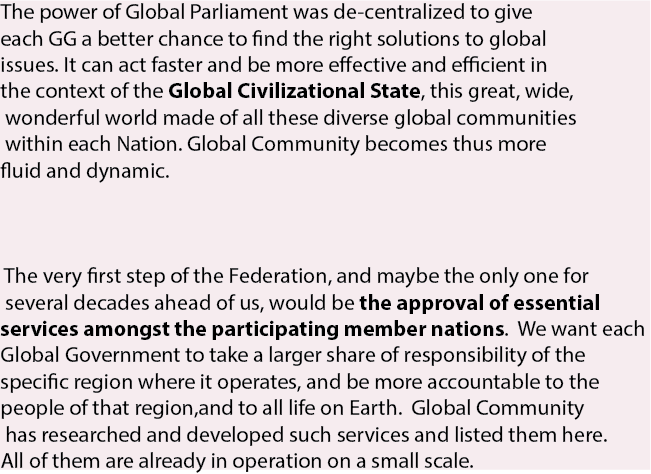
GC_94
Today's international trade agreements are obsolete and primitive. Let us first define what we mean by "Global Protection Agency (GPA)", and of course what we mean by "essential services" in the global context of humanity.
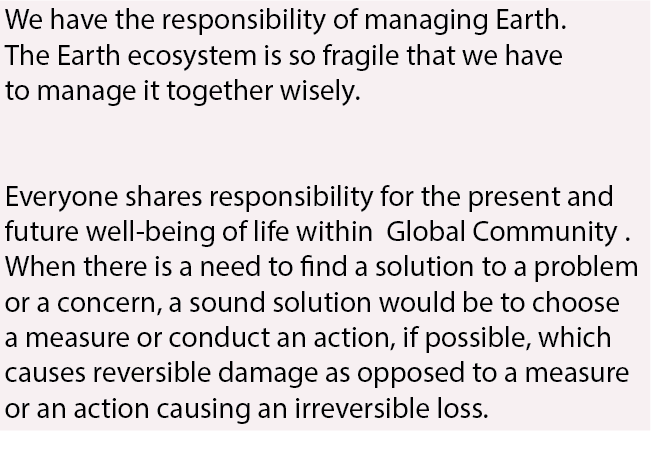
GC_95
The worst environmental degradation happens in wars. Farm products in fields and livestock are abandoned, there is no more control on toxic wastes, and water, air,and land are polluted. People are displaced and feel no longer responsible for the quality of life in their communities. Historically, the industrialized nationshave caused the most damage to the environment, with their careless technology and policies. Emissions from factories and vehicles have causedozone depletion and acid rain.
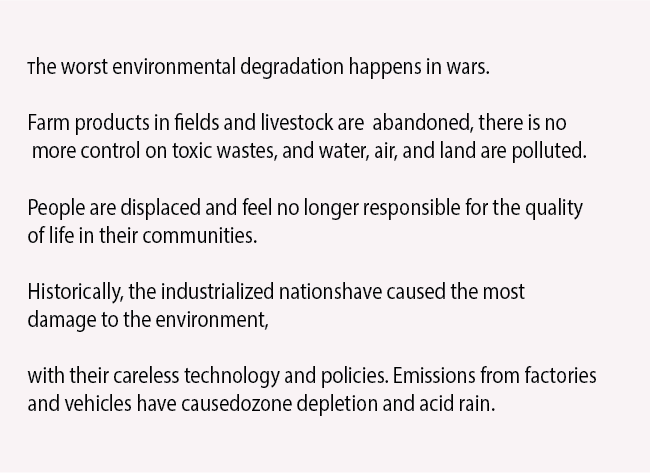
GC_96
The Scale shows social values in order of importance and so will help us understand clearly the rights of a community and its citizens. So now Global Community ethics includes a process based on Scale of Global Rights. Global citizens have a binding responsibility for the welfare of all humanity and care for all life on Earth. Global Community ethical grounds are practical, real, and applicable for all women and men of good will, religious and non-religious. GC_97
Scale of Global Rights contains six (6) sections. Section 1 has more importance than all other sections below, and so on. Concerning sections 1, 2, and 3, it shall be Global Civilization highest priority to guarantee these rights to their respective Member Nations and to have proper legislation andimplement and enforce global law as it applies and as shown in the Global Constitution. GC_97
The Scale is a balancing process to sustain all life on the planet now and future generations
Scale of Global Rights definition
![]()
![]()
![]()
![]()
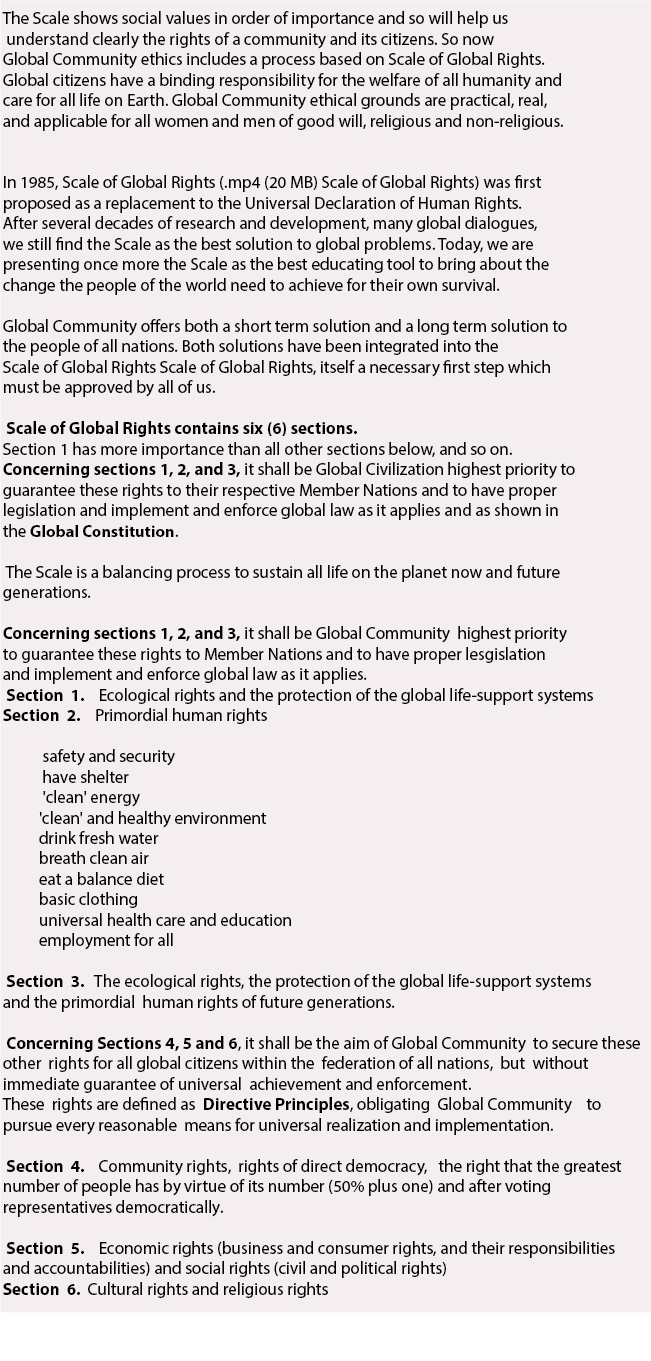
![]() The political system of an individual country does not have to be a democracy.
The political system of an individual country does not have to be a democracy. ![]()
![]()
![]()
![]()
![]()
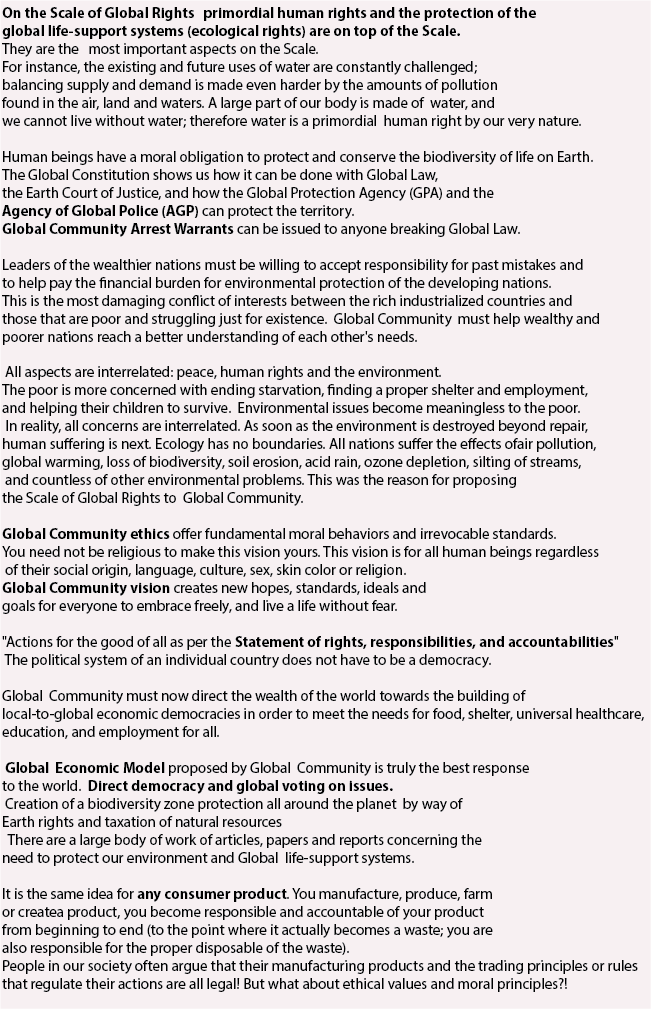
GC_99
Climate change is definitely at the top of the most global important issues facing our planet today. While this issue primarily focuses on global warming, changes in precipitation, air quality, biodiversity, “habitable” zones and many other areas are part of and affected by climate change. However, it is extreme global climate change that would result in epic disruption if not outright decimation of the human species and most life as we know it today. We have already seen the death and destruction wreaked by monster typhoons and hurricanes, unexpected volcanic activity, monsoons, extreme heat and extreme cold systems.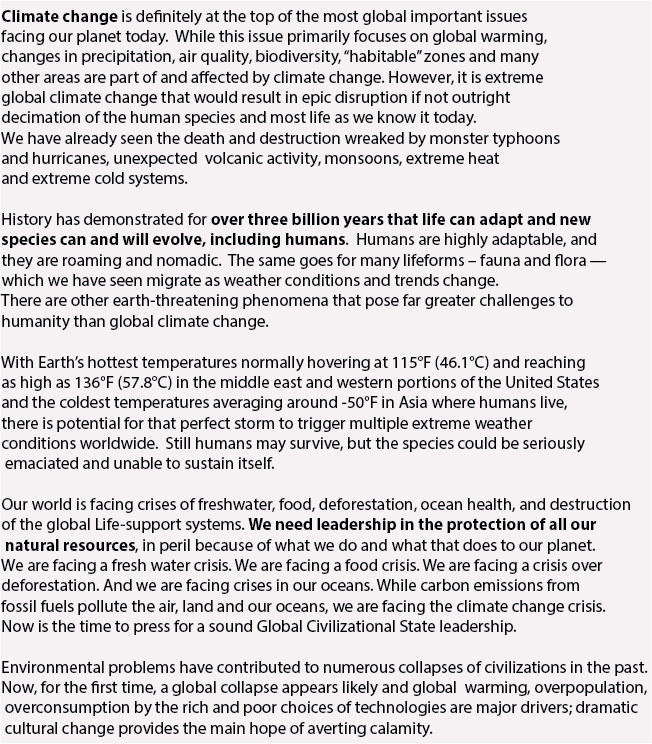
GC_100
In consequence of globalization, the new economic and political distribution of power around the world has become very different then we were used to. It has become very fluid, in perpetual motion and affected by global markets. Giant new markets are forming all over the world. Competition is hardening. National economies can no longer insure or guarantee rights of possession on any property. National borders no longer mean protection, security, cultural boundaries, resources ownership, political and economic control.
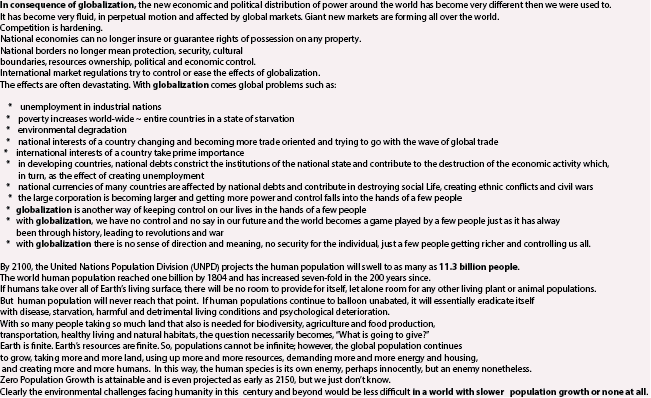
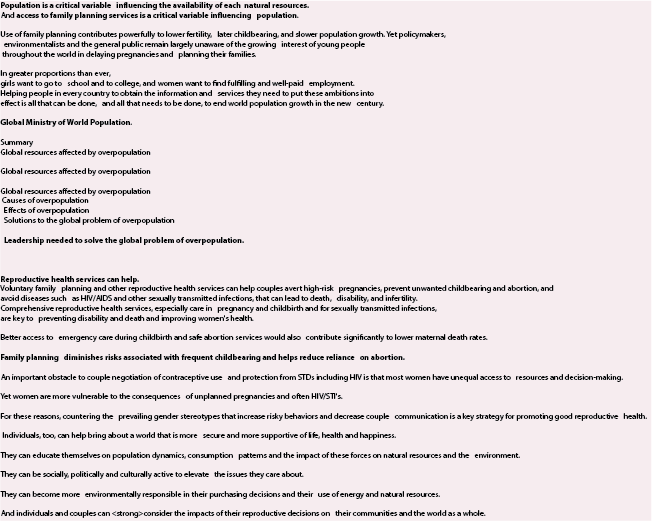
GC_101
Global Community is declaring a moratorium on immigration all over the world, on all applications for immigration, until applicants from any religious or cultural background have satisfied completely Global Community standard for a population fertility rate of 1.3 children per family. The problem with world overpopulation is everybody’s problem. We are all responsible. Until tangible progress is made no immigrants should be accepted. That is Global Law. GC_17
Building Global Communities for all Life and plants.
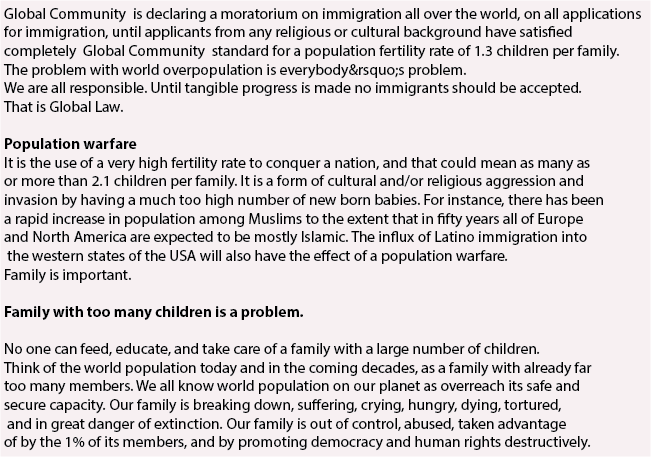
GC_19
Effective Earth governance requires a greater understanding of what it means to live in a more crowded, interdependent humanity with finite resources and more pollution threatening the global life-support systems.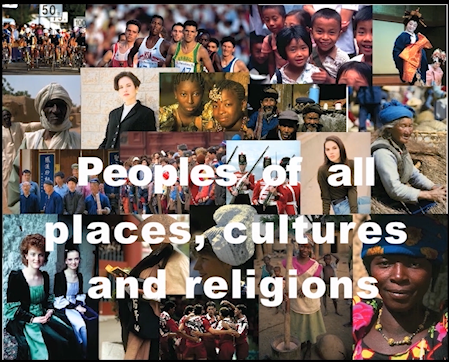
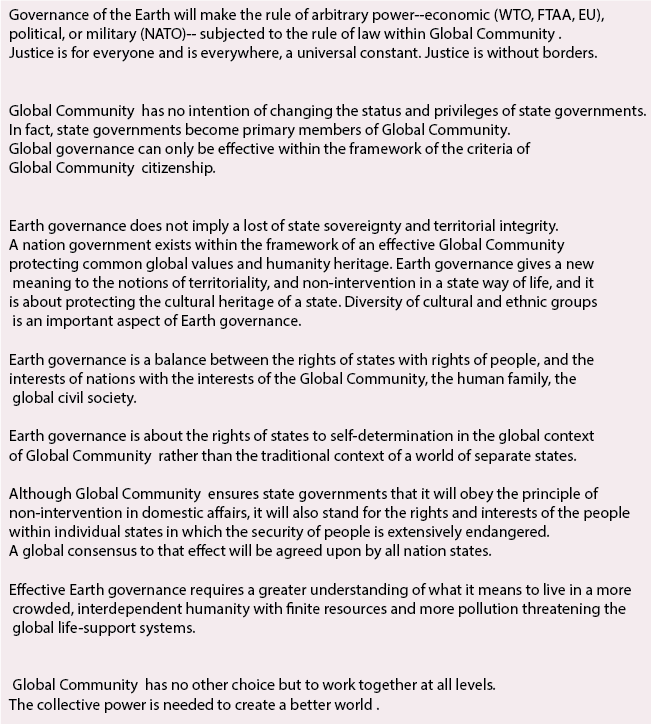
GC_20
All civilizations have certain characteristics. These include: large population centers; monumental architecture and unique art styles; shared communication strategies; systems for administering territories; a complex division of labor; and the division of people into social and economic classes.
GC_21
All world civilizations have values, solutions to handle issues, and a vision for survival as a species.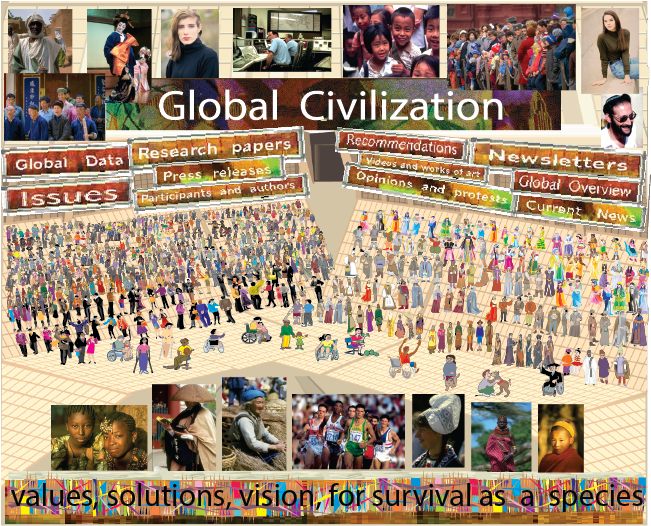
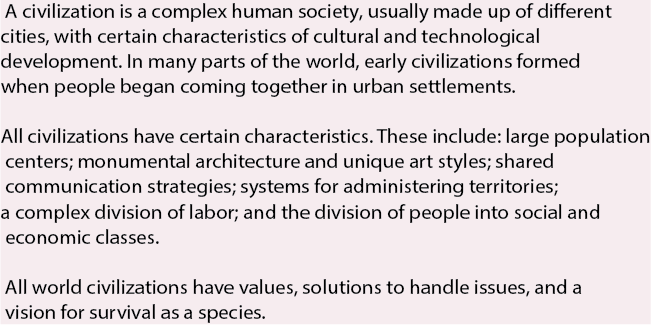
GC_22
The United Nations is an international organization founded in 1945 and committed to maintaining international peace and security; developing friendly relations among nations; promoting social progress, better living standards and human rights.
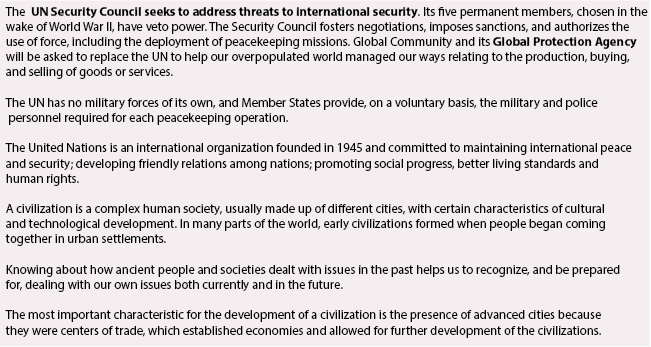
GC_23
The most important characteristic for the development of a Global Civilizational Community, or Multicivilizational Community, is the presence of advanced cities because they were centers of international trade, which established world economies and allowed for further development of the global civilizations, and established Global Peace and the Protection of the Global Life Support-systems.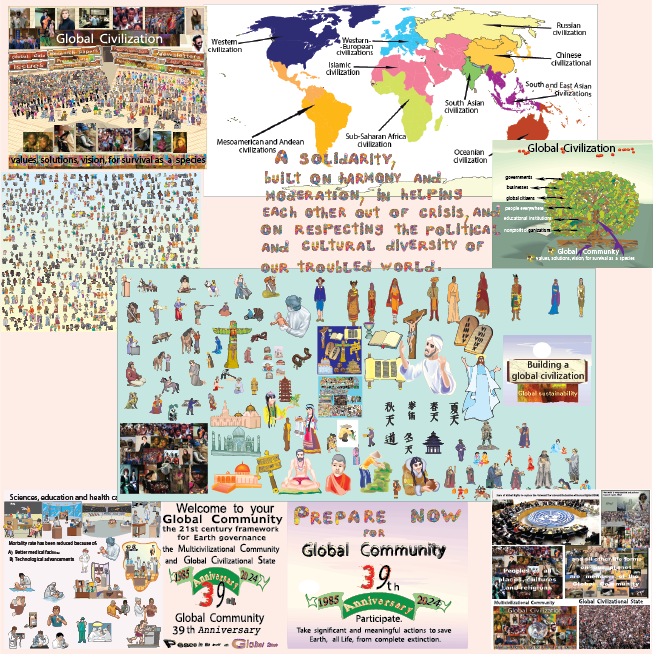
GC_24
Global Community Direct Democracy for all Life and plants.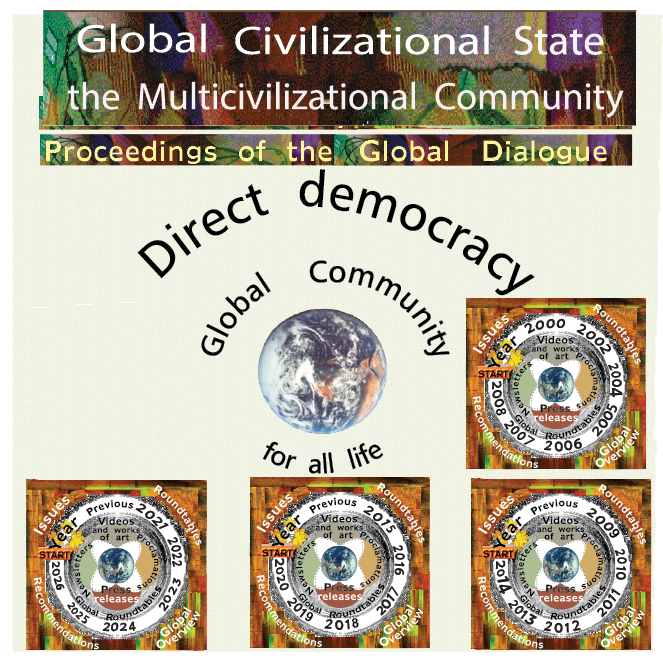
GC_25
Global Civilizational State for free education and training back to the people to guide the next generations toward a successful life, a prosperous future, and a healthy planet, Earth.
GC_26
Global Community Proceedings of the Global Dialogue.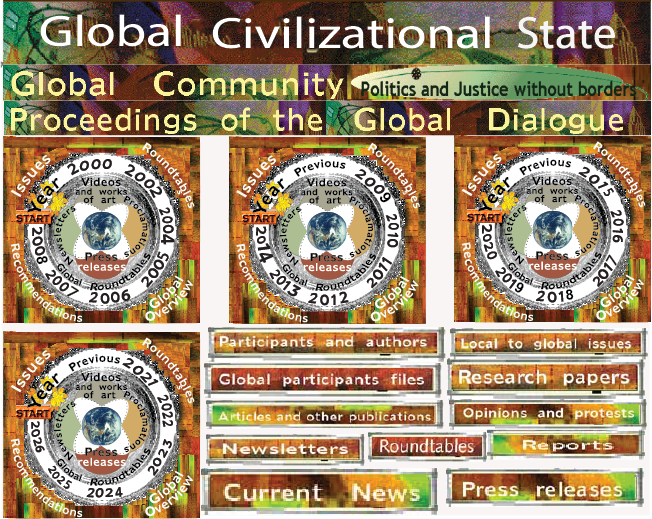

GC_27
Global Parliament values and principles.
GC_28
Global Parliament's Constitution, Global Ministries, and essential services.

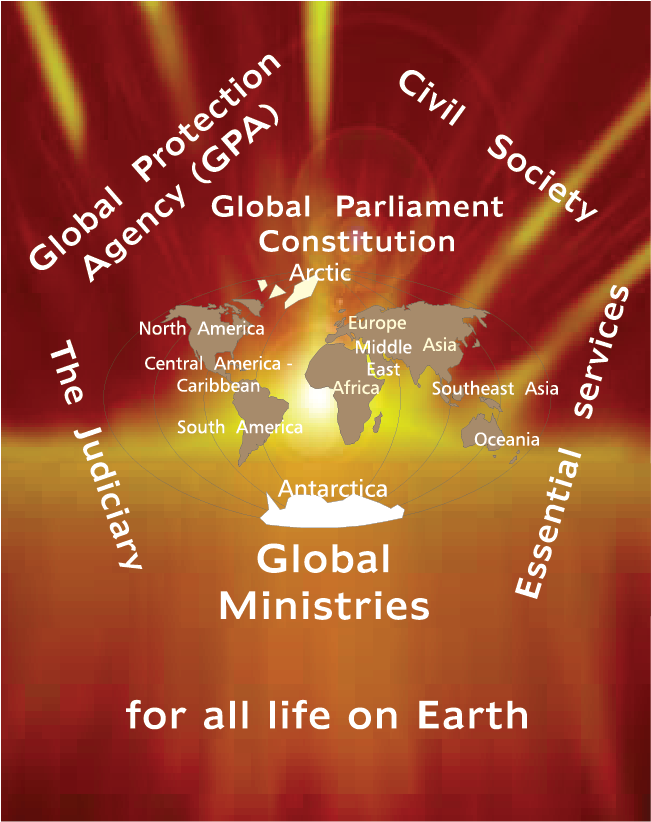
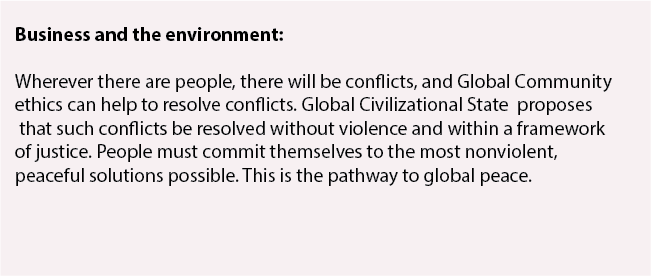
GC_31
Business and the environment:
Wherever there are people, there will be conflicts, and Global Community ethics can help to resolve conflicts. Global Civilizational State proposes that such conflicts be resolved without violence and within a framework of justice. People must commit themselves to the most nonviolent, peaceful solutions possible. This is the pathway to global peace.


GC_32
Global Civilization issues today.
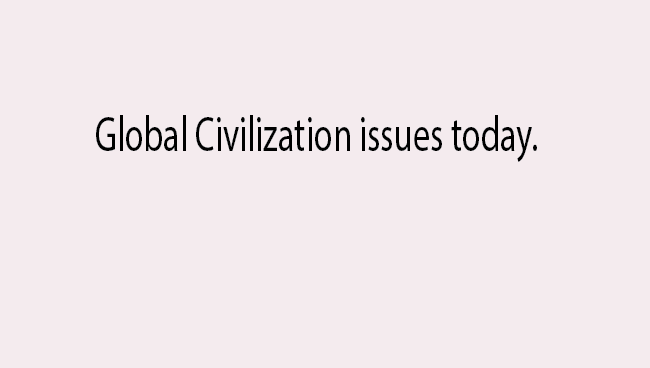

GC_33
Environmental problems have contributed to numerous collapses of civilizations in the past. Now, for the first time, a global collapse appears likely and global warming, overpopulation, overconsumption by the rich and poor choices of technologies are major drivers; dramatic cultural change provides the main hope of averting calamity. Let us all protect the global life-support systems.

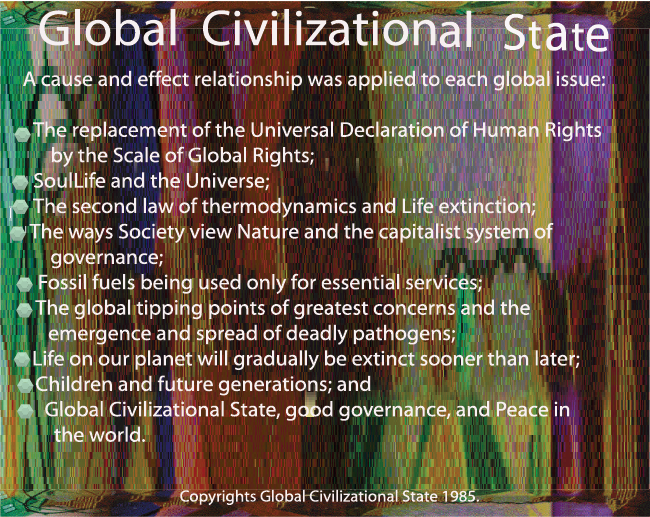
GC_34
Global Civilizational State: let us all research a cause and effect relationship between each important global issue. Let us all protect world's ecosystems which reveal a widespread decline due to increasing resource demands of an overpopulated planet.
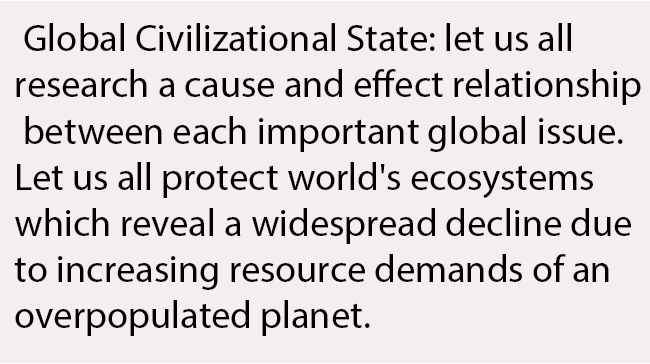

GC_35
Obtaining your Certified Corporate Global Community Citizenship (CCGCC) will help you to show the world your ways of doing business are best for Global Community. Governments should encourage enterprises to use the criteria both by legal and moral means. At first, the criteria should be adopted in key areas such as procurement, facilities management, investment management, and human resources. Corporations want to be seen as good corporate leaders and have a stronger form of accountability. Business and trade will prosper after stronger common bonds and values have been established. Adopting the criteria will have a beneficial impact on future returns, and share price performance.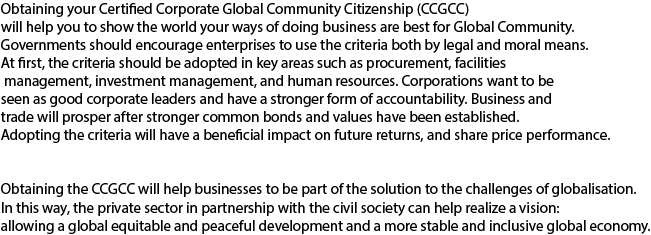

GC_36
Observables provide support to Global Warming. Tipping points occur when global heating pushes temperatures beyond a critical threshold,leading to accelerated and irreversible impacts.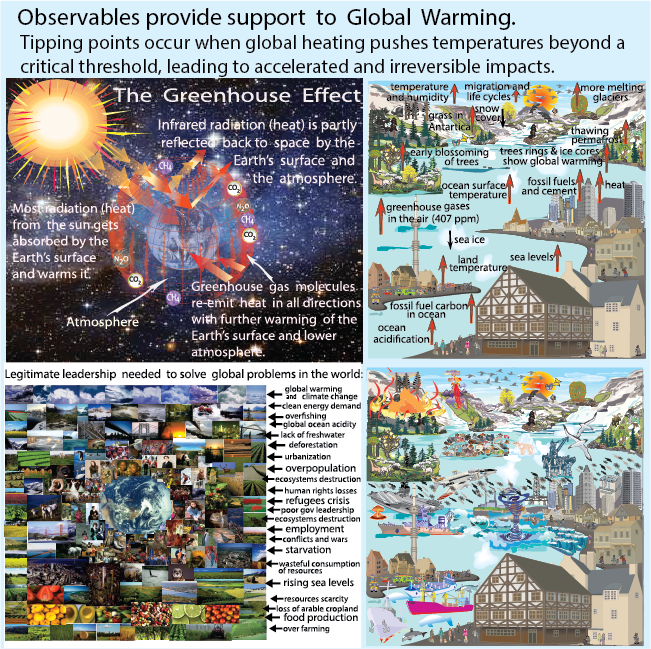
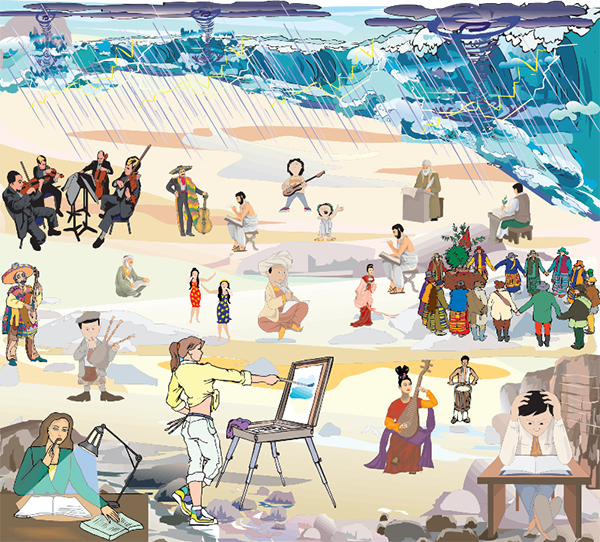
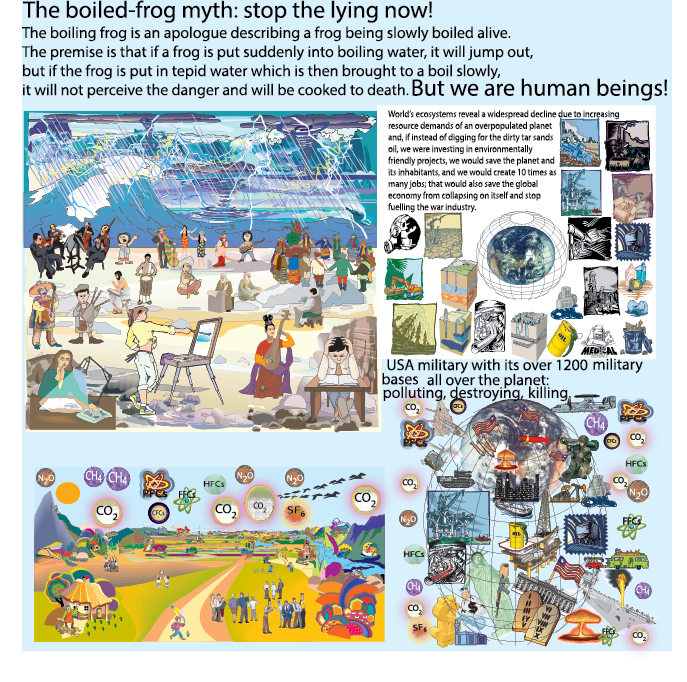
GC_37
The require careful handling of global tipping points of greatest concerns and the emergence and spread of deadly pathogens. The establishment of truly needed global environmental and ecological institutions designed to manage and protect the environment, and for protecting species at risk of extinction. 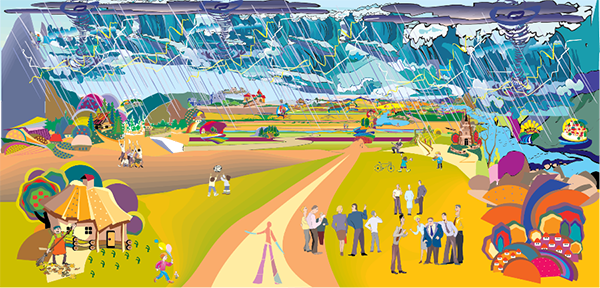
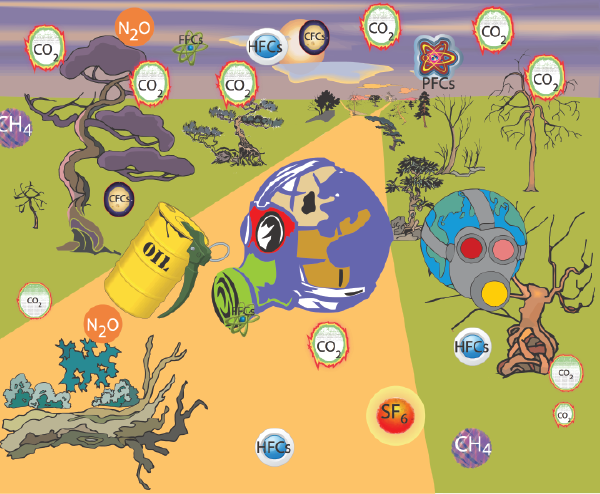
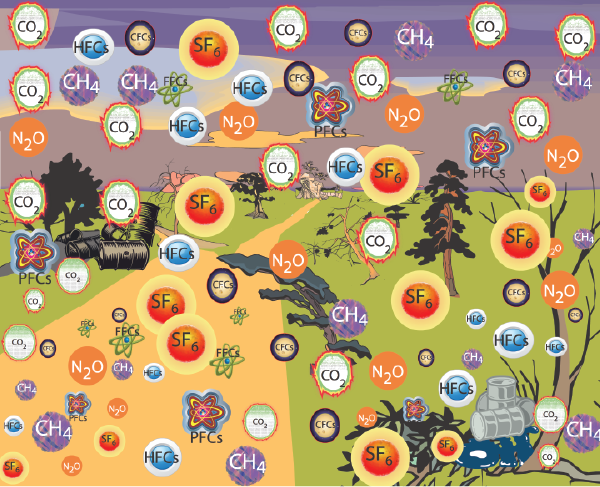
GC_38
Our world is facing crises of freshwater, food, deforestation, ocean health, and destruction of the global Life-support systems. We need leadership in the protection of all our natural resources, in peril because of what we do and what that does to our planet. We are facing a fresh water crisis. We are facing a food crisis. We are facing a crisis over deforestation. And we are facing crises in our oceans. While carbon emissions from fossil fuels pollute the air, land and our oceans, we are facing the climate change crisis. Now is the time to press for a sound Global Civilizational State leadership. 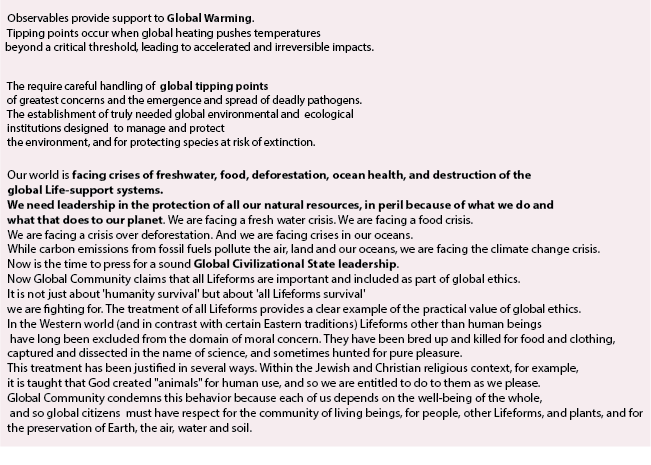
![]()
![]()
![]()
![]()
![]()
![]()
![]()
![]()
![]()
![]()
![]()
![]()
![]()
![]()
![]()
![]()
![]()
![]()
![]()
![]()
![]()
![]()
![]()
![]()
![]()
![]()
![]()
![]()
![]()
![]()
![]()
![]()
![]()
![]()
![]()
![]()
![]()
![]()
![]()
![]()
![]()
![]()
![]()
![]()
![]()
![]()
![]()
![]()
![]()
![]()
![]()
![]()
![]()
![]()
![]()
![]()
![]()
![]()
![]()
![]()
![]()
![]()
![]()
![]()
![]()
![]()
![]()
![]()
![]()
![]()
![]()
![]()
![]()
![]()
![]()
![]()
![]()
![]()
![]()
![]()
![]()
![]()
![]()
![]()
![]()
![]()
![]()
![]()
![]()
![]()
![]()
![]()
![]()
![]()
![]()
![]()
![]()
![]()
![]()
![]()
![]()
![]()


Electronic mail
germaindufour4@gmail.com
Website: http://globalcommunitywebnet.com/
Webmaster: gdufour@globalcommunitywebnet.com
Copyright 2023: © Global Community, Global Parliament, Federation of Global Governments,
Global Civilizational State
![]()
![]() .
.




